Argumentative Essay Writing
Argumentative Essay Examples


Best Argumentative Essay Examples for Your Help
Published on: Mar 10, 2023
Last updated on: Jan 30, 2024

People also read
Argumentative Essay - A Complete Writing Guide
Learn How to Write an Argumentative Essay Outline
Basic Types of Argument and How to Use Them?
Take Your Pick – 200+ Argumentative Essay Topics
Essential Tips and Examples for Writing an Engaging Argumentative Essay about Abortion
Crafting a Winning Argumentative Essay on Social Media
Craft a Winning Argumentative Essay about Mental Health
Strategies for Writing a Winning Argumentative Essay about Technology
Crafting an Unbeatable Argumentative Essay About Gun Control
Win the Debate - Writing An Effective Argumentative Essay About Sports
Make Your Case: A Guide to Writing an Argumentative Essay on Climate Change
Ready, Set, Argue: Craft a Convincing Argumentative Essay About Wearing Mask
Crafting a Powerful Argumentative Essay about Global Warming: A Step-by-Step Guide
Share this article
Argumentative essays are one of the most common types of essay writing. Students are assigned to write such essays very frequently.
Despite being assigned so frequently, students still find it hard to write a good argumentative essay .
There are certain things that one needs to follow to write a good argumentative essay. The first thing is to choose an effective and interesting topic. Use all possible sources to dig out the best topic.
Afterward, the student should choose the model that they would follow to write this type of essay. Follow the steps of the chosen model and start writing the essay.
The models for writing an argumentative essay are the classical model, the Rogerian model, and the Toulmin model.
To make sure that you write a good argumentative essay, read the different types of examples mentioned in this blog.
On This Page On This Page -->
Good Argumentative Essay Examples
Argumentative essays are an inevitable part of academic life. To write a good argumentative essay, you need to see a few good examples of this type of essay.
To analyze whether the example is good to take help from or not. You need to look for a few things in it.
Make sure it follows one specific model and has an introductory paragraph, organized body paragraphs, and a formal conclusion.

Get More Examples From Our AI Essay Writer
How to Start an Argumentative Essay Example
Learning how to start an argumentative essay example is a tricky thing for beginners. It is quite simple but can be challenging for newbies. To start an argumentative essay example, you need to write a brief and attractive introduction. It is written to convince the reader and make them understand your point of view .
Add body paragraphs after the introduction to support your thesis statement. Also, use body paragraphs to highlight the strengths and weaknesses of your side of the argument.
Write a formal conclusion for your essay and summarize all the key elements of your essay. Look at the example mentioned below to understand the concept more clearly.
Check out this video for more information!
Argumentative Essay Example (PDF)
Argumentative Essay Example
Argumentative essays are assigned to university students more often than the students of schools and colleges.
It involves arguments over vast and sometimes bold topics as well.
For university students, usually, argumentative essay topics are not provided. They are required to search for the topic themselves and write accordingly.
The following examples will give an idea of how university students write argumentative essays.
Argumentative Essay Example for University (PDF)
Argumentative Essay Examples for College
For the college level, it is recommended to use simple language and avoid the use of complex words in essays.
Make sure that using simple language and valid evidence, you support your claim well and make it as convincing as possible
If you are a college student and want to write an argumentative essay, read the examples provided below. Focus on the formatting and the vocabulary used.
Argumentative Essay Example for College (PDF)
College Argumentative Essay Sample (PDF)
Argumentative Essay Examples for Middle School
Being a middle school student, you must be wondering how we write an argumentative essay. And how can you support your argument?
Go through the following examples and hopefully, you will be able to write an effective argumentative essay very easily.
Argumentative Essay Example for Middle School(PDF)
Middle School Argumentative Essay Sample (PDF)
Argumentative Essay Examples for High School
High school students are not very aware of all the skills that are needed to write research papers and essays.
Especially, when it comes to argumentative essays, it becomes quite a challenge for high schools to defend their argument
In this scenario, the best option is to look into some good examples. Here we have summed up two best examples of argumentative essays for high school students specifically.
Argumentative Essay Example for High School (PDF)
High School Argumentative Essay Sample (PDF)
Argumentative Essay Examples for O Level
The course outline for O levels is quite tough. O levels students need to have a good command of the English language and amazing writing skills.
If you are an O-level student, the following examples will guide you on how to write an argumentative essay.
Argumentative Essay Example for O Level (PDF)
Argumentative Essay for O Level Students (PDF)
5-Paragraph Argumentative Essay Examples
A 5-paragraph essay is basically a formatting style for essay writing. It has the following five parts:
- Introduction
In the introduction, the writer introduces the topic and provides a glance at the collected data to support the main argument.
- Body paragraph 1
The first body paragraph discusses the first and most important point related to the argument. It starts with a topic sentence and has all the factual data to make the argument convincing.
- Body paragraph 2
The second body paragraph mentions the second most important element of the argument. A topic sentence is used to start these paragraphs. It gives the idea of the point that will discuss in the following paragraph.
- Body paragraph 3
The third paragraph discusses all the miscellaneous points. Also, it uses a transitional sentence at the end to show a relation to the conclusion.
The conclusion of a five-paragraph essay reiterates all the major elements of an argumentative essay. It also restates the thesis statement using a more convincing choice of words.
Look at the example below to see how a well-written five-paragraph essay looks like
5 Paragraph Argumentative Essay Example (PDF)
Argumentative Essay Examples for 6th Grade
Students in 6th grade are at a point where they are learning new things every day.
Writing an argumentative essay is an interesting activity for them as they like to convince people of their point of view.
Argumentative essays written at such levels are very simple but well convincing.
The following example will give you more detail on how a 6th-grade student should write an argumentative essay.
6th Grade Argumentative Essay Example (PDF)
Argumentative Essay Examples for 7th Grade
There is not much difference between a 6th-grade and a 7th-grade student. Both of them are enhancing their writing and academic skills.
Here is another example to help you with writing an effective argumentative essay.
7th Grade Argumentative Essay Example (PDF)
Tough Essay Due? Hire a Writer!

Short Argumentative Essay Examples
For an argumentative essay, there is no specific limit for the word count. It only has to convince the readers and pass on the knowledge of the writer to the intended audience.
It can be short or detailed. It would be considered valid as far as it has an argument involved in it.
Following is an example of a short argumentative essay example
Short Argumentative Essay Example (PDF)
Immigration Argumentative Essay Examples
Immigration is a hot topic for a very long time now. People have different opinions regarding this issue.
Where there is more than one opinion, an argumentative essay can be written on that topic. The following are examples of argumentative essays on immigration.
Read them and try to understand how an effective argumentative essay is written on such a topic.
Argumentative Essay Example on Immigration (PDF)
Argumentative Essay Sample on Immigration (PDF)
Writing essays is usually a tiring and time-consuming assignment to do. Students already have a bunch of assignments for other subjects to complete. In this situation, asking for help from professional writers is the best choice.
If you are still in need of assistance, our essay writer AI can help you create a compelling essay that presents your argument clearly and effectively.
With our argumentative essay writing service, you will enjoy perks like expert guidance, unlimited revisions, and helpful customer support. Let our essay writer help you make an impact with your essay on global warming today!
Place your order with our college essay writing service today!
Frequently Asked Questions
What are the 7 types of arguments.
The seven types of arguments are as follows:
- Statistical
What is the structure of an argument?
The structure of an argument consists of a main point (thesis statement) that is supported by evidence.
This evidence can include facts, statistics, examples, and other forms of data that help to prove or disprove the thesis statement.
After providing the evidence, arguments also often include a conclusion that summarizes the main points made throughout the argument.
Cathy A. (Literature, Marketing)
For more than five years now, Cathy has been one of our most hardworking authors on the platform. With a Masters degree in mass communication, she knows the ins and outs of professional writing. Clients often leave her glowing reviews for being an amazing writer who takes her work very seriously.
Paper Due? Why Suffer? That’s our Job!

Keep reading

Legal & Policies
- Privacy Policy
- Cookies Policy
- Terms of Use
- Refunds & Cancellations
- Our Writers
- Success Stories
- Our Guarantees
- Affiliate Program
- Referral Program
- AI Essay Writer
Disclaimer: All client orders are completed by our team of highly qualified human writers. The essays and papers provided by us are not to be used for submission but rather as learning models only.
Argumentative Essay – Outline, Form, and Examples
What is an argumentative essay.
An argumentative essay requires the writer to investigate a specific topic by collecting and evaluating evidence to establish a position on the subject matter.
When preparing to compose a good argumentative essay, utilize the following steps:
Step 1: Select a topic.
Step 2: Identify a position.
Step 3: Locate appropriate resources.
Step 4: Identify evidence supporting the position. ( NOTE: If there is little evidence in support of the claim, consider re-examining the main argument.)

When gathering evidence, use credible sources . To determine the credibility of the source, consider authority, currency, accuracy, and objectivity:
Who is the author ? Are they an expert in the field? Has a reputable publisher published the work?
How current is the information in the source? Does the currency of the source matter? Does the age of the source impact the content? Is there newer information that disproves the source’s information?
Can other sources verify the accuracy of the information? Does the information contradict that found in other commonly accepted sources?
Is there any evidence of bias, or is the source objective ? Is the research sponsored by an organization that may skew the information?
The following are typically recognized as providing appropriate, credible research material:
Peer-reviewed journals/research papers
Government agencies
Professional organizations
Library databases
Reference books
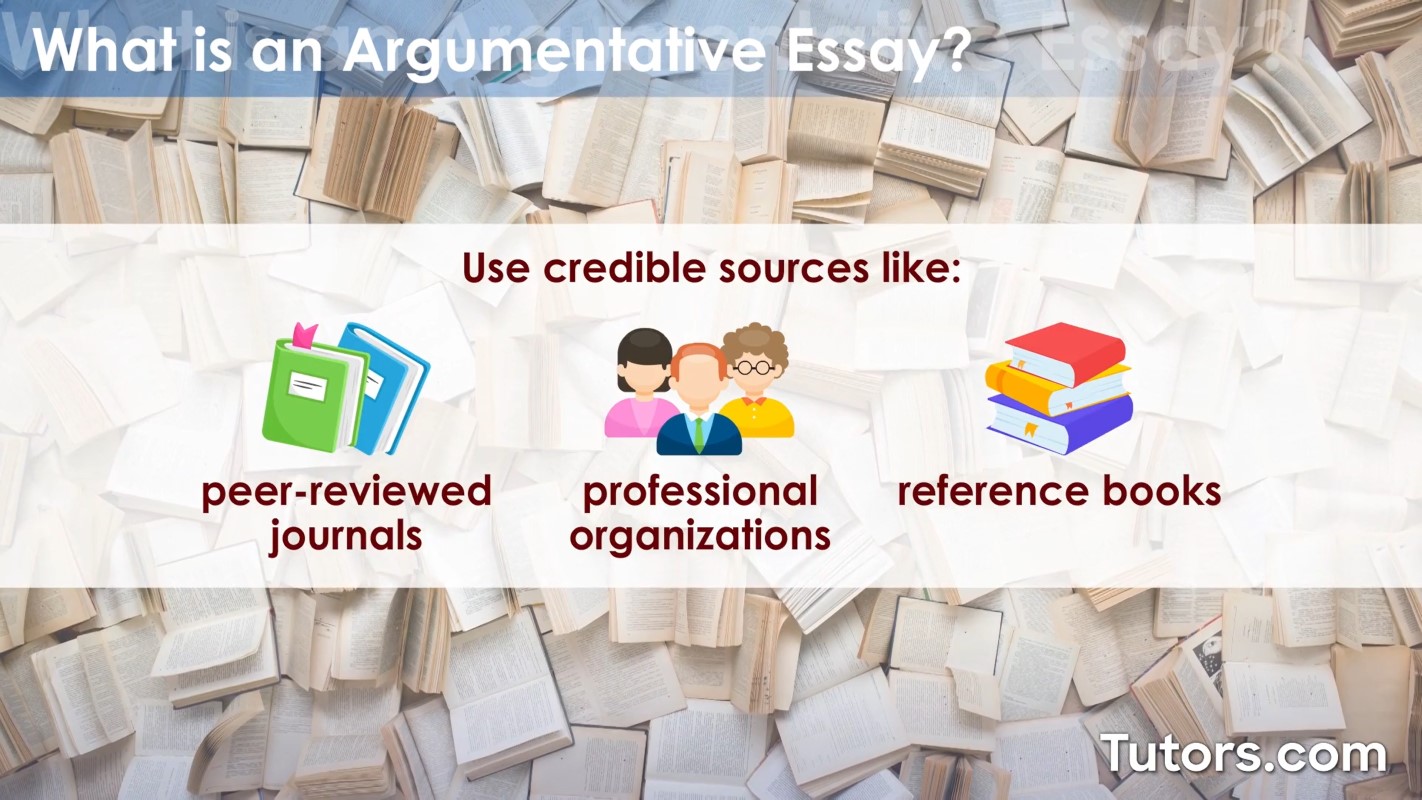
Writers should avoid using the following sources:
Social media posts
Out-of-date materials
Step 5: Utilize the research to determine a thesis statement that identifies the topic, position, and support(s).
Step 6: Use the evidence to construct an outline, detailing the main supports and relevant evidence.

Argumentative essay outline
After gathering all of the necessary research, the next step in composing an argumentative essay focuses on organizing the information through the use of an outline:
Introduction
Attention Grabber/Hook
Background Information: Include any background information pertinent to the topic that the reader needs to know to understand the argument.
Thesis: State the position in connection to the main topic and identify the supports that will help prove the argument.
Topic sentence
Identify evidence in support of the claim in the topic sentence
Explain how the evidence supports the argument
Evidence 3 (Continue as needed)
Support 2 (Continue as needed)
Restate thesis
Review main supports
Concluding statement
Invite the audience to take a specific action.
Identify the overall importance of the topic and position.

How to write an argumentative essay
Regardless of the writer’s topic or point of view, an argumentative essay should include an introductory paragraph, body paragraphs, a conclusion, and works cited.
Background information
Body Paragraphs
Analysis of evidence
Rephrased thesis
Review of main ideas
Call to action
Works Cited
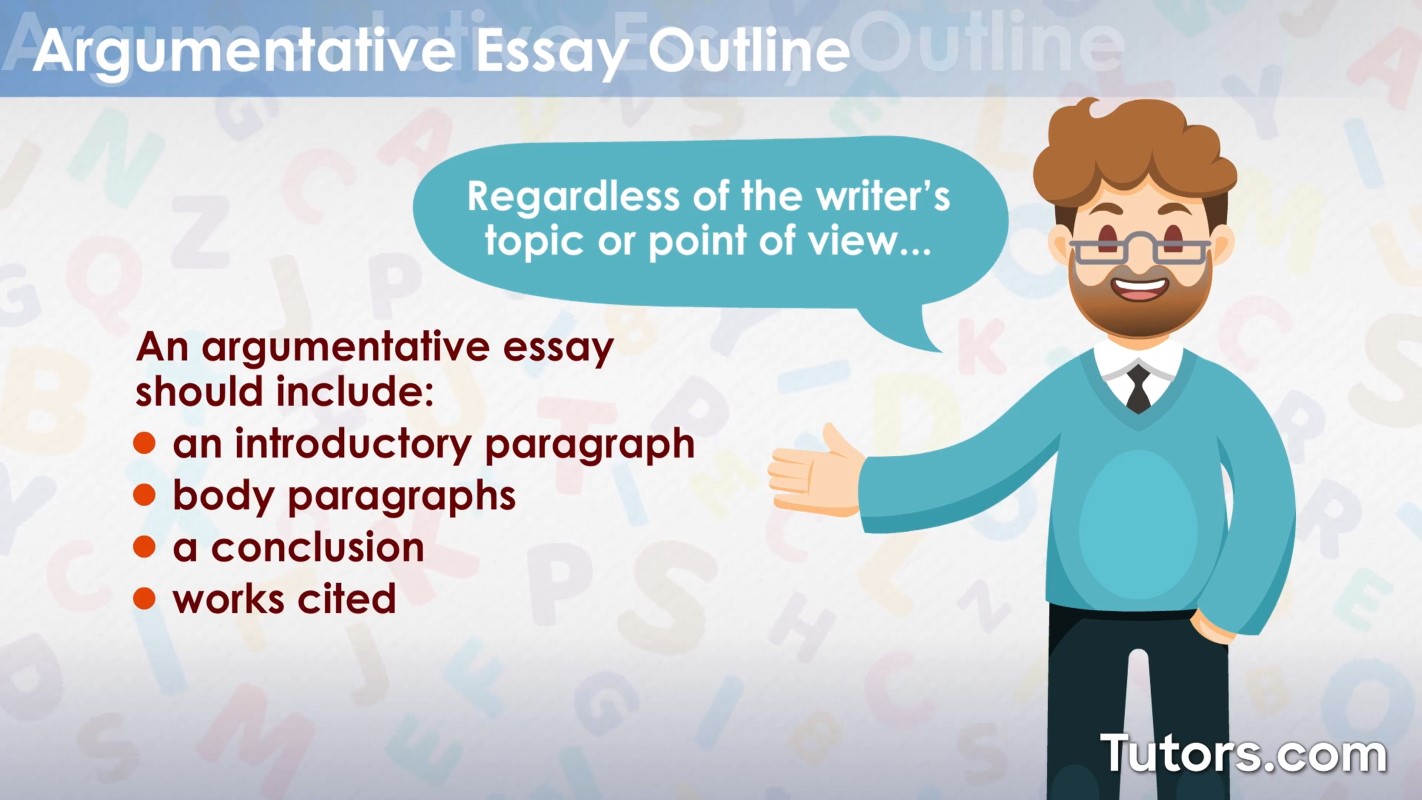
Argumentative essay introduction
The introduction sets the tone for the entire paper and introduces the argument. In general, the first paragraph(s) should attract the reader’s attention, provide relevant context, and conclude with a thesis statement.
To attract the reader's attention , start with an introductory device. There are several attention-grabbing techniques, the most common of which consist of the following:
The writer can emphasize the topic’s importance by explaining the current interest in the topic or indicating that the subject is influential.
Pertinent statistics give the paper an air of authority.
There are many reasons for a stimulating statement to surprise a reader. Sometimes it is joyful; sometimes it is shocking; sometimes it is surprising because of who said it.
An interesting incident or anecdote can act as a teaser to lure the reader into the remainder of the essay. Be sure that the device is appropriate for the subject and focus of what follows.
Provide the reader with relevant context and background information necessary to understand the topic.
Conclude with a thesis statement that identifies the overall purpose of the essay (topic and position). Writers can also include their support directly in the thesis, which outlines the structure of the essay for the reader.
Avoid the following when writing the introduction to argumentative writing:
Starting with dictionary definitions is too overdone and unappealing.
Do not make an announcement of the topic like “In this paper I will…” or “The purpose of this essay is to….”
Evidence supporting or developing the thesis should be in the body paragraphs, not the introduction.
Beginning the essay with general or absolute statements such as “throughout history...” or “as human beings we always...” or similar statements suggest the writer knows all of history or that all people behave or think in the same way.
Argumentative essay thesis
The thesis statement is the single, specific claim the writer sets out to prove and is typically positioned as the last sentence of the introduction . It is the controlling idea of the entire argument that identifies the topic, position, and reasoning.
When constructing a thesis for an argumentative paper, make sure it contains a side of the argument, not simply a topic. An argumentative thesis identifies the writer’s position on a given topic. If a position cannot be taken, then it is not argumentative thesis:
Topic: Capital punishment is practiced in many states.
Thesis: Capital punishment should be illegal.
While not always required, the thesis statement can include the supports the writer will use to prove the main claim. Therefore, a thesis statement can be structured as follows:
TOPIC + POSITION (+ SUPPORTS)
No Supports: College athletes (TOPIC) should be financially compensated (POSITION).
Supports: College athletes (TOPIC) should be financially compensated (POSITION) because they sacrifice their minds and bodies (SUPPORT 1), cannot hold
Argumentative essay body paragraphs
Body paragraphs can be of varying lengths, but they must present a coherent argument unified under a single topic. They are rarely ever longer than one page, double-spaced; usually they are much shorter.
Lengthy paragraphs indicate a lack of structure. Identify the main ideas of a lengthy paragraph to determine if they make more sense as separate topics in separate paragraphs.
Shorter paragraphs usually indicate a lack of substance; there is not enough evidence or analysis to prove the argument. Develop the ideas more or integrate the information into another paragraph.
The structure of an argumentative paragraph should include a topic sentence, evidence, and a transition.
The topic sentence is the thesis of the paragraph that identifies the arguable point in support of the main argument. The reader should know exactly what the writer is trying to prove within the paragraph by reading the first sentence.
The supporting evidence and analysis provide information to support the claim. There should be a balance between the evidence (facts, quotations, summary of events/plot, etc.) and analysis (interpretation of evidence). If the paragraph is evidence-heavy, there is not much of an argument; if it is analysis-heavy, there is not enough evidence in support of the claim.
The transition can be at the beginning or the end of a paragraph. However, it is much easier to combine the transition with the concluding observation to help the paragraphs flow into one another. Transitions in academic writing should tell the reader where you were, where you are going, and relate to the thesis.
Some essays may benefit from the inclusion of rebuttals to potential counterarguments of the writer’s position.
Argumentative essay conclusion
The conclusion should make readers glad they read the paper. It can suggest broader implications that will not only interest readers but also enrich their understanding in some way. There are three aspects to follow when constructing the conclusion: rephrase the thesis, synthesize information, and call the reader to action.
Rephrased the thesis in the first sentence of the conclusion. It must be in different words; do not simply write it verbatim.
Synthesize the argument by showing how the paper's main points support the argument.
Propose a course of action or a solution to an issue. This can redirect the reader's thought process to apply the ideas to their life or to see the broader implications of the topic.
Avoid the following when constructing the conclusion:
Beginning with an unnecessary, overused phrase such as "in conclusion," "in summary," or "in closing;" although these phrases can work in speeches, they come across as trite in writing
Introducing a new idea or subtopic in the conclusion
Making sentimental, emotional appeals that are out of character with the rest of the paper
Including evidence (quotations, statistics, etc.) that should be in the body of the paper
Argumentative essay examples
Examples of argumentative essays vary depending upon the type:
Academic essays differ based upon the topic and position. These essays follow a more traditional structure and are typically assigned in high school or college. Examples of academic argumentative essay topics include the following:
Advantages or disadvantages of social media
Animal testing
Art education
Benefit or detriment of homework
Capital punishment
Class warfare
Immigration
School uniforms
Universal healthcare
Violence in video games
Argumentative literary essays are typically more informal and do not follow the same structure as an academic essay. The following are popular examples of argumentative literary essays:
“Letter from Birmingham Jail” by Martin Luther King, Jr.
“Death of the Moth” by Virginia Woolf
“Shooting an Elephant” by George Orwell
“Thoughts for the Times on War and Death” by Sigmund Freud
“Does the Truth Matter? Science, Pseudoscience, and Civilization” by Carl Sagan
“Self-Reliance” by Ralph Waldo Emerson
Have a language expert improve your writing
Run a free plagiarism check in 10 minutes, generate accurate citations for free.
- Knowledge Base
- How to write an argumentative essay | Examples & tips
How to Write an Argumentative Essay | Examples & Tips
Published on July 24, 2020 by Jack Caulfield . Revised on July 23, 2023.
An argumentative essay expresses an extended argument for a particular thesis statement . The author takes a clearly defined stance on their subject and builds up an evidence-based case for it.
Instantly correct all language mistakes in your text
Upload your document to correct all your mistakes in minutes

Table of contents
When do you write an argumentative essay, approaches to argumentative essays, introducing your argument, the body: developing your argument, concluding your argument, other interesting articles, frequently asked questions about argumentative essays.
You might be assigned an argumentative essay as a writing exercise in high school or in a composition class. The prompt will often ask you to argue for one of two positions, and may include terms like “argue” or “argument.” It will frequently take the form of a question.
The prompt may also be more open-ended in terms of the possible arguments you could make.
Argumentative writing at college level
At university, the vast majority of essays or papers you write will involve some form of argumentation. For example, both rhetorical analysis and literary analysis essays involve making arguments about texts.
In this context, you won’t necessarily be told to write an argumentative essay—but making an evidence-based argument is an essential goal of most academic writing, and this should be your default approach unless you’re told otherwise.
Examples of argumentative essay prompts
At a university level, all the prompts below imply an argumentative essay as the appropriate response.
Your research should lead you to develop a specific position on the topic. The essay then argues for that position and aims to convince the reader by presenting your evidence, evaluation and analysis.
- Don’t just list all the effects you can think of.
- Do develop a focused argument about the overall effect and why it matters, backed up by evidence from sources.
- Don’t just provide a selection of data on the measures’ effectiveness.
- Do build up your own argument about which kinds of measures have been most or least effective, and why.
- Don’t just analyze a random selection of doppelgänger characters.
- Do form an argument about specific texts, comparing and contrasting how they express their thematic concerns through doppelgänger characters.
Prevent plagiarism. Run a free check.
An argumentative essay should be objective in its approach; your arguments should rely on logic and evidence, not on exaggeration or appeals to emotion.
There are many possible approaches to argumentative essays, but there are two common models that can help you start outlining your arguments: The Toulmin model and the Rogerian model.
Toulmin arguments
The Toulmin model consists of four steps, which may be repeated as many times as necessary for the argument:
- Make a claim
- Provide the grounds (evidence) for the claim
- Explain the warrant (how the grounds support the claim)
- Discuss possible rebuttals to the claim, identifying the limits of the argument and showing that you have considered alternative perspectives
The Toulmin model is a common approach in academic essays. You don’t have to use these specific terms (grounds, warrants, rebuttals), but establishing a clear connection between your claims and the evidence supporting them is crucial in an argumentative essay.
Say you’re making an argument about the effectiveness of workplace anti-discrimination measures. You might:
- Claim that unconscious bias training does not have the desired results, and resources would be better spent on other approaches
- Cite data to support your claim
- Explain how the data indicates that the method is ineffective
- Anticipate objections to your claim based on other data, indicating whether these objections are valid, and if not, why not.
Rogerian arguments
The Rogerian model also consists of four steps you might repeat throughout your essay:
- Discuss what the opposing position gets right and why people might hold this position
- Highlight the problems with this position
- Present your own position , showing how it addresses these problems
- Suggest a possible compromise —what elements of your position would proponents of the opposing position benefit from adopting?
This model builds up a clear picture of both sides of an argument and seeks a compromise. It is particularly useful when people tend to disagree strongly on the issue discussed, allowing you to approach opposing arguments in good faith.
Say you want to argue that the internet has had a positive impact on education. You might:
- Acknowledge that students rely too much on websites like Wikipedia
- Argue that teachers view Wikipedia as more unreliable than it really is
- Suggest that Wikipedia’s system of citations can actually teach students about referencing
- Suggest critical engagement with Wikipedia as a possible assignment for teachers who are skeptical of its usefulness.
You don’t necessarily have to pick one of these models—you may even use elements of both in different parts of your essay—but it’s worth considering them if you struggle to structure your arguments.
Regardless of which approach you take, your essay should always be structured using an introduction , a body , and a conclusion .
Like other academic essays, an argumentative essay begins with an introduction . The introduction serves to capture the reader’s interest, provide background information, present your thesis statement , and (in longer essays) to summarize the structure of the body.
Hover over different parts of the example below to see how a typical introduction works.
The spread of the internet has had a world-changing effect, not least on the world of education. The use of the internet in academic contexts is on the rise, and its role in learning is hotly debated. For many teachers who did not grow up with this technology, its effects seem alarming and potentially harmful. This concern, while understandable, is misguided. The negatives of internet use are outweighed by its critical benefits for students and educators—as a uniquely comprehensive and accessible information source; a means of exposure to and engagement with different perspectives; and a highly flexible learning environment.
The body of an argumentative essay is where you develop your arguments in detail. Here you’ll present evidence, analysis, and reasoning to convince the reader that your thesis statement is true.
In the standard five-paragraph format for short essays, the body takes up three of your five paragraphs. In longer essays, it will be more paragraphs, and might be divided into sections with headings.
Each paragraph covers its own topic, introduced with a topic sentence . Each of these topics must contribute to your overall argument; don’t include irrelevant information.
This example paragraph takes a Rogerian approach: It first acknowledges the merits of the opposing position and then highlights problems with that position.
Hover over different parts of the example to see how a body paragraph is constructed.
A common frustration for teachers is students’ use of Wikipedia as a source in their writing. Its prevalence among students is not exaggerated; a survey found that the vast majority of the students surveyed used Wikipedia (Head & Eisenberg, 2010). An article in The Guardian stresses a common objection to its use: “a reliance on Wikipedia can discourage students from engaging with genuine academic writing” (Coomer, 2013). Teachers are clearly not mistaken in viewing Wikipedia usage as ubiquitous among their students; but the claim that it discourages engagement with academic sources requires further investigation. This point is treated as self-evident by many teachers, but Wikipedia itself explicitly encourages students to look into other sources. Its articles often provide references to academic publications and include warning notes where citations are missing; the site’s own guidelines for research make clear that it should be used as a starting point, emphasizing that users should always “read the references and check whether they really do support what the article says” (“Wikipedia:Researching with Wikipedia,” 2020). Indeed, for many students, Wikipedia is their first encounter with the concepts of citation and referencing. The use of Wikipedia therefore has a positive side that merits deeper consideration than it often receives.
Receive feedback on language, structure, and formatting
Professional editors proofread and edit your paper by focusing on:
- Academic style
- Vague sentences
- Style consistency
See an example

An argumentative essay ends with a conclusion that summarizes and reflects on the arguments made in the body.
No new arguments or evidence appear here, but in longer essays you may discuss the strengths and weaknesses of your argument and suggest topics for future research. In all conclusions, you should stress the relevance and importance of your argument.
Hover over the following example to see the typical elements of a conclusion.
The internet has had a major positive impact on the world of education; occasional pitfalls aside, its value is evident in numerous applications. The future of teaching lies in the possibilities the internet opens up for communication, research, and interactivity. As the popularity of distance learning shows, students value the flexibility and accessibility offered by digital education, and educators should fully embrace these advantages. The internet’s dangers, real and imaginary, have been documented exhaustively by skeptics, but the internet is here to stay; it is time to focus seriously on its potential for good.
If you want to know more about AI tools , college essays , or fallacies make sure to check out some of our other articles with explanations and examples or go directly to our tools!
- Ad hominem fallacy
- Post hoc fallacy
- Appeal to authority fallacy
- False cause fallacy
- Sunk cost fallacy
College essays
- Choosing Essay Topic
- Write a College Essay
- Write a Diversity Essay
- College Essay Format & Structure
- Comparing and Contrasting in an Essay
(AI) Tools
- Grammar Checker
- Paraphrasing Tool
- Text Summarizer
- AI Detector
- Plagiarism Checker
- Citation Generator
An argumentative essay tends to be a longer essay involving independent research, and aims to make an original argument about a topic. Its thesis statement makes a contentious claim that must be supported in an objective, evidence-based way.
An expository essay also aims to be objective, but it doesn’t have to make an original argument. Rather, it aims to explain something (e.g., a process or idea) in a clear, concise way. Expository essays are often shorter assignments and rely less on research.
At college level, you must properly cite your sources in all essays , research papers , and other academic texts (except exams and in-class exercises).
Add a citation whenever you quote , paraphrase , or summarize information or ideas from a source. You should also give full source details in a bibliography or reference list at the end of your text.
The exact format of your citations depends on which citation style you are instructed to use. The most common styles are APA , MLA , and Chicago .
The majority of the essays written at university are some sort of argumentative essay . Unless otherwise specified, you can assume that the goal of any essay you’re asked to write is argumentative: To convince the reader of your position using evidence and reasoning.
In composition classes you might be given assignments that specifically test your ability to write an argumentative essay. Look out for prompts including instructions like “argue,” “assess,” or “discuss” to see if this is the goal.
Cite this Scribbr article
If you want to cite this source, you can copy and paste the citation or click the “Cite this Scribbr article” button to automatically add the citation to our free Citation Generator.
Caulfield, J. (2023, July 23). How to Write an Argumentative Essay | Examples & Tips. Scribbr. Retrieved June 10, 2024, from https://www.scribbr.com/academic-essay/argumentative-essay/
Is this article helpful?

Jack Caulfield
Other students also liked, how to write a thesis statement | 4 steps & examples, how to write topic sentences | 4 steps, examples & purpose, how to write an expository essay, get unlimited documents corrected.
✔ Free APA citation check included ✔ Unlimited document corrections ✔ Specialized in correcting academic texts
Free Argumentative Essay Examples
Students start writing 5-paragraph argumentative essays in middle school. It is the teachers’ most fancied assignment in all humanities and even some scientific disciplines.
What is the purpose of an argumentative essay? You are expected to provide an unbiased and well-grounded explanation of why your opinion is correct. The last main body paragraph should also tackle the opposing point of view and show how it is wrong. The task sounds simple, but few students manage it from the first try.
This section features free argumentative essay examples for college and other study levels. It is always better to draw inspiration from a good sample.
341 Best Argumentative Essay Examples
Educational applications of nursing informatics.
- Subjects: Health & Medicine Nursing
- Words: 2230
Cyberbullying as a Major Problem in Contemporary Society
- Subjects: Entertainment & Media Social Media Issues
- Words: 1107
Women’s Work Advantages and Disadvantages Essay
- Subjects: Gender Inequality Sociology
Graduate Management Admission Test: Pros and Cons
- Subjects: Education Writing & Assignments
Stress Assessment Questionnaire Ethical Usage
- Subjects: Ethics Sociology
- Words: 1378
Should Video Games Be Considered a Sport?
- Subjects: Entertainment & Media Games
- Words: 1477
Addressing the Income Inequality in the People’s Republic of China
- Subjects: Economic Problems Economics
- Words: 2042
Leaders are Made, Not Born: Examples and Debate Points Essay
- Subjects: Business Management
Abortion: Theories and Moral Issues
- Subjects: Health & Medicine Medical Ethics
- Words: 3870
Anti- and Pro-Abortion Arguments
Common sense and compassion in the workplace replaced by litigation.
- Subjects: Business Employee Relationships
Corporations Should Participate in Elections
- Subjects: Elections Politics & Government
- Words: 1677
A Woman Has A Natural Right To Get An Abortion
Can god and real evil be reconciled.
- Subjects: Philosophy Philosophy of Religion
- Words: 1441
Death of a Salesman by Arthur Miller
- Subjects: American Literature Literature
Critical Thinking Paper: Executive Compensation
- Words: 1194
Do Men and Women Speak Differently?
- Subjects: Gender Studies Sociology
- Words: 4146
The federal government should run a national system of health care
- Subjects: Government Politics & Government
- Words: 1020
The Miller’s Tale and its Form: the Fabliau
- Subjects: British Literature Literature
- Words: 1438
Entrepreneurial Management in University
- Words: 1111
Marxist Concept of Exploitation and the Contemporary Labour Market
- Subjects: Economic Concepts Economics
- Words: 3912
Controversial Question About Abortion
Efficiency and effectiveness pursuit of management.
- Words: 1933
Globalization Has Meant That the Local Is No Longer Important
- Subjects: Economics Globalization
- Words: 2257
Fashion Magazines: Print Media Isn’t Dead and Here’s Why
- Subjects: Entertainment & Media Journalism
- Words: 3061
Total War of World War I
- Subjects: Warfare World War I
- Words: 1453
Criminal Justice System. Deterrence and Incarceration
- Subjects: Criminal Law Law
- Words: 1373
Why Employees Should Be Compensated for Good Work
- Words: 1385
Propaganda Model and Media Power
- Subjects: Sociological Issues Sociology
- Words: 1408
Popular Culture – Madonna’s Significant Impact
- Subjects: Art Singers
Ability to Manage Stress as the Most Important Skill of Effective Communicators
- Subjects: Applications of Psychology Psychology
- Words: 1219
Online Education in Californian Universities
- Subjects: Education Education Theories
- Words: 1388
Balanced Scorecard versus Bottom-line Approach in Resort & Hotel Operations
- Subjects: Hotels Tourism
Teaching in Middle Schools
- Subjects: Education Pedagogical Approaches
Curriculum as PRAXIS Proposal
- Subjects: Curriculum Development Education
- Words: 1743
The Usefulness of Physical Education in Modern Education
- Words: 1118
The Primary Causes of Terrorist Political Violence
- Subjects: Terrorism Warfare
- Words: 2232
Sustainable Tourism and Market Economy
- Subjects: Business Marketing
- Words: 1913
History of British Empire
- Subjects: History Western Europe
- Words: 3054
The Effects of Television on the Way People Understand Themselves
- Subjects: Entertainment & Media TV
- Words: 2224
The National Curriculum for England and Wales From an Ideal Democratic Learning Society Perspective
- Words: 4979
Employment Relations in Modern Australian Workplaces
- Words: 1958
Counselling Theory of Freudian Psychoanalysis
- Subjects: Psychologists Psychology
- Words: 1779
International Relations as Natural and Social Science
- Subjects: International Relations Politics & Government
Does the East Asian “Miracle” Invalidate Dependency Theory
- Words: 3534
Hotel/Resort Development and Management
- Words: 3189
Emotional Intelligence’s Impact in the Workplace
Rubrics and good instructional models. taking care of the learning process, gay marriage’s social and religious debates.
- Subjects: Family, Life & Experiences Relationships
- Words: 1000
The Integration of CamStudio and Windows Movie Maker Into the Education Programs
- Subjects: Tech & Engineering Technology in Education
Living Consciously in an Unconscious World
- Subjects: Philosophical Concept Philosophy
- Words: 2403
Abortion: Pro-Choice and Pro-Life Movement
Leadership and organization development at rcdp.
- Words: 2513
Class Size Matters
- Words: 1413
HR Approach in Recruiting Senior Managers
- Words: 1126
A Workplace Wellness Program
- Words: 3330
Music Effects on the Brain
- Subjects: Psychological Issues Psychology
- Words: 2251
Human Mastery in Voluntary Self-Restraint
- Subjects: Environment Planet Protection
- Words: 1146
Communication in Hospital Emergency Department
- Subjects: Health & Medicine Healthcare Institution
Personal Development Plan
- Words: 2460
The Triple Bottom Line and the Global Reporting Initiatives
The free trade role in the industrial development of syria.
- Subjects: Economics Trade
Debates Around Legalization of Medical Marijuana
- Subjects: Health & Medicine Pharmacology
Women Exploitation in Advertising
Understanding the strengths of corporate social responsibility: the case of coca cola.
- Subjects: Business Business Ethics
- Words: 1450
Is the Family a Fabricated Thing?
- Subjects: Family Formation Family, Life & Experiences
- Words: 3352
Why Educators Should Do Research
- Subjects: Education Educational Resources
The Origin of Cognitive Dissonance
- Subjects: Cognition and Perception Psychology
Using Mobile Learning to Increase Environmental Awareness
- Subjects: Education Pedagogy
- Words: 3067
You Cannot Live Without Mobile Phones
- Subjects: Phones Tech & Engineering
The Marlboro Ads as a Propaganda Advertising
- Subjects: Advertising Entertainment & Media
Protecting the Environment
- Subjects: Ecology Environment
John D. Rockefeller – Standard Oil Monopoly
- Subjects: Business Strategy
- Words: 1957
Ethics and Business Management
Childhood obesity as a serious health problem of the world.
- Subjects: Health & Medicine Healthy Nutrition
Is Attention Deficit Disorder a Real Disorder? When Medicine Faces Controversial Issues
- Words: 1376
Institutional Accountability: Dispersion of Power and Delegation of Responsibilities
- Words: 1379
Is Political Analysis a ‘Scientific’ Enterprise? Should It Be?
- Subjects: Politics & Government Social & Political Theory
- Words: 2234
Victimization of the Black Americans
- Subjects: Racism Sociology
How to Survive When a Disaster Outbreaks?
- Subjects: Disasters Environment
Variables Affecting Attitudes Towards Immigrants
- Subjects: Immigration Sociology
- Words: 1484
Children Spanking: Corporal Punishment in America
Sustainability of change management.
- Words: 2537
Postmodern Plural Approach to Religion and Ratzinger’s “Dictatorship of Relativism”
- Words: 2270
An Argument Against Euthanasia
- Words: 2523
Should Marijuana Be Legal?
Principles of assessment: expository of scientific report writing as an assessment item.
- Words: 1133
Without Faith, There Can Be No True Virtue?
- Subjects: Religion Theology
- Words: 1737
Effects of Divorce on Children: Essay Example
- Words: 1419
Demographic Change as an Opportunity to UK Businesses
Social networking as participatory surveillance.
- Words: 1164
The Importance of Theory to a Theorist
- Subjects: Sciences Scientific Method
Accreditation to Improve Public Health Capacity and Services
- Subjects: Health & Medicine Public Health
The Usefulness of Educational Research
- Subjects: Education Education Perception
The Relationship Between Entrepreneurship and Creativity
- Subjects: Economic Trends Economics
- Words: 1938
Career Planning and Career Management
- Words: 2515
The United States Supreme Court: Marbury vs. Madison
- Subjects: Constitutional Law Law
- Words: 1681
Do We Have a Crisis in the High Street?
- Subjects: Business Impact of Business Issues
- Words: 2001
Milkshakes: Understanding the Job
Economic globalization and its limitations.
- Words: 2849
The Future of Able Corporation
- Subjects: Business Case Study
- Words: 2508
Solar Photovoltaic (PV)
- Subjects: Engineering Tech & Engineering
- Words: 3763
Utilitarianism and Human Resource Management
- Words: 1144
Bisphenol-A Should be Banned
- Subjects: Administration and Regulation Health & Medicine
- Words: 1127
Newspapers Are Under Attack From The Net. What Strategies Might Be Followed To Survive?
- Subjects: Entertainment & Media World News
- Words: 1416
Was the American Revolution Really Revolutionary?
- Subjects: American Revolution Period History
Channelling and Pricing Strategy
- Words: 1750
Verbal and Non-Verbal Communication Styles Across Ethnic and Cultural Backgrounds
- Subjects: Interpersonal Communication Episodes Psychology
- Words: 1544
Balanced Score Card – UNUM Corporation
- Words: 2905
Corporate Social Responsibility in International Human Resource Strategy
- Words: 1950
Smoking Culture in Society
- Subjects: Cultural Issues Culture
- Words: 1824
Media’s Relationship to Anti-social Behavior
- Words: 1690
The Most Serious Threats to the State Come from its Citizens
- Words: 1899
Identity in Pop Culture: Asians and Females in US Society
- Words: 1733
Renewable Energy: Geothermal Energy
Childhood obesity and advertising.
- Words: 1486
Managerial Implications of Employee Engagement
- Words: 1944
Obedience and Authority
- Subjects: Behavior Psychology
Intimacy and Media Technologies
- Words: 1426
Using Technology in Classrooms
- Words: 1440
Argumentative Essay Guide
Argumentative Essay Examples
Last updated on: Feb 9, 2023
Informative Argumentative Essay Examples by Experts
By: Jared P.
10 min read
Reviewed By: Rylee W.
Published on: Nov 5, 2019

Need some quick help with your argumentative essays? Here are some easy-to-follow and free examples for your help.
When assigned to write an essay, be it any kind, it is helpful to go through a few examples. We have crafted two argumentative essay examples for your help.
An argumentative essay is a work of prose written with the intention of convincing readers to agree with the author's opinion on a topic. It does so by presenting facts and information that support one side of an issue while refuting or disproving opposing arguments.
They are somewhat like persuasive essays but are different from them in terms of aim and writing style.
This blog post features some informative examples from experts for students who want some help writing their own argumentative essays!
You can also get a hand on some interesting argumentative essay example pdfs for more ideas.

On this Page
What Is an Argumentative Essay?
The argumentative essay is a genre of writing that requires you to investigate, collect evidence and establish an opinion on a topic.
A good argumentative essay does not only include facts and statistics but also includes reasoning, which is what makes it persuasive. With that in mind, you should present your main idea or thesis statement. Because this will be the focal point of everything else that follows from there.
The standard five-paragraph format is generally required for argumentative essays. These essays either follow the Toulmin model or Rogerian Model, which are both very common formats used to create an effective essay.
Below you can two interesting argumentative examples on interesting topics that you can read for your better understanding.
1. Should human cloning be allowed?
Discovery and invention are the truest companions of man in the journey of his civilization. This journey took a controversial turn when it was invented that clones of an individual can be created. It all started when Dolly the sheep was created. Where it opened a gateway of advanced discoveries and inventions, it also disturbed many religious communities across the entire world. Even today, it is a hot topic to understand whether it should be allowed to make clones of different organisms or not. The US movement to ban human cloning is strongly endorsed by the leader of the research team that cloned the sheep “Dolly.” However, he said that his method to create human embryos for research purposes that aren’t implanted could not be objectified ethically. This technique can be very helpful for infertile couples to have children of their own, removing birth defects, prolonging life, organ transplant, and many medical conditions. Although cloning of organisms can help us in various ways that we know and know not. If human cloning is allowed, it can open a new chapter of drastic chaos which may threaten human civilization. The criminal sector and many curious people may take this particular invention of science to a level where unethical, inhumane, and morally unforgivable crimes can be committed unquestionably. It can be understood this way that a clone of a human, when fully grown, will be the same as the rest of humans. As it will feel and respond just like any other human, it will hold all the human rights which do not allow a person to be a subject of experimentation without their choice. If research organizations are allowed to use the technique of cloning to a restricted level, things may work out well. However, allowing such experiments requires extensive care and monitoring, which is an intricate and yet delicate task. Moreover, even if it is allowed, it has serious cons as well. Even a little mistake in this field can lead to horrible consequences. For instance, in the case of organ transplant the body may reject the cloned tissues. Human nature is the cluster of infinite positive and negative energies, and there is always a constant battle between both. Negative energies are always ready to engulf the positive ones to take charge of the personality, and attract an individual to do immoral acts. Because of this particular reason, humans created laws and rules to establish a controlled environment. That is how mankind became more and more civilized with the passage of time. Now, almost an entire population of Earth holds on to moral, ethical, traditional, and religious values. So, the government, scientists, and the public are left with no choice but to ban the cloning of humans as there is a chance that a group of people may take advantage and do unforgivable immoral acts. Human cloning has unlimited advantages as well as disadvantages. If it is to be decided whether human cloning should be allowed or not, both sides have strong and valid reasons. Obviously, it cannot be allowed to immorally use this technique, and on the other hand, it has countless miraculous advantages in the field of medicine which cannot be ignored. Scientists, the government, and the public need to come up with a solution, which can allow this technique to be used in a way that is ethically appropriate and medically helpful. |
Why Does This Essay Work?
This essay is riddled with precise and persuasive arguments that are backed by specific research. It also includes a clear thesis statement and data to support the argument.

Paper Due? Why Suffer? That's our Job!
2. Is it Right to Blame Social Media for the Use of Incorrect Grammar?
OMG and LOL have become a trend in the ways of communication of people, and they have been the acronyms of the last decade. The attraction of social media has expanded to a level that people are now dependent on the internet to perform their everyday tasks, and they are creating a language of their own. Since the birth of social media, it has been noticed that the younger generation is getting bad at grammar. This particular issue is a serious problem as it is making an entire society to become unable to structure coherent sentences which making upcoming generations dumb. People do not give any significance to focus on their education and grammar while they are spending time on social media. As people find it a trend to write and communicate colloquially while using social media, they are getting bad at grammar and writing well-structured essays and sentences. As most of the younger generation likes to spend time on social media platforms like Facebook, Twitter, Snapchat, Instagram, such platforms have become the source of their learning and practice. They choose to write sentences with minimum words and words with minimum characters; their goal is to send their message instantly. For instance, they use “u” instead of “you” and “r” instead of “are” to shorten the length of words. Similarly, individuals create abbreviations for phrases like using “LMSO,” “OMG!” “WAU?” which are referred to as “laughing my socks off,” “Oh my God!”, and “What about you?", respectively. Moreover, while spending their time, they choose to communicate through modern techniques. Such techniques aim to shorten their time of writing and still make their communication expressively strong. The addition of emojis, GIFs, and stickers has created another level of social media communication. Even though individuals communicate using short sentences, it is now observed that individuals use emojis, GIFs, and stickers more than they use actual words. This advanced way has entirely changed the way individuals use to connect with each other in emotional as well as learning aspects. It is taking away academic learning and professional communication skills from students and encouraging bad grammar in various aspects. As high school and college students spend most of their time on social media platforms, they have started using the same language of slang in their academic papers as well. So; there is no wonder why the younger generation is getting noticeably bad at grammar. Parents, government, and educational institutes need to come up with a solution that can help students get a strong grip on their grammar skills while using social media platforms. |
Focusing on the strengths and weaknesses of each side, this article gives readers a full view of an argument with multiple reasons why people agree.
The examples mentioned above in the article on two interesting argumentative essay topics follow a specific outline. The first paragraph is the introductory paragraph. You need to start your introductory paragraph with an opening sentence which should act as a hook. Your first line should be captivating enough to instantly grab the attention of the reader.
If you’re still a little confused about this structure, you can learn more about the argumentative essay outline for organized and well-structured writing.
Here are some additional examples of an argumentative essay that you will benefit from.
Argumentative Essay Examples for College
Here is a college-level argumentative essay example that you read before starting working on your essay.
ARGUMENTATIVE ESSAY FOR COLLEGE
Argumentative Essay Examples for High School
The following is an interesting argumentative essay example for high school students to understand and create a perfect argument to convince the readers.
ARGUMENTATIVE ESSAY FOR HIGH SCHOOL
Argumentative Essay Examples for Middle School
Don’t know how to support your argument in your essay? Here is a perfect argumentative essay that explains the concept.
ARGUMENTATIVE ESSAY FOR MIDDLE SCHOOL
Tough Essay Due? Hire Tough Writers!
Argumentative Essay Writing Tips
Here are some easy tips that will help you with writing a perfect argumentative essay.
- Choose an Engaging Topic
When it comes to choosing a topic for your argumentative essay, you should always go with something that is debatable. An arguable and researchable argumentative essay topic will make the writing process more enjoyable because you'll feel excited from the beginning until the end.
- Choose a Proper Structure for Your Essay
An argumentative essay can be structured in Classical, Toulmin, or Rogerian styles and formats. These are all types of arguments with a logical flow and purpose that you may choose to use when writing an essay for high school or college.
- Conduct In-depth and Careful Research
You want to produce a great argumentative essay. A good way of going about that is by conducting extensive research as it will help broaden your horizons and you'll have more supporting evidence for the topic at hand.
- Use Credible Sources
Showing someone evidence from credible sources is the only way for them to change their perspective. If you want a person who disagrees with your point of view on something, then show that person the side of the argument supported by facts and data instead of just expecting him or her to agree without any proof.
- Add Counter Arguments
A key component of an argumentative essay is using counter-arguments. Introduce the opposing view in a few short sentences and proceed to refute them with fact-based empirical evidence, which can be persuasive for readers by gaining their trust through credibility.
- Begin with an Engaging Introduction
When writing an essay, it is important to pay attention to the introductory paragraph. If you can craft a strong thesis statement that communicates your stance then you are off on a good start. A compelling thesis will allow readers of your work to know what they should expect from reading further down into each section.
- Use Simple Sentences
To communicate your argument, avoid complex vocabulary and long sentences. Instead, try to be creative with the words you use but also make sure that they are accessible and easy to understand for the readers.
- Be Authoritative
If you appear to be uncertain and indecisive in your argument, then the content of what you're saying will not matter. When writing an argumentative essay, do not come across as timid or unsure. Choose a side and stick with it.
- Do Not Overlook the Length of the Essay
When writing an argumentative essay, it is very easy to stray from the assigned 1500-word length given by your instructor. Writing a 4000-word essay while the maximum word count was only supposed to be half of that probably isn’t a good idea. It can be a stress on both ends since not many instructors have enough time or patience enough for such essays.
- Avoid Sensitive and Controversial Topics
It's best to avoid sensitive topics like race, sport, politics, or religion when writing. You don't want to offend readers with strong personal opinions that differ from yours. Hopefully, the above examples and expert tips will help you in understanding how to write a perfect argumentative essay.
Or you can place your order at 5StarEssays.com , which has an unbeatable record of providing extraordinary quality at the most affordable rates.
We can provide you with the best ‘ do my essay for me? ’ help. Our expert essay writers are ready round the clock to provide you with an on-time and perfectly written argumentative essay, or other research papers.
Talk to us now!
Frequently Asked Questions
How do i start an argumentative essay.
A good way of starting an argumentative essay is to set the context and then explain how important this topic is. Next, you will have to present your thesis statement so that readers know what they are about to read from start to finish.
Can you start an argumentative essay with a question?
There are many ways you can start your argumentative paper, but there's nothing better than starting with a question.
Using a rhetorical question as an introduction will allow you to lead your essay with style and creativity. It also allows for the reader of your paper to more easily follow along.
What goes into the body of an argumentative essay?
A typical argumentative essay contains three or more paragraphs that are in defense of a thesis. Each body paragraph must cover one idea which is explained and justified with evidence. As well as having its own topic sentence to clearly establish the author's position on their respective piece of evidence. It will show why they believe their stance holds weight when considering what side you take.

Masters Essay, Literature
Jared P. is a renowned author and writing service provider with over fifteen years of experience in the publishing industry. He has a Ph.D. degree in English Literature and has spent his entire career helping students achieve their academic goals by providing expert writing assistance.
Was This Blog Helpful?
Keep reading.
- Learn How to Write an Argumentative Essay

- Argumentative Essay Topics - Compelling Ideas to Get Started

- How to Create a Strong Argumentative Essay Outline?

- Know About Types of Argument with the Help of Examples

People Also Read
- creative writing
- illustration essay topics
- definition essay topics
- research paper writing
- how to cite a research paper
Burdened With Assignments?

Advertisement
- Homework Services: Essay Topics Generator
© 2024 - All rights reserved

Choose Your Test
Sat / act prep online guides and tips, how to write an a+ argumentative essay.
Miscellaneous

You'll no doubt have to write a number of argumentative essays in both high school and college, but what, exactly, is an argumentative essay and how do you write the best one possible? Let's take a look.
A great argumentative essay always combines the same basic elements: approaching an argument from a rational perspective, researching sources, supporting your claims using facts rather than opinion, and articulating your reasoning into the most cogent and reasoned points. Argumentative essays are great building blocks for all sorts of research and rhetoric, so your teachers will expect you to master the technique before long.
But if this sounds daunting, never fear! We'll show how an argumentative essay differs from other kinds of papers, how to research and write them, how to pick an argumentative essay topic, and where to find example essays. So let's get started.
What Is an Argumentative Essay? How Is it Different from Other Kinds of Essays?
There are two basic requirements for any and all essays: to state a claim (a thesis statement) and to support that claim with evidence.
Though every essay is founded on these two ideas, there are several different types of essays, differentiated by the style of the writing, how the writer presents the thesis, and the types of evidence used to support the thesis statement.
Essays can be roughly divided into four different types:
#1: Argumentative #2: Persuasive #3: Expository #4: Analytical
So let's look at each type and what the differences are between them before we focus the rest of our time to argumentative essays.
Argumentative Essay
Argumentative essays are what this article is all about, so let's talk about them first.
An argumentative essay attempts to convince a reader to agree with a particular argument (the writer's thesis statement). The writer takes a firm stand one way or another on a topic and then uses hard evidence to support that stance.
An argumentative essay seeks to prove to the reader that one argument —the writer's argument— is the factually and logically correct one. This means that an argumentative essay must use only evidence-based support to back up a claim , rather than emotional or philosophical reasoning (which is often allowed in other types of essays). Thus, an argumentative essay has a burden of substantiated proof and sources , whereas some other types of essays (namely persuasive essays) do not.
You can write an argumentative essay on any topic, so long as there's room for argument. Generally, you can use the same topics for both a persuasive essay or an argumentative one, so long as you support the argumentative essay with hard evidence.
Example topics of an argumentative essay:
- "Should farmers be allowed to shoot wolves if those wolves injure or kill farm animals?"
- "Should the drinking age be lowered in the United States?"
- "Are alternatives to democracy effective and/or feasible to implement?"
The next three types of essays are not argumentative essays, but you may have written them in school. We're going to cover them so you know what not to do for your argumentative essay.
Persuasive Essay
Persuasive essays are similar to argumentative essays, so it can be easy to get them confused. But knowing what makes an argumentative essay different than a persuasive essay can often mean the difference between an excellent grade and an average one.
Persuasive essays seek to persuade a reader to agree with the point of view of the writer, whether that point of view is based on factual evidence or not. The writer has much more flexibility in the evidence they can use, with the ability to use moral, cultural, or opinion-based reasoning as well as factual reasoning to persuade the reader to agree the writer's side of a given issue.
Instead of being forced to use "pure" reason as one would in an argumentative essay, the writer of a persuasive essay can manipulate or appeal to the reader's emotions. So long as the writer attempts to steer the readers into agreeing with the thesis statement, the writer doesn't necessarily need hard evidence in favor of the argument.
Often, you can use the same topics for both a persuasive essay or an argumentative one—the difference is all in the approach and the evidence you present.
Example topics of a persuasive essay:
- "Should children be responsible for their parents' debts?"
- "Should cheating on a test be automatic grounds for expulsion?"
- "How much should sports leagues be held accountable for player injuries and the long-term consequences of those injuries?"
Expository Essay
An expository essay is typically a short essay in which the writer explains an idea, issue, or theme , or discusses the history of a person, place, or idea.
This is typically a fact-forward essay with little argument or opinion one way or the other.
Example topics of an expository essay:
- "The History of the Philadelphia Liberty Bell"
- "The Reasons I Always Wanted to be a Doctor"
- "The Meaning Behind the Colloquialism ‘People in Glass Houses Shouldn't Throw Stones'"
Analytical Essay
An analytical essay seeks to delve into the deeper meaning of a text or work of art, or unpack a complicated idea . These kinds of essays closely interpret a source and look into its meaning by analyzing it at both a macro and micro level.
This type of analysis can be augmented by historical context or other expert or widely-regarded opinions on the subject, but is mainly supported directly through the original source (the piece or art or text being analyzed) .
Example topics of an analytical essay:
- "Victory Gin in Place of Water: The Symbolism Behind Gin as the Only Potable Substance in George Orwell's 1984"
- "Amarna Period Art: The Meaning Behind the Shift from Rigid to Fluid Poses"
- "Adultery During WWII, as Told Through a Series of Letters to and from Soldiers"

There are many different types of essay and, over time, you'll be able to master them all.
A Typical Argumentative Essay Assignment
The average argumentative essay is between three to five pages, and will require at least three or four separate sources with which to back your claims . As for the essay topic , you'll most often be asked to write an argumentative essay in an English class on a "general" topic of your choice, ranging the gamut from science, to history, to literature.
But while the topics of an argumentative essay can span several different fields, the structure of an argumentative essay is always the same: you must support a claim—a claim that can reasonably have multiple sides—using multiple sources and using a standard essay format (which we'll talk about later on).
This is why many argumentative essay topics begin with the word "should," as in:
- "Should all students be required to learn chemistry in high school?"
- "Should children be required to learn a second language?"
- "Should schools or governments be allowed to ban books?"
These topics all have at least two sides of the argument: Yes or no. And you must support the side you choose with evidence as to why your side is the correct one.
But there are also plenty of other ways to frame an argumentative essay as well:
- "Does using social media do more to benefit or harm people?"
- "Does the legal status of artwork or its creators—graffiti and vandalism, pirated media, a creator who's in jail—have an impact on the art itself?"
- "Is or should anyone ever be ‘above the law?'"
Though these are worded differently than the first three, you're still essentially forced to pick between two sides of an issue: yes or no, for or against, benefit or detriment. Though your argument might not fall entirely into one side of the divide or another—for instance, you could claim that social media has positively impacted some aspects of modern life while being a detriment to others—your essay should still support one side of the argument above all. Your final stance would be that overall , social media is beneficial or overall , social media is harmful.
If your argument is one that is mostly text-based or backed by a single source (e.g., "How does Salinger show that Holden Caulfield is an unreliable narrator?" or "Does Gatsby personify the American Dream?"), then it's an analytical essay, rather than an argumentative essay. An argumentative essay will always be focused on more general topics so that you can use multiple sources to back up your claims.
Good Argumentative Essay Topics
So you know the basic idea behind an argumentative essay, but what topic should you write about?
Again, almost always, you'll be asked to write an argumentative essay on a free topic of your choice, or you'll be asked to select between a few given topics . If you're given complete free reign of topics, then it'll be up to you to find an essay topic that no only appeals to you, but that you can turn into an A+ argumentative essay.
What makes a "good" argumentative essay topic depends on both the subject matter and your personal interest —it can be hard to give your best effort on something that bores you to tears! But it can also be near impossible to write an argumentative essay on a topic that has no room for debate.
As we said earlier, a good argumentative essay topic will be one that has the potential to reasonably go in at least two directions—for or against, yes or no, and why . For example, it's pretty hard to write an argumentative essay on whether or not people should be allowed to murder one another—not a whole lot of debate there for most people!—but writing an essay for or against the death penalty has a lot more wiggle room for evidence and argument.
A good topic is also one that can be substantiated through hard evidence and relevant sources . So be sure to pick a topic that other people have studied (or at least studied elements of) so that you can use their data in your argument. For example, if you're arguing that it should be mandatory for all middle school children to play a sport, you might have to apply smaller scientific data points to the larger picture you're trying to justify. There are probably several studies you could cite on the benefits of physical activity and the positive effect structure and teamwork has on young minds, but there's probably no study you could use where a group of scientists put all middle-schoolers in one jurisdiction into a mandatory sports program (since that's probably never happened). So long as your evidence is relevant to your point and you can extrapolate from it to form a larger whole, you can use it as a part of your resource material.
And if you need ideas on where to get started, or just want to see sample argumentative essay topics, then check out these links for hundreds of potential argumentative essay topics.
101 Persuasive (or Argumentative) Essay and Speech Topics
301 Prompts for Argumentative Writing
Top 50 Ideas for Argumentative/Persuasive Essay Writing
[Note: some of these say "persuasive essay topics," but just remember that the same topic can often be used for both a persuasive essay and an argumentative essay; the difference is in your writing style and the evidence you use to support your claims.]

KO! Find that one argumentative essay topic you can absolutely conquer.
Argumentative Essay Format
Argumentative Essays are composed of four main elements:
- A position (your argument)
- Your reasons
- Supporting evidence for those reasons (from reliable sources)
- Counterargument(s) (possible opposing arguments and reasons why those arguments are incorrect)
If you're familiar with essay writing in general, then you're also probably familiar with the five paragraph essay structure . This structure is a simple tool to show how one outlines an essay and breaks it down into its component parts, although it can be expanded into as many paragraphs as you want beyond the core five.
The standard argumentative essay is often 3-5 pages, which will usually mean a lot more than five paragraphs, but your overall structure will look the same as a much shorter essay.
An argumentative essay at its simplest structure will look like:
Paragraph 1: Intro
- Set up the story/problem/issue
- Thesis/claim
Paragraph 2: Support
- Reason #1 claim is correct
- Supporting evidence with sources
Paragraph 3: Support
- Reason #2 claim is correct
Paragraph 4: Counterargument
- Explanation of argument for the other side
- Refutation of opposing argument with supporting evidence
Paragraph 5: Conclusion
- Re-state claim
- Sum up reasons and support of claim from the essay to prove claim is correct
Now let's unpack each of these paragraph types to see how they work (with examples!), what goes into them, and why.
Paragraph 1—Set Up and Claim
Your first task is to introduce the reader to the topic at hand so they'll be prepared for your claim. Give a little background information, set the scene, and give the reader some stakes so that they care about the issue you're going to discuss.
Next, you absolutely must have a position on an argument and make that position clear to the readers. It's not an argumentative essay unless you're arguing for a specific claim, and this claim will be your thesis statement.
Your thesis CANNOT be a mere statement of fact (e.g., "Washington DC is the capital of the United States"). Your thesis must instead be an opinion which can be backed up with evidence and has the potential to be argued against (e.g., "New York should be the capital of the United States").
Paragraphs 2 and 3—Your Evidence
These are your body paragraphs in which you give the reasons why your argument is the best one and back up this reasoning with concrete evidence .
The argument supporting the thesis of an argumentative essay should be one that can be supported by facts and evidence, rather than personal opinion or cultural or religious mores.
For example, if you're arguing that New York should be the new capital of the US, you would have to back up that fact by discussing the factual contrasts between New York and DC in terms of location, population, revenue, and laws. You would then have to talk about the precedents for what makes for a good capital city and why New York fits the bill more than DC does.
Your argument can't simply be that a lot of people think New York is the best city ever and that you agree.
In addition to using concrete evidence, you always want to keep the tone of your essay passionate, but impersonal . Even though you're writing your argument from a single opinion, don't use first person language—"I think," "I feel," "I believe,"—to present your claims. Doing so is repetitive, since by writing the essay you're already telling the audience what you feel, and using first person language weakens your writing voice.
For example,
"I think that Washington DC is no longer suited to be the capital city of the United States."
"Washington DC is no longer suited to be the capital city of the United States."
The second statement sounds far stronger and more analytical.
Paragraph 4—Argument for the Other Side and Refutation
Even without a counter argument, you can make a pretty persuasive claim, but a counterargument will round out your essay into one that is much more persuasive and substantial.
By anticipating an argument against your claim and taking the initiative to counter it, you're allowing yourself to get ahead of the game. This way, you show that you've given great thought to all sides of the issue before choosing your position, and you demonstrate in multiple ways how yours is the more reasoned and supported side.
Paragraph 5—Conclusion
This paragraph is where you re-state your argument and summarize why it's the best claim.
Briefly touch on your supporting evidence and voila! A finished argumentative essay.

Your essay should have just as awesome a skeleton as this plesiosaur does. (In other words: a ridiculously awesome skeleton)
Argumentative Essay Example: 5-Paragraph Style
It always helps to have an example to learn from. I've written a full 5-paragraph argumentative essay here. Look at how I state my thesis in paragraph 1, give supporting evidence in paragraphs 2 and 3, address a counterargument in paragraph 4, and conclude in paragraph 5.
Topic: Is it possible to maintain conflicting loyalties?
Paragraph 1
It is almost impossible to go through life without encountering a situation where your loyalties to different people or causes come into conflict with each other. Maybe you have a loving relationship with your sister, but she disagrees with your decision to join the army, or you find yourself torn between your cultural beliefs and your scientific ones. These conflicting loyalties can often be maintained for a time, but as examples from both history and psychological theory illustrate, sooner or later, people have to make a choice between competing loyalties, as no one can maintain a conflicting loyalty or belief system forever.
The first two sentences set the scene and give some hypothetical examples and stakes for the reader to care about.
The third sentence finishes off the intro with the thesis statement, making very clear how the author stands on the issue ("people have to make a choice between competing loyalties, as no one can maintain a conflicting loyalty or belief system forever." )
Paragraphs 2 and 3
Psychological theory states that human beings are not equipped to maintain conflicting loyalties indefinitely and that attempting to do so leads to a state called "cognitive dissonance." Cognitive dissonance theory is the psychological idea that people undergo tremendous mental stress or anxiety when holding contradictory beliefs, values, or loyalties (Festinger, 1957). Even if human beings initially hold a conflicting loyalty, they will do their best to find a mental equilibrium by making a choice between those loyalties—stay stalwart to a belief system or change their beliefs. One of the earliest formal examples of cognitive dissonance theory comes from Leon Festinger's When Prophesy Fails . Members of an apocalyptic cult are told that the end of the world will occur on a specific date and that they alone will be spared the Earth's destruction. When that day comes and goes with no apocalypse, the cult members face a cognitive dissonance between what they see and what they've been led to believe (Festinger, 1956). Some choose to believe that the cult's beliefs are still correct, but that the Earth was simply spared from destruction by mercy, while others choose to believe that they were lied to and that the cult was fraudulent all along. Both beliefs cannot be correct at the same time, and so the cult members are forced to make their choice.
But even when conflicting loyalties can lead to potentially physical, rather than just mental, consequences, people will always make a choice to fall on one side or other of a dividing line. Take, for instance, Nicolaus Copernicus, a man born and raised in Catholic Poland (and educated in Catholic Italy). Though the Catholic church dictated specific scientific teachings, Copernicus' loyalty to his own observations and scientific evidence won out over his loyalty to his country's government and belief system. When he published his heliocentric model of the solar system--in opposition to the geocentric model that had been widely accepted for hundreds of years (Hannam, 2011)-- Copernicus was making a choice between his loyalties. In an attempt t o maintain his fealty both to the established system and to what he believed, h e sat on his findings for a number of years (Fantoli, 1994). But, ultimately, Copernicus made the choice to side with his beliefs and observations above all and published his work for the world to see (even though, in doing so, he risked both his reputation and personal freedoms).
These two paragraphs provide the reasons why the author supports the main argument and uses substantiated sources to back those reasons.
The paragraph on cognitive dissonance theory gives both broad supporting evidence and more narrow, detailed supporting evidence to show why the thesis statement is correct not just anecdotally but also scientifically and psychologically. First, we see why people in general have a difficult time accepting conflicting loyalties and desires and then how this applies to individuals through the example of the cult members from the Dr. Festinger's research.
The next paragraph continues to use more detailed examples from history to provide further evidence of why the thesis that people cannot indefinitely maintain conflicting loyalties is true.
Paragraph 4
Some will claim that it is possible to maintain conflicting beliefs or loyalties permanently, but this is often more a matter of people deluding themselves and still making a choice for one side or the other, rather than truly maintaining loyalty to both sides equally. For example, Lancelot du Lac typifies a person who claims to maintain a balanced loyalty between to two parties, but his attempt to do so fails (as all attempts to permanently maintain conflicting loyalties must). Lancelot tells himself and others that he is equally devoted to both King Arthur and his court and to being Queen Guinevere's knight (Malory, 2008). But he can neither be in two places at once to protect both the king and queen, nor can he help but let his romantic feelings for the queen to interfere with his duties to the king and the kingdom. Ultimately, he and Queen Guinevere give into their feelings for one another and Lancelot—though he denies it—chooses his loyalty to her over his loyalty to Arthur. This decision plunges the kingdom into a civil war, ages Lancelot prematurely, and ultimately leads to Camelot's ruin (Raabe, 1987). Though Lancelot claimed to have been loyal to both the king and the queen, this loyalty was ultimately in conflict, and he could not maintain it.
Here we have the acknowledgement of a potential counter-argument and the evidence as to why it isn't true.
The argument is that some people (or literary characters) have asserted that they give equal weight to their conflicting loyalties. The refutation is that, though some may claim to be able to maintain conflicting loyalties, they're either lying to others or deceiving themselves. The paragraph shows why this is true by providing an example of this in action.
Paragraph 5
Whether it be through literature or history, time and time again, people demonstrate the challenges of trying to manage conflicting loyalties and the inevitable consequences of doing so. Though belief systems are malleable and will often change over time, it is not possible to maintain two mutually exclusive loyalties or beliefs at once. In the end, people always make a choice, and loyalty for one party or one side of an issue will always trump loyalty to the other.
The concluding paragraph summarizes the essay, touches on the evidence presented, and re-states the thesis statement.
How to Write an Argumentative Essay: 8 Steps
Writing the best argumentative essay is all about the preparation, so let's talk steps:
#1: Preliminary Research
If you have the option to pick your own argumentative essay topic (which you most likely will), then choose one or two topics you find the most intriguing or that you have a vested interest in and do some preliminary research on both sides of the debate.
Do an open internet search just to see what the general chatter is on the topic and what the research trends are.
Did your preliminary reading influence you to pick a side or change your side? Without diving into all the scholarly articles at length, do you believe there's enough evidence to support your claim? Have there been scientific studies? Experiments? Does a noted scholar in the field agree with you? If not, you may need to pick another topic or side of the argument to support.
#2: Pick Your Side and Form Your Thesis
Now's the time to pick the side of the argument you feel you can support the best and summarize your main point into your thesis statement.
Your thesis will be the basis of your entire essay, so make sure you know which side you're on, that you've stated it clearly, and that you stick by your argument throughout the entire essay .
#3: Heavy-Duty Research Time
You've taken a gander at what the internet at large has to say on your argument, but now's the time to actually read those sources and take notes.
Check scholarly journals online at Google Scholar , the Directory of Open Access Journals , or JStor . You can also search individual university or school libraries and websites to see what kinds of academic articles you can access for free. Keep track of your important quotes and page numbers and put them somewhere that's easy to find later.
And don't forget to check your school or local libraries as well!
#4: Outline
Follow the five-paragraph outline structure from the previous section.
Fill in your topic, your reasons, and your supporting evidence into each of the categories.
Before you begin to flesh out the essay, take a look at what you've got. Is your thesis statement in the first paragraph? Is it clear? Is your argument logical? Does your supporting evidence support your reasoning?
By outlining your essay, you streamline your process and take care of any logic gaps before you dive headfirst into the writing. This will save you a lot of grief later on if you need to change your sources or your structure, so don't get too trigger-happy and skip this step.
Now that you've laid out exactly what you'll need for your essay and where, it's time to fill in all the gaps by writing it out.
Take it one step at a time and expand your ideas into complete sentences and substantiated claims. It may feel daunting to turn an outline into a complete draft, but just remember that you've already laid out all the groundwork; now you're just filling in the gaps.
If you have the time before deadline, give yourself a day or two (or even just an hour!) away from your essay . Looking it over with fresh eyes will allow you to see errors, both minor and major, that you likely would have missed had you tried to edit when it was still raw.
Take a first pass over the entire essay and try your best to ignore any minor spelling or grammar mistakes—you're just looking at the big picture right now. Does it make sense as a whole? Did the essay succeed in making an argument and backing that argument up logically? (Do you feel persuaded?)
If not, go back and make notes so that you can fix it for your final draft.
Once you've made your revisions to the overall structure, mark all your small errors and grammar problems so you can fix them in the next draft.
#7: Final Draft
Use the notes you made on the rough draft and go in and hack and smooth away until you're satisfied with the final result.
A checklist for your final draft:
- Formatting is correct according to your teacher's standards
- No errors in spelling, grammar, and punctuation
- Essay is the right length and size for the assignment
- The argument is present, consistent, and concise
- Each reason is supported by relevant evidence
- The essay makes sense overall
#8: Celebrate!
Once you've brought that final draft to a perfect polish and turned in your assignment, you're done! Go you!

Be prepared and ♪ you'll never go hungry again ♪, *cough*, or struggle with your argumentative essay-writing again. (Walt Disney Studios)
Good Examples of Argumentative Essays Online
Theory is all well and good, but examples are key. Just to get you started on what a fully-fleshed out argumentative essay looks like, let's see some examples in action.
Check out these two argumentative essay examples on the use of landmines and freons (and note the excellent use of concrete sources to back up their arguments!).
The Use of Landmines
A Shattered Sky
The Take-Aways: Keys to Writing an Argumentative Essay
At first, writing an argumentative essay may seem like a monstrous hurdle to overcome, but with the proper preparation and understanding, you'll be able to knock yours out of the park.
Remember the differences between a persuasive essay and an argumentative one, make sure your thesis is clear, and double-check that your supporting evidence is both relevant to your point and well-sourced . Pick your topic, do your research, make your outline, and fill in the gaps. Before you know it, you'll have yourself an A+ argumentative essay there, my friend.
What's Next?
Now you know the ins and outs of an argumentative essay, but how comfortable are you writing in other styles? Learn more about the four writing styles and when it makes sense to use each .
Understand how to make an argument, but still having trouble organizing your thoughts? Check out our guide to three popular essay formats and choose which one is right for you.
Ready to make your case, but not sure what to write about? We've created a list of 50 potential argumentative essay topics to spark your imagination.
Courtney scored in the 99th percentile on the SAT in high school and went on to graduate from Stanford University with a degree in Cultural and Social Anthropology. She is passionate about bringing education and the tools to succeed to students from all backgrounds and walks of life, as she believes open education is one of the great societal equalizers. She has years of tutoring experience and writes creative works in her free time.
Ask a Question Below
Have any questions about this article or other topics? Ask below and we'll reply!
Improve With Our Famous Guides
- For All Students
The 5 Strategies You Must Be Using to Improve 160+ SAT Points
How to Get a Perfect 1600, by a Perfect Scorer
Series: How to Get 800 on Each SAT Section:
Score 800 on SAT Math
Score 800 on SAT Reading
Score 800 on SAT Writing
Series: How to Get to 600 on Each SAT Section:
Score 600 on SAT Math
Score 600 on SAT Reading
Score 600 on SAT Writing
Free Complete Official SAT Practice Tests
What SAT Target Score Should You Be Aiming For?
15 Strategies to Improve Your SAT Essay
The 5 Strategies You Must Be Using to Improve 4+ ACT Points
How to Get a Perfect 36 ACT, by a Perfect Scorer
Series: How to Get 36 on Each ACT Section:
36 on ACT English
36 on ACT Math
36 on ACT Reading
36 on ACT Science
Series: How to Get to 24 on Each ACT Section:
24 on ACT English
24 on ACT Math
24 on ACT Reading
24 on ACT Science
What ACT target score should you be aiming for?
ACT Vocabulary You Must Know
ACT Writing: 15 Tips to Raise Your Essay Score
How to Get Into Harvard and the Ivy League
How to Get a Perfect 4.0 GPA
How to Write an Amazing College Essay
What Exactly Are Colleges Looking For?
Is the ACT easier than the SAT? A Comprehensive Guide
Should you retake your SAT or ACT?
When should you take the SAT or ACT?
Stay Informed
Get the latest articles and test prep tips!

Looking for Graduate School Test Prep?
Check out our top-rated graduate blogs here:
GRE Online Prep Blog
GMAT Online Prep Blog
TOEFL Online Prep Blog
Holly R. "I am absolutely overjoyed and cannot thank you enough for helping me!”
Argumentative Essay Examples to Inspire You (+ Free Formula)
.webp)
Table of contents

Meredith Sell
Have you ever been asked to explain your opinion on a controversial issue?
- Maybe your family got into a discussion about chemical pesticides
- Someone at work argues against investing resources into your project
- Your partner thinks intermittent fasting is the best way to lose weight and you disagree
Proving your point in an argumentative essay can be challenging, unless you are using a proven formula.
Argumentative essay formula & example
In the image below, you can see a recommended structure for argumentative essays. It starts with the topic sentence, which establishes the main idea of the essay. Next, this hypothesis is developed in the development stage. Then, the rebuttal, or the refutal of the main counter argument or arguments. Then, again, development of the rebuttal. This is followed by an example, and ends with a summary. This is a very basic structure, but it gives you a bird-eye-view of how a proper argumentative essay can be built.

Writing an argumentative essay (for a class, a news outlet, or just for fun) can help you improve your understanding of an issue and sharpen your thinking on the matter. Using researched facts and data, you can explain why you or others think the way you do, even while other reasonable people disagree.
Free AI argumentative essay generator > Free AI argumentative essay generator >

What Is an Argumentative Essay?
An argumentative essay is an explanatory essay that takes a side.
Instead of appealing to emotion and personal experience to change the reader’s mind, an argumentative essay uses logic and well-researched factual information to explain why the thesis in question is the most reasonable opinion on the matter.
Over several paragraphs or pages, the author systematically walks through:
- The opposition (and supporting evidence)
- The chosen thesis (and its supporting evidence)
At the end, the author leaves the decision up to the reader, trusting that the case they’ve made will do the work of changing the reader’s mind. Even if the reader’s opinion doesn’t change, they come away from the essay with a greater understanding of the perspective presented — and perhaps a better understanding of their original opinion.
All of that might make it seem like writing an argumentative essay is way harder than an emotionally-driven persuasive essay — but if you’re like me and much more comfortable spouting facts and figures than making impassioned pleas, you may find that an argumentative essay is easier to write.
Plus, the process of researching an argumentative essay means you can check your assumptions and develop an opinion that’s more based in reality than what you originally thought. I know for sure that my opinions need to be fact checked — don’t yours?
So how exactly do we write the argumentative essay?
How do you start an argumentative essay
First, gain a clear understanding of what exactly an argumentative essay is. To formulate a proper topic sentence, you have to be clear on your topic, and to explore it through research.
Students have difficulty starting an essay because the whole task seems intimidating, and they are afraid of spending too much time on the topic sentence. Experienced writers, however, know that there is no set time to spend on figuring out your topic. It's a real exploration that is based to a large extent on intuition.
6 Steps to Write an Argumentative Essay (Persuasion Formula)
Use this checklist to tackle your essay one step at a time:

1. Research an issue with an arguable question
To start, you need to identify an issue that well-informed people have varying opinions on. Here, it’s helpful to think of one core topic and how it intersects with another (or several other) issues. That intersection is where hot takes and reasonable (or unreasonable) opinions abound.
I find it helpful to stage the issue as a question.
For example:
Is it better to legislate the minimum size of chicken enclosures or to outlaw the sale of eggs from chickens who don’t have enough space?
Should snow removal policies focus more on effectively keeping roads clear for traffic or the environmental impacts of snow removal methods?
Once you have your arguable question ready, start researching the basic facts and specific opinions and arguments on the issue. Do your best to stay focused on gathering information that is directly relevant to your topic. Depending on what your essay is for, you may reference academic studies, government reports, or newspaper articles.
Research your opposition and the facts that support their viewpoint as much as you research your own position . You’ll need to address your opposition in your essay, so you’ll want to know their argument from the inside out.
2. Choose a side based on your research
You likely started with an inclination toward one side or the other, but your research should ultimately shape your perspective. So once you’ve completed the research, nail down your opinion and start articulating the what and why of your take.
What: I think it’s better to outlaw selling eggs from chickens whose enclosures are too small.
Why: Because if you regulate the enclosure size directly, egg producers outside of the government’s jurisdiction could ship eggs into your territory and put nearby egg producers out of business by offering better prices because they don’t have the added cost of larger enclosures.
This is an early form of your thesis and the basic logic of your argument. You’ll want to iterate on this a few times and develop a one-sentence statement that sums up the thesis of your essay.
Thesis: Outlawing the sale of eggs from chickens with cramped living spaces is better for business than regulating the size of chicken enclosures.
Now that you’ve articulated your thesis , spell out the counterargument(s) as well. Putting your opposition’s take into words will help you throughout the rest of the essay-writing process. (You can start by choosing the counter argument option with Wordtune Spices .)

Counterargument: Outlawing the sale of eggs from chickens with too small enclosures will immediately drive up egg prices for consumers, making the low-cost protein source harder to afford — especially for low-income consumers.
There may be one main counterargument to articulate, or several. Write them all out and start thinking about how you’ll use evidence to address each of them or show why your argument is still the best option.
3. Organize the evidence — for your side and the opposition
You did all of that research for a reason. Now’s the time to use it.
Hopefully, you kept detailed notes in a document, complete with links and titles of all your source material. Go through your research document and copy the evidence for your argument and your opposition’s into another document.
List the main points of your argument. Then, below each point, paste the evidence that backs them up.
If you’re writing about chicken enclosures, maybe you found evidence that shows the spread of disease among birds kept in close quarters is worse than among birds who have more space. Or maybe you found information that says eggs from free-range chickens are more flavorful or nutritious. Put that information next to the appropriate part of your argument.
Repeat the process with your opposition’s argument: What information did you find that supports your opposition? Paste it beside your opposition’s argument.
You could also put information here that refutes your opposition, but organize it in a way that clearly tells you — at a glance — that the information disproves their point.
Counterargument: Outlawing the sale of eggs from chickens with too small enclosures will immediately drive up egg prices for consumers.
BUT: Sicknesses like avian flu spread more easily through small enclosures and could cause a shortage that would drive up egg prices naturally, so ensuring larger enclosures is still a better policy for consumers over the long term.
As you organize your research and see the evidence all together, start thinking through the best way to order your points.
Will it be better to present your argument all at once or to break it up with opposition claims you can quickly refute? Would some points set up other points well? Does a more complicated point require that the reader understands a simpler point first?
Play around and rearrange your notes to see how your essay might flow one way or another.
4. Freewrite or outline to think through your argument
Is your brain buzzing yet? At this point in the process, it can be helpful to take out a notebook or open a fresh document and dump whatever you’re thinking on the page.
Where should your essay start? What ground-level information do you need to provide your readers before you can dive into the issue?
Use your organized evidence document from step 3 to think through your argument from beginning to end, and determine the structure of your essay.
There are three typical structures for argumentative essays:
- Make your argument and tackle opposition claims one by one, as they come up in relation to the points of your argument - In this approach, the whole essay — from beginning to end — focuses on your argument, but as you make each point, you address the relevant opposition claims individually. This approach works well if your opposition’s views can be quickly explained and refuted and if they directly relate to specific points in your argument.
- Make the bulk of your argument, and then address the opposition all at once in a paragraph (or a few) - This approach puts the opposition in its own section, separate from your main argument. After you’ve made your case, with ample evidence to convince your readers, you write about the opposition, explaining their viewpoint and supporting evidence — and showing readers why the opposition’s argument is unconvincing. Once you’ve addressed the opposition, you write a conclusion that sums up why your argument is the better one.
- Open your essay by talking about the opposition and where it falls short. Build your entire argument to show how it is superior to that opposition - With this structure, you’re showing your readers “a better way” to address the issue. After opening your piece by showing how your opposition’s approaches fail, you launch into your argument, providing readers with ample evidence that backs you up.
As you think through your argument and examine your evidence document, consider which structure will serve your argument best. Sketch out an outline to give yourself a map to follow in the writing process. You could also rearrange your evidence document again to match your outline, so it will be easy to find what you need when you start writing.
5. Write your first draft
You have an outline and an organized document with all your points and evidence lined up and ready. Now you just have to write your essay.
In your first draft, focus on getting your ideas on the page. Your wording may not be perfect (whose is?), but you know what you’re trying to say — so even if you’re overly wordy and taking too much space to say what you need to say, put those words on the page.
Follow your outline, and draw from that evidence document to flesh out each point of your argument. Explain what the evidence means for your argument and your opposition. Connect the dots for your readers so they can follow you, point by point, and understand what you’re trying to say.
As you write, be sure to include:
1. Any background information your reader needs in order to understand the issue in question.
2. Evidence for both your argument and the counterargument(s). This shows that you’ve done your homework and builds trust with your reader, while also setting you up to make a more convincing argument. (If you find gaps in your research while you’re writing, Wordtune Spices can source statistics or historical facts on the fly!)

Get Wordtune for free > Get Wordtune for free >
3. A conclusion that sums up your overall argument and evidence — and leaves the reader with an understanding of the issue and its significance. This sort of conclusion brings your essay to a strong ending that doesn’t waste readers’ time, but actually adds value to your case.
6. Revise (with Wordtune)
The hard work is done: you have a first draft. Now, let’s fine tune your writing.
I like to step away from what I’ve written for a day (or at least a night of sleep) before attempting to revise. It helps me approach clunky phrases and rough transitions with fresh eyes. If you don’t have that luxury, just get away from your computer for a few minutes — use the bathroom, do some jumping jacks, eat an apple — and then come back and read through your piece.
As you revise, make sure you …
- Get the facts right. An argument with false evidence falls apart pretty quickly, so check your facts to make yours rock solid.
- Don’t misrepresent the opposition or their evidence. If someone who holds the opposing view reads your essay, they should affirm how you explain their side — even if they disagree with your rebuttal.
- Present a case that builds over the course of your essay, makes sense, and ends on a strong note. One point should naturally lead to the next. Your readers shouldn’t feel like you’re constantly changing subjects. You’re making a variety of points, but your argument should feel like a cohesive whole.
- Paraphrase sources and cite them appropriately. Did you skip citations when writing your first draft? No worries — you can add them now. And check that you don’t overly rely on quotations. (Need help paraphrasing? Wordtune can help. Simply highlight the sentence or phrase you want to adjust and sort through Wordtune’s suggestions.)
- Tighten up overly wordy explanations and sharpen any convoluted ideas. Wordtune makes a great sidekick for this too 😉

Words to start an argumentative essay
The best way to introduce a convincing argument is to provide a strong thesis statement . These are the words I usually use to start an argumentative essay:
- It is indisputable that the world today is facing a multitude of issues
- With the rise of ____, the potential to make a positive difference has never been more accessible
- It is essential that we take action now and tackle these issues head-on
- it is critical to understand the underlying causes of the problems standing before us
- Opponents of this idea claim
- Those who are against these ideas may say
- Some people may disagree with this idea
- Some people may say that ____, however
When refuting an opposing concept, use:
- These researchers have a point in thinking
- To a certain extent they are right
- After seeing this evidence, there is no way one can agree with this idea
- This argument is irrelevant to the topic
Are you convinced by your own argument yet? Ready to brave the next get-together where everyone’s talking like they know something about intermittent fasting , chicken enclosures , or snow removal policies?
Now if someone asks you to explain your evidence-based but controversial opinion, you can hand them your essay and ask them to report back after they’ve read it.
Share This Article:

How To Write Better Essays: 5 Outside-the-Box Techniques + Writing Tips
.webp)
8 Key Elements of a Research Paper Structure + Free Template (2024)
.webp)
How to Craft Your Ideal Thesis Research Topic
Looking for fresh content, thank you your submission has been received.
JournalBuddies.com
Journal Buddies Jill | May 1, 2024 July 31, 2021 | Writing
55 Great Argumentative Topics
Use these 35 argumentative topics + 20 new BONUS Ideas with your high school class (or other students) to help them learn how to better cut through the noise to find what’s really real—and, of course, to improve their own writing and arguing skills!
See Some Awesome Essay Ideas and Argumentative Topics
By the time teenagers reach high school, they’ve probably written numerous papers and speeches in which they had to form clear, persuasive arguments to convince their audiences of their particular viewpoint.
In today’s era of AI writing, “fake news”, and poorly-researched Internet reports, it’s more important than ever for students to learn how to think critically about what goes into the arguments and messages they receive from others.
That’s why practicing writing an argumentative essay can be so valuable and educational for teens. You see…
A Few Words About Argumentative Topics and Essays
As students research and prepare their very own arguments, they will be called to evaluate their sources, define their own clear positions, and use all of the things they’ve gathered to bring someone else around to their side.
Whether they’re considering controversial topics like gun control or assessing whether or not companies should be required to pay a living wage, they’ll learn about how deeply biased some arguments are—and how very easy it is for anyone to construe information in support of their own position.
Ok, get to it and…
Use these argumentative essay writing prompts to encourage your students to delve into some hard-hitting topics today!
35 Argumentative Topics to Help High School Students Explore and Define Their Positions
- Does your vote count?
- Does diversity in media matter?
- Does the wage gap really exist?
- What should be done about gun control in the US?
- Does the average citizen need to have the right to own a gun?
- Should marijuana be legalized?
- Should religion have a place in government?
- Should students be allowed to choose their own classes (as they do in college) from a younger age?
- Is net neutrality important?
- Is single-sex education beneficial or harmful to students?
- What should young people be given more credit for?
- Is the widespread increased use of technology good for young children—or does it harm their development?
- How is the President doing at his job?
- Do movements like Black Lives Matter and #MeToo promote inclusiveness and awareness or division and inequality?
- What is the greatest threat to our environment?
- Is the development of technology that automates jobs previously held by real people good or bad for our society?
- Is celebrity culture harmful or harmless? Why?
- What types of restrictions should there be on abortions?
- How involved should the US get in conflicts in other parts of the world?
- Should employers be required to pay a living wage?
- What is the line between cultural appropriation and cultural appreciation?
- Do corporations have social responsibilities to their customers?
- Should there be restrictions or laws on what types of bathrooms trans people can use?
- What type of academic requirements should student-athletes have to meet to maintain their eligibility to compete?
- The Electoral College—effective or outdated?
- Which branch of government is the most important?
- Is homeschooling good for students?
- Should hate speech be protected under free speech?
- Should an employer be able to fire someone if the employer has a problem with the employee’s race, gender, religion, sexual orientation, identity, etc.?
- Are GMO foods good or bad for our country?
- What levels of education do people really need in order to be qualified to enter the workforce?
- Do our schools today adequately prepare students for the real world?
- What is the best way for the average person to make a difference?
- Should people who make more money pay taxes on a higher percentage of their income?
I hope you enjoyed this list of good argumentative essay topics.
Now, check out these…
20 Bonus Argumentative Topic Prompts
- Is it ethical to use an essay writing service?
- Should fast food get taxed like alcohol and cigarettes are taxed?
- Should exotic animals be protected worldwide including banning their hunting of them?
- Are illegal immigrants criminal and should they be treated as such?
- Is healthcare in the United States of America the best in the world? Or, should universal healthcare become the standard?
- How is the rise in obesity a concern for the United States as a nation?
- Should private schools be banned and all students made to attend public schools?
- Should test scores remain the standard of academic achievement, why or why not?
- Should cell phones be banned in public schools?
- Should parents be given a year of paternity leave as well as a year of maternity leave?
- Should term limits be implemented into the American political system?
- Do you think the average annual salary of corporate CEOS should be limited?
- Physical education/gym class in school should be mandatory, optimal, or eliminated altogether because…
- Beauty pageants should/should not be allowed because…
- How much screen time is too much or is there even such a thing?
- Are standardized tests a good measure of the effectiveness of an educational system?
- Year-round school would be a good/bad things because…
- Unpaid internships are…
- A politician having to declare a political party encourages/limits democracy.
- Climate change
- Religious beliefs vs. medical care
- Promoting environmental responsibility in business
- The use of animals in the research industry
- Any other topic or idea of your own
I hope you enjoyed this list of argumentative topics. Now, be sure to explain your answers/stance in detail, especially when it comes to those more controversial argumentative essay topics.
A Few Closing Thoughts & Some Useful Resources
If you’re looking for good argumentative topics and essay ideas or persuasive essay prompts for kids and teens, we’ve got them. (Check out these argumentative essay topics for middle school students and these new 55 Argumentative Essay Topics About Mental Health .)
Students can explore topics ranging from immigration and politics, homework and curfews, or celebrities and professional athletes. Sharing their point of view about school uniforms, minimum wage, social media, and gender equality will really challenge classroom participants to analyze their stances on controversial topics.
Here are 35 more essay prompts for High Schoolers .
And see these fabulous writing prompts for High School free resources .
Until next time, keep on writing!
If you enjoyed these Argumentative Topics and Essay Ideas for High School, please share them on Facebook, Twitter, and/or Pinterest. I appreciate it!
Sincerely, Jill journalbuddies.com creator and curator
Tap to See Prompts 35 Great Writing Prompts for High Schoolers 30 Creative Writing Prompts High School 50+ Super Persuasive Writing Topics for Kids ------------Start of Om Added --------- @media (min-width: 320px) and (max-width: 767px) { .inside-right-sidebar { display: none !important; } } Search Now Offering You 18,000+ Prompts!
Tap to See Prompts 35 Great Writing Prompts for High Schoolers 30 Creative Writing Prompts High School 50+ Super Persuasive Writing Topics for Kids Grade 1 Grade 2 Grade 3 Grade 4 Grade 5 Grade 6 Grade 7-8 Grade 9-12 All Ages ------------End of Om Added --------- Tags Argumentative Essay , argumentative essay topics , Argumentative Essay Topics for High School , Essay Topics , Grade 9-12 , High School , High School Essay Topics , new argumentative essay topics , papers , persuasive arguments , practicing writing an argumentative essay , topics for essays , Topics for High School , writing , writing an argumentative essay , written papers div#postbottom { margin-top: 12px; } Search Now Offering You 18,000+ Prompts!

101 Argument Essay Prompts for High School
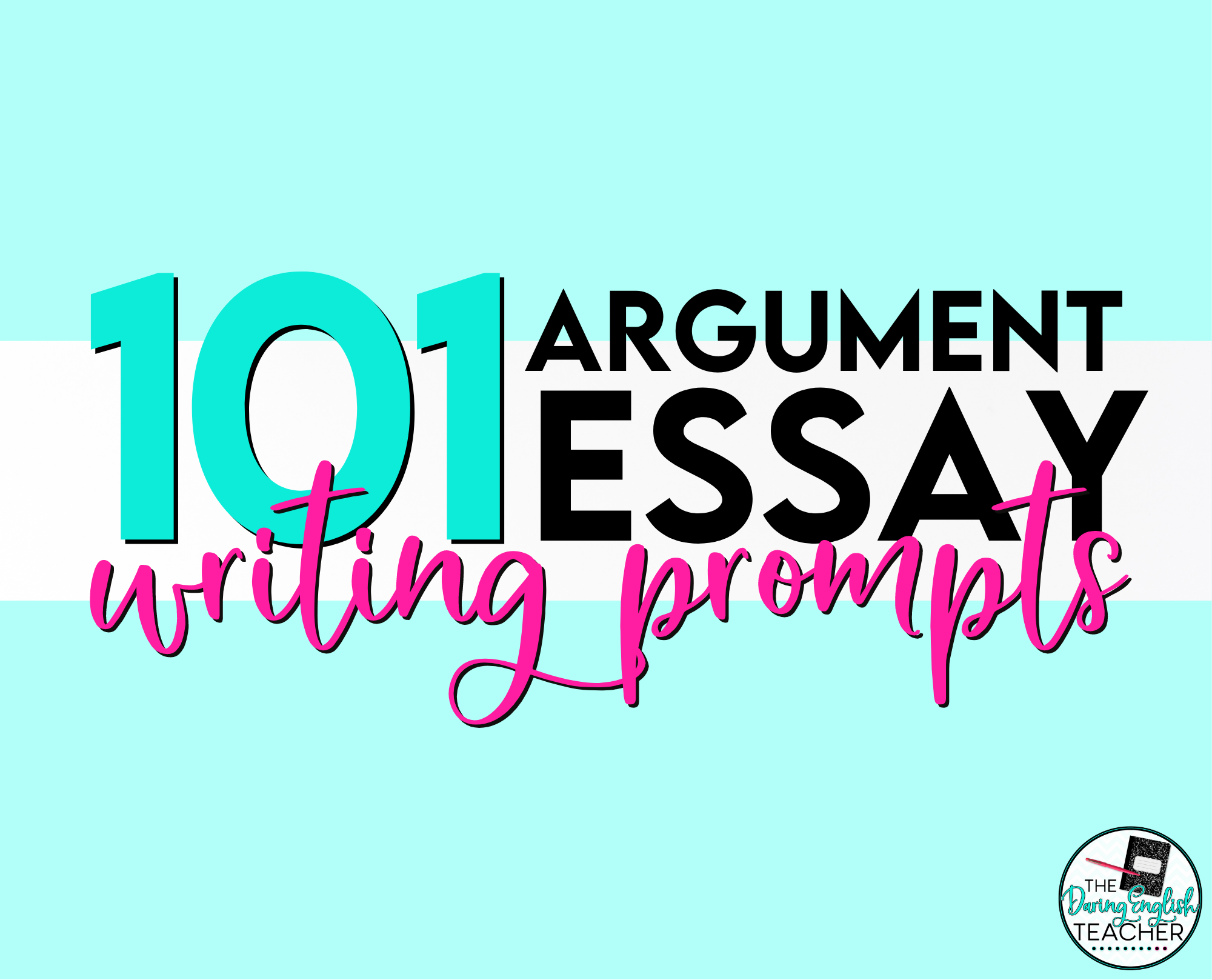
Teaching argument writing can be very exciting, especially if you have great argument essay prompts for your students to choose from. It provides students with an opportunity to explore interesting topics. I give my students choices when I am teaching argument writing in my classroom. Students who select their argument essay prompts are more engaged with and connected to their writing.
When assigning a hot topic or controversial issue argumentative essay, I always let students select a topic. That way, they are more passionate about their writing. However, I also make it clear that their topic cannot be discriminatory or hateful in any way and that they must fund valid and credible evidence to back up their claims. When I do this in the classroom, I also like to make sure that only one student per class has the same topic.
If you are planning an argument or controversial issue essay assignment, here is a list of potential topics you can include in your classroom. If you need teaching materials, this argument writing teaching unit will help you walk your students through the process.
Here are 101 Argument Essay Prompts:
Argument essay topics teens love.
- Should teenagers be allowed to vote in elections?
- Is social media a positive or negative influence on teenagers’ mental health and well-being?
- Should schools have a dress code that is gender-neutral?
- Should teenage drivers be subject to stricter regulations, such as curfews and passenger limits, to reduce accidents and fatalities?
- Is it ethical for teenagers to participate in protests and other forms of civil disobedience?
- Should teenagers have access to birth control and sexual health services?
- Should schools provide more opportunities for creative expression and the arts, or is the focus on STEM subjects more important for future success?
- Should teenagers have their own credit card to establish credit history?
- Should teenagers be allowed to work part-time jobs while in school?
- How important is academic honesty for future success?
Argument Essay Prompts About Technology
- Should social media platforms be held accountable for the spread of fake news?
- Are video games a harmful or beneficial form of entertainment for young people?
- Should schools replace textbooks with tablets and laptops?
- Is technology making us more or less productive in the workplace?
- Should there be stricter regulations on the collection and use of personal data by tech companies?
- Is artificial intelligence a threat to human jobs and job security?
- Should there be limitations on using facial recognition technology by law enforcement agencies?
- Has the internet made us more connected or more isolated from each other?
- Should governments invest more in renewable energy technologies?
- Is technology creating a more unequal society by widening the gap between the rich and the poor?
Argument Essay Topics about the Environment
- Should governments impose stricter regulations on corporations to reduce their carbon footprint?
- Should government agencies regulate residential thermostats?
- Should plastic bags be banned to reduce pollution and protect wildlife?
- Is fracking a viable method of energy production, or does it pose significant risks to the environment and public health?
- Should individuals be encouraged to adopt a plant-based diet to reduce the carbon emissions caused by the meat industry?
- Should the use of pesticides be restricted to protect pollinators and other wildlife?
- Is nuclear energy a viable solution to the world’s energy needs, or does it pose too significant an environmental risk?
- Should governments invest more in renewable energy technologies such as wind and solar power?
- Should individuals and companies be required to pay a carbon tax to encourage them to reduce their carbon emissions?
- Is deforestation a significant contributor to climate change?
Argument Essay Prompts about Entrepreneurship
- Is entrepreneurship a viable path to economic success for individuals and communities?
- Should governments provide more support and incentives for small businesses and startups?
- Is social entrepreneurship a more effective way to address social and environmental challenges than traditional methods?
- Should entrepreneurs be required to consider the environmental impact of their business operations?
- Is it better for entrepreneurs to focus on creating a new product or service, or to improve upon an existing one?
- Should entrepreneurs be required to have a certain level of education or experience before starting a business?
- Is it ethical for entrepreneurs to use investor funding to support a luxurious lifestyle instead of reinvesting in their business?
- Should entrepreneurs be held accountable for the social and environmental impacts of their products or services?
- Should entrepreneurs be allowed to patent ideas and concepts, or should all innovations be open for public use?
- Is the current system of venture capital funding fair and equitable for all entrepreneurs?
Teaching Argument Essay: Instructional Unit

Help your students master the art of argumentative writing with this argument writing teaching unit!
I created this argumentative essay writing teaching unit with secondary ELA students in mind, and it includes step-by-step and engaging writing instructional materials. This argument essay writing unit includes everything you need for a complete argumentative writing instructional unit, including the print & digital materials.
This essay writing instructional unit includes an editable instructional presentation for direct instruction and student resources to help you and your students work through an argument essay.
With a focus on argument writing and informational text, this unit fuses together key ELA standards as it covers the differences between persuasive and argumentative writing. Thus unit also teaches purpose, audience, tone, diction, and the rhetorical triangle.
Argument Essay Topics about Animals
- Should animals be used for scientific research, or are there alternative methods that can be used?
- Should exotic animals be kept as pets?
- Is hunting a legitimate way to control animal populations and manage ecosystems?
- Should animal agriculture be banned or significantly reduced to address concerns about animal welfare, environmental impact, and public health?
- Should circuses and other entertainment venues that feature animal acts be banned to prevent animal abuse and exploitation?
- Is it ethical to use animals for entertainment purposes such as horse racing, dog shows, or bullfighting?
- Should animals have legal rights and be granted personhood, or is that concept reserved only for humans?
- Should zoos and aquariums be banned or improved to better serve the welfare and conservation of the animals they hold?
- Should invasive species be removed from ecosystems?
- Is animal testing justified in developing cosmetic and personal care products?
Argument Essay Prompts about Sports
- Should college athletes be paid for their participation in sports?
- Should high school athletes be excused from certain class assignments?
- Should high school sports be required to prioritize safety over competition, especially in contact sports like football and hockey?
- Is esports a legitimate form of competition?
- Should performance-enhancing drugs be legalized in professional sports?
- Should women’s sports receive the same funding and support as men’s sports?
- Should athletes be allowed to protest social and political issues during games, or should sports be kept separate from politics?
- Should athletes be held to higher standards of conduct and behavior, given their public profile and influence on young people?
- Is it ethical for cities to use taxpayer money to fund sports stadiums and arenas?
- Should high schools drop athletics and solely focus on academics?
Argument Essay Topics about School
- Should schools require students to wear uniforms?
- Is standardized testing an effective way to measure student achievement?
- Should schools offer more vocational training programs to prepare students for the workforce?
- Should schools ban cell phones and other electronic devices?
- Should schools offer more extracurricular activities and sports programs?
- Is it essential for schools to provide sex education to students?
- Should schools be required to offer courses on financial literacy and personal finance management?
- Should schools offer more mental health resources and support to students?
- Should schools offer more diversity and inclusion training for staff and students?
- Should private schools receive tax-payer funding?
Argument Essay Prompts about Teens and Politics
- Should the voting age be lowered to 16 to allow teenagers to have a say in political decisions?
- Is it important for teenagers to be politically engaged and active?
- Should schools offer more civic education and government classes to prepare teenagers for their roles as future voters and leaders?
- Should teenagers be allowed to run for political office?
- Should political parties and candidates specifically target and appeal to teenage voters?
- Should teenagers be allowed to participate in political protests and rallies?
- Is it essential for teenagers to be knowledgeable about political issues and current events?
- Should teenagers be allowed to donate to political campaigns?
- Should schools be required to remain politically neutral and avoid any bias or preference towards certain parties or candidates?
- Should teenagers be encouraged to pursue careers in politics and public service?
Argument Essay Topics about Vehicles
- Should governments promote and subsidize electric cars to reduce carbon emissions and promote sustainability?
- Should autonomous cars be allowed on public roads?
- Should car manufacturers be held responsible for the environmental impact of their products?
- Should speed limits be increased on highways and freeways?
- Should car ownership be discouraged in favor of public transportation and ride-sharing services?
- Should car insurance be mandatory for all drivers?
- Should older cars be banned from the road due to higher emissions and safety risks?
- Should governments invest more in developing and promoting alternative fuels and energy sources for cars?
- Should car manufacturers be required to disclose all safety and performance data about their products?
- Should car-sharing services like Zipcar and Car2Go be encouraged and subsidized by governments?
Argument Essay Prompts about Space and Space Exploration
- Is space exploration worth the cost?
- Should governments fund space exploration and research?
- Is it ethical to mine resources and exploit the commercial potential of other planets?
- Should humans establish permanent settlements on other planets?
- Should space agencies prioritize manned missions to Mars?
- Is space exploration a necessary pursuit for scientific advancement and discovery?
- Should international cooperation be a priority in space exploration?
- Should space tourism be encouraged and expanded?
- Should space debris and junk be regulated and monitored more closely?
- Is space exploration an inherently human endeavor, or should we prioritize the development of AI and robotics to take on the challenges of space exploration and colonization
And lastly, here is my all-time favorite argument essay topic that I use to teach argument writing. I use this topic for all of my instruction, for all of my examples, and for modeling the process to students: who makes the best fast-food cheeseburger?
Need argument essay instructional materials?
My argument writing teaching unit has everything you need to teach your students all about argument writing! You can pair this unit with any of the argument essay prompts on this page, and you will be teaching argument writing in no time!
Join the Daring English Teacher community!
Subscribe to receive freebies, teaching ideas, and my latest content by email.
I won’t send you spam. Unsubscribe at any time.
Built with ConvertKit
Leave a Reply Cancel reply
Your email address will not be published. Required fields are marked *
Save my name, email, and website in this browser for the next time I comment.

SUBSCRIBE NOW
If you're seeing this message, it means we're having trouble loading external resources on our website.
If you're behind a web filter, please make sure that the domains *.kastatic.org and *.kasandbox.org are unblocked.
To log in and use all the features of Khan Academy, please enable JavaScript in your browser.
Praxis Core Writing
Course: praxis core writing > unit 1, argumentative essay | quick guide.
- Source-based essay | Quick guide
- Revision in context | Quick guide
- Within-sentence punctuation | Quick guide
- Subordination and coordination | Quick guide
- Independent and dependent Clauses | Video lesson
- Parallel structure | Quick guide
- Modifier placement | Quick guide
- Shifts in verb tense | Quick guide
- Pronoun clarity | Quick guide
- Pronoun agreement | Quick guide
- Subject-verb agreement | Quick guide
- Noun agreement | Quick guide
- Frequently confused words | Quick guide
- Conventional expressions | Quick guide
- Logical comparison | Quick guide
- Concision | Quick guide
- Adjective/adverb confusion | Quick guide
- Negation | Quick guide
- Capitalization | Quick guide
- Apostrophe use | Quick guide
- Research skills | Quick guide
Argumentative essay (30 minutes)
- states or clearly implies the writer’s position or thesis
- organizes and develops ideas logically, making insightful connections between them
- clearly explains key ideas, supporting them with well-chosen reasons, examples, or details
- displays effective sentence variety
- clearly displays facility in the use of language
- is generally free from errors in grammar, usage, and mechanics
- organizes and develops ideas clearly, making connections between them
- explains key ideas, supporting them with relevant reasons, examples, or details
- displays some sentence variety
- displays facility in the use of language
- states or implies the writer’s position or thesis
- shows control in the organization and development of ideas
- explains some key ideas, supporting them with adequate reasons, examples, or details
- displays adequate use of language
- shows control of grammar, usage, and mechanics, but may display errors
- limited in stating or implying a position or thesis
- limited control in the organization and development of ideas
- inadequate reasons, examples, or details to explain key ideas
- an accumulation of errors in the use of language
- an accumulation of errors in grammar, usage, and mechanics
- no clear position or thesis
- weak organization or very little development
- few or no relevant reasons, examples, or details
- frequent serious errors in the use of language
- frequent serious errors in grammar, usage, and mechanics
- contains serious and persistent writing errors or
- is incoherent or
- is undeveloped or
- is off-topic
How should I build a thesis?
- (Choice A) Kids should find role models that are worthier than celebrities because celebrities may be famous for reasons that aren't admirable. A Kids should find role models that are worthier than celebrities because celebrities may be famous for reasons that aren't admirable.
- (Choice B) Because they profit from the admiration of youths, celebrities have a moral responsibility for the reactions their behaviors provoke in fans. B Because they profit from the admiration of youths, celebrities have a moral responsibility for the reactions their behaviors provoke in fans.
- (Choice C) Celebrities may have more imitators than most people, but they hold no more responsibility over the example they set than the average person. C Celebrities may have more imitators than most people, but they hold no more responsibility over the example they set than the average person.
- (Choice D) Notoriety is not always a choice, and some celebrities may not want to be role models. D Notoriety is not always a choice, and some celebrities may not want to be role models.
- (Choice E) Parents have a moral responsibility to serve as immediate role models for their children. E Parents have a moral responsibility to serve as immediate role models for their children.
How should I support my thesis?
- (Choice A) As basketball star Charles Barkley stated in a famous advertising campaign for Nike, he was paid to dominate on the basketball court, not to raise your kids. A As basketball star Charles Barkley stated in a famous advertising campaign for Nike, he was paid to dominate on the basketball court, not to raise your kids.
- (Choice B) Many celebrities do consider themselves responsible for setting a good example and create non-profit organizations through which they can benefit youths. B Many celebrities do consider themselves responsible for setting a good example and create non-profit organizations through which they can benefit youths.
- (Choice C) Many celebrities, like Kylie Jenner with her billion-dollar cosmetics company, profit directly from being imitated by fans who purchase sponsored products. C Many celebrities, like Kylie Jenner with her billion-dollar cosmetics company, profit directly from being imitated by fans who purchase sponsored products.
- (Choice D) My ten-year-old nephew may love Drake's music, but his behaviors are more similar to those of the adults he interacts with on a daily basis, like his parents and teachers. D My ten-year-old nephew may love Drake's music, but his behaviors are more similar to those of the adults he interacts with on a daily basis, like his parents and teachers.
- (Choice E) It's very common for young people to wear fashions similar to those of their favorite celebrities. E It's very common for young people to wear fashions similar to those of their favorite celebrities.
Want to join the conversation?
- Upvote Button navigates to signup page
- Downvote Button navigates to signup page
- Flag Button navigates to signup page
Help High School Students Grow as Writers with These Argumentative Articles

Dorothy Hodges
Sparking student interest is sometimes best done with a bit of controversy. That’s why we’ve collected some of our most engaging argumentative articles for high school students. Each of these informational texts from our digital literacy program will not only launch a class debate but also serve as an opportunity for students to have fun grappling with relevant topics and argumentative analysis. They also serve as exemplars of great argumentative writing! Do I hear an opinion essay coming?
“ No, Mobile Phones Should Not Be Banned in UK Schools ” by Stephen Corbett (9th grade)
Students will be excited to read this argumentative article claiming that cell phones should be allowed in schools. Poll the class on this topic before and after reading to see if anyone has changed their mind.
This argumentative article for students is a great model of opinion writing. Have students follow the development of the author’s argument through their annotations while reading. This not only supports students reading comprehension, but it will also prepare them for Assessment Question 3, “How does Paragraph 7 develop the idea that mobile devices should be allowed in school?”
“ Life Isn’t Fair - Deal With It ” by Mike Myatt (9th grade)
In this argumentative article, Mike Myatt argues that fairness is actually a subjective idea rather than a natural characteristic of life. Do you agree? Do you think your students will?
Use this argumentative text and reading comprehension lesson as a launchpad for students to write their own opinion essay responding to Discussion Question 2, “The author believes that ‘fairness’ is not a useful term, and that it makes people feel entitled to good outcomes. Make an argument for the opposite - how would you convince someone that the concept of ‘fairness’ is an important one?”
“ Should We Scoff At The Idea Of Love At First Sight? ” by James Kuzner (10th grade)
This spicy opinion piece focuses on the neuroscience of love. It’s also sure to be a relatable and engaging topic to bring your students into a deep analysis of a writer’s argumentative structure.
This is a great text to use as a baseline for extended argumentative writing practice. Ask students to discuss and draft a written response to Discussion Question 2, “Do you think that love at first sight exists in the real world? Why or why not?”
“ Why I Despise the Great Gatsby ” by Kathryn Schulz (11th grade)
In this opinion piece, Author Kathryn Schulz argues why The Great Gatsby isn’t actually all that great of a novel.
After completing the reading comprehension assessment questions from this lesson, use the related media video “ Psychology of Strong Opinions and Social Connections ” to expand student thinking regarding opinions and argument. Ask students to evaluate Kathryn Schulz’s opinion. Is Schulz’s opinion strong? Why or why not? Then, ask students to apply that same evaluation to revise their own opinion writing.
“ The Fallacy Of Success ” by G.K. Chesterson (11th grade)
Some students have very specific ideas of success. This 1915 argumentative article challenges widely-held ideas of success and just may push your students to do the same.
Use the reading assessment questions to push students to support their analysis of Chesterson’s argument with text-specific evidence with Assessment Question 3, which asks how a specific quote from paragraph 4 supports the passage’s central idea.
“ What Adolescents Miss When We Let Them Grow Up In Cyberspace ” by Brent Staples (12th grade)
Today’s students (and many of today’s teachers!) have never lived in a world without the Internet. In this argumentative article , Brent Staples asks readers to consider the ways growing up with such connectivity could impact them as they age.
This is a great text to push students to create their own piece of thoughtful argumentative writing. Use Discussion Question 2 as a writing prompt that must be supported with evidence: “What costs does the author identify of growing up online? Do you agree with the author’s views on the Internet? Why or why not? What benefits do you think the Internet provides teenagers?”
“ Will The ‘Right’ College Major Get You A Job? ” by Glenn Altshuler (12th grade)
Top of mind for many 12th graders, this argumentative article explores whether or not college pays off in the ways it’s advertised to students.
Use the paired text “ Is College Worth It? Is This Even the Right Question? ” by Josipa Roksa and Richard Arum to extend student thinking further. Ask students to compare how both texts explore the differences between the experiences of those with college degrees in the job market and those without degrees? Then ask students to write a response to the same question: Is college worth it?
Want even more argumentative articles that will assist students in crafting their own argumentative writing essays? Check out our Target Lessons for high schoolers.
If you are an administrator looking to leverage CommonLit in your school or district, our partnerships team can help. We offer benchmark assessments, professional learning and more!
Chat with CommonLit
CommonLit’s team will reach out with more information on our school and district partnerships.

High School Essay
High school essay generator.
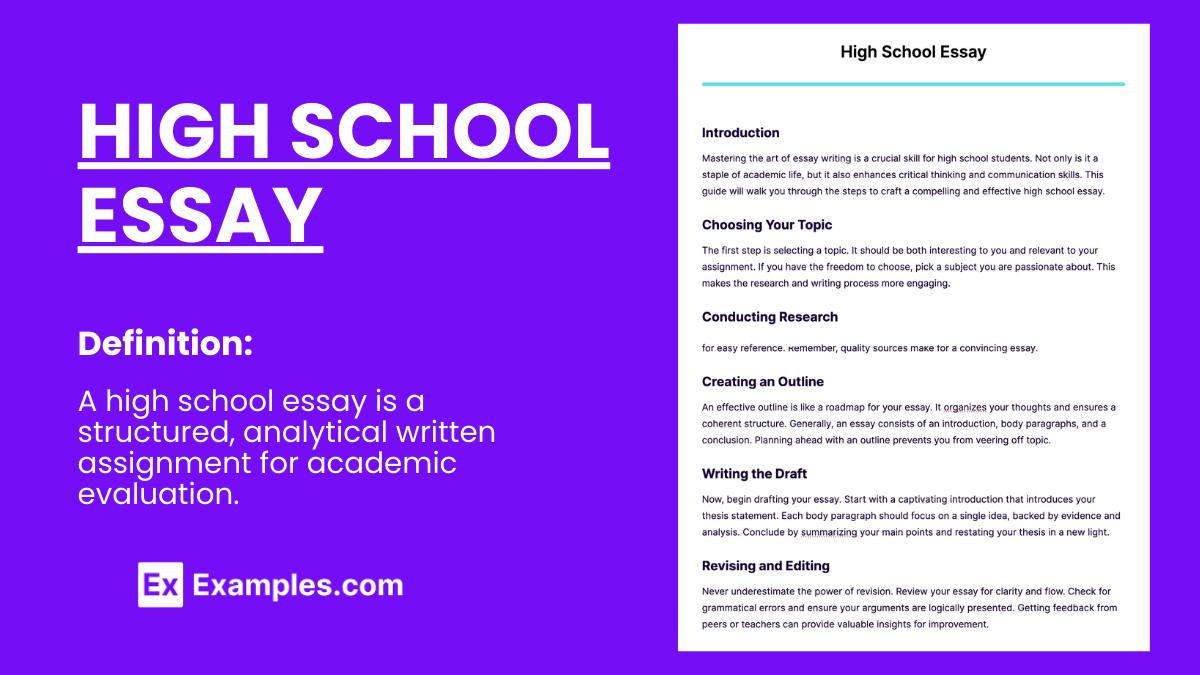
Navigating the complexities of High School Essay writing can be a challenging yet rewarding experience. Our guide, infused with diverse essay examples , is designed to simplify this journey for students. High school essays are a crucial part of academic development, allowing students to express their thoughts, arguments, and creativity. With our examples, students learn to structure their essays effectively, develop strong thesis statements, and convey their ideas with clarity and confidence, paving the way for academic success.
What Is a High School Essay? A high school essay is anything that falls between a literary piece that teachers would ask their students to write. It could be anything like an expository essay , informative essay , or a descriptive essay . High school essay is just a broad term that is used to describe anything that high school student writes, probably in subjects like English Grammar or Literature.
It is a good way to practice every student’s writing skills in writing which they might find useful when they reach college. Others might even be inspired to continue writing and take courses that are related to it.
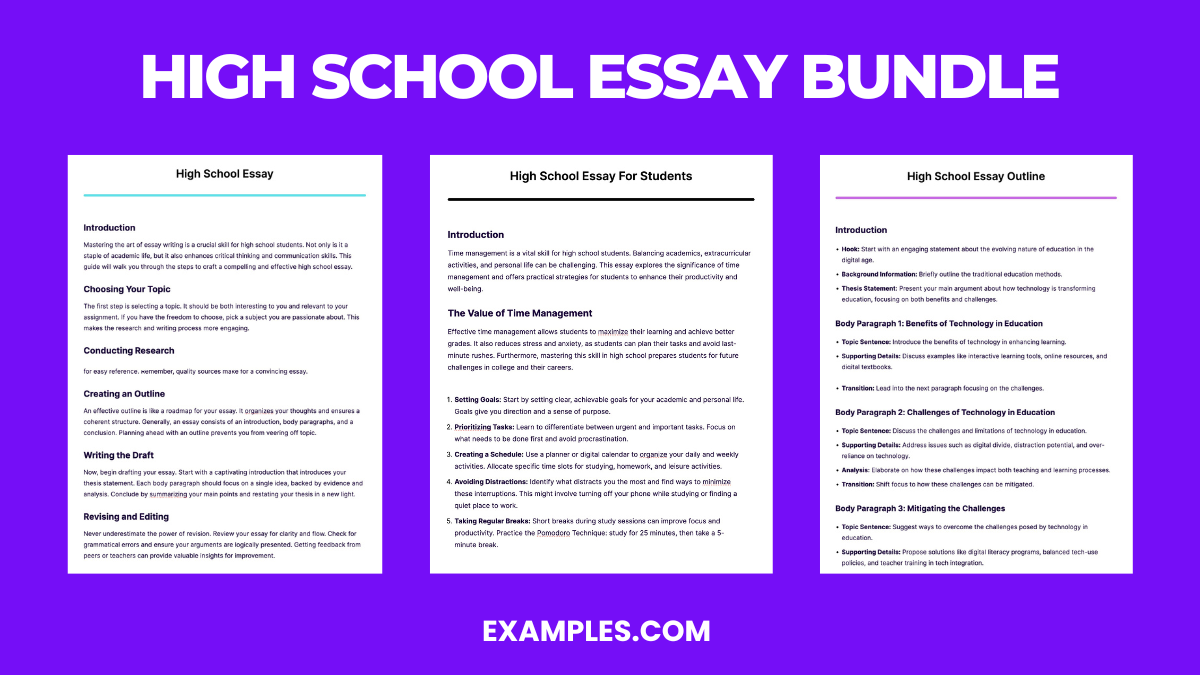
Download High School Essay Bundle
When you are in high school, it is definite that you are expected to do some write-ups and projects which require pen and paper. Yes. You heard that right. Your teachers are going to let you write a lot of things starting from short stories to other things like expository essays. However, do not be intimidated nor fear the things that I have just said. It is but a normal part of being a student to write things. Well, take it from me. As far as I can recall, I may have written about a hundred essays during my entire high school years or maybe more. You may also see what are the parts of an essay?
High School Essay Format
1. introduction.
Hook: Start with an engaging sentence to capture the reader’s interest. This could be a question, a quote, a surprising fact, or a bold statement related to your topic. Background Information: Provide some background information on your topic to help readers understand the context of your essay. Thesis Statement: End the introduction with a clear thesis statement that outlines your main argument or point of view. This statement guides the direction of your entire essay.
2. Body Paragraphs
Topic Sentence: Start each body paragraph with a topic sentence that introduces the main idea of the paragraph, supporting your thesis statement. Supporting Details: Include evidence, examples, facts, and quotes to support the main idea of each paragraph. Make sure to explain how these details relate to your topic sentence and thesis statement. Analysis: Provide your analysis or interpretation of the evidence and how it supports your argument. Be clear and concise in explaining your reasoning. Transition: Use transition words or phrases to smoothly move from one idea to the next, maintaining the flow of your essay.
3. Conclusion
Summary: Begin your conclusion by restating your thesis in a new way, summarizing the main points of your body paragraphs without introducing new information. Final Thoughts: End your essay with a strong closing statement. This could be a reflection on the significance of your argument, a call to action, or a rhetorical question to leave the reader thinking.
Example of High School Essay
Community service plays a pivotal role in fostering empathy, building character, and enhancing societal well-being. It offers a platform for young individuals to contribute positively to society while gaining valuable life experiences. This essay explores the significance of community service and its impact on both individuals and communities. Introduction Community service, an altruistic activity performed for the betterment of society, is a cornerstone for personal growth and societal improvement. It not only addresses societal needs but also cultivates essential virtues in volunteers. Through community service, high school students can develop a sense of responsibility, a commitment to altruism, and an understanding of their role in the community. Personal Development Firstly, community service significantly contributes to personal development. Volunteering helps students acquire new skills, such as teamwork, communication, and problem-solving. For instance, organizing a local food drive can teach students project management skills and the importance of collaboration. Moreover, community service provides insights into one’s passions and career interests, guiding them towards fulfilling future endeavors. Social Impact Secondly, the social impact of community service cannot be overstated. Activities like tutoring underprivileged children or participating in environmental clean-ups address critical societal issues directly. These actions not only bring about immediate positive changes but also inspire a ripple effect, encouraging a culture of volunteerism within the community. The collective effort of volunteers can transform neighborhoods, making them more supportive and resilient against challenges. Building Empathy and Understanding Furthermore, community service is instrumental in building empathy and understanding. Engaging with diverse groups and working towards a common goal fosters a sense of solidarity and compassion among volunteers. For example, spending time at a senior center can bridge the generational gap, enriching the lives of both the elderly and the volunteers. These experiences teach students the value of empathy, enriching their emotional intelligence and social awareness. In conclusion, community service is a vital component of societal development and personal growth. It offers a unique opportunity for students to engage with their communities, learn valuable life skills, and develop empathy. Schools and parents should encourage students to participate in community service, highlighting its benefits not only to the community but also in shaping responsible, caring, and informed citizens. As we look towards building a better future, the role of community service in education cannot be overlooked; it is an investment in our collective well-being and the development of the next generation.
Essay Topics for High School with Samples to Edit & Download
- Should schools have dress codes?
- Sex education in middle school
- Should homework be abolished?
- College education costs
- How does technology affect productivity?
- Is climate change reversible?
- Is social media helpful or harmful?
- Climate change is caused by humans
- Effects of social media on youth
- Are men and women treated equally?
- Are professional athletes overpaid?
- Changes over the past decade
- Guns should be more strictly regulated
- My favorite childhood memory
- Religion in school
- Should we stop giving final exams?
- Video game addiction
- Violence in media content
High School Essay Examples & Templates
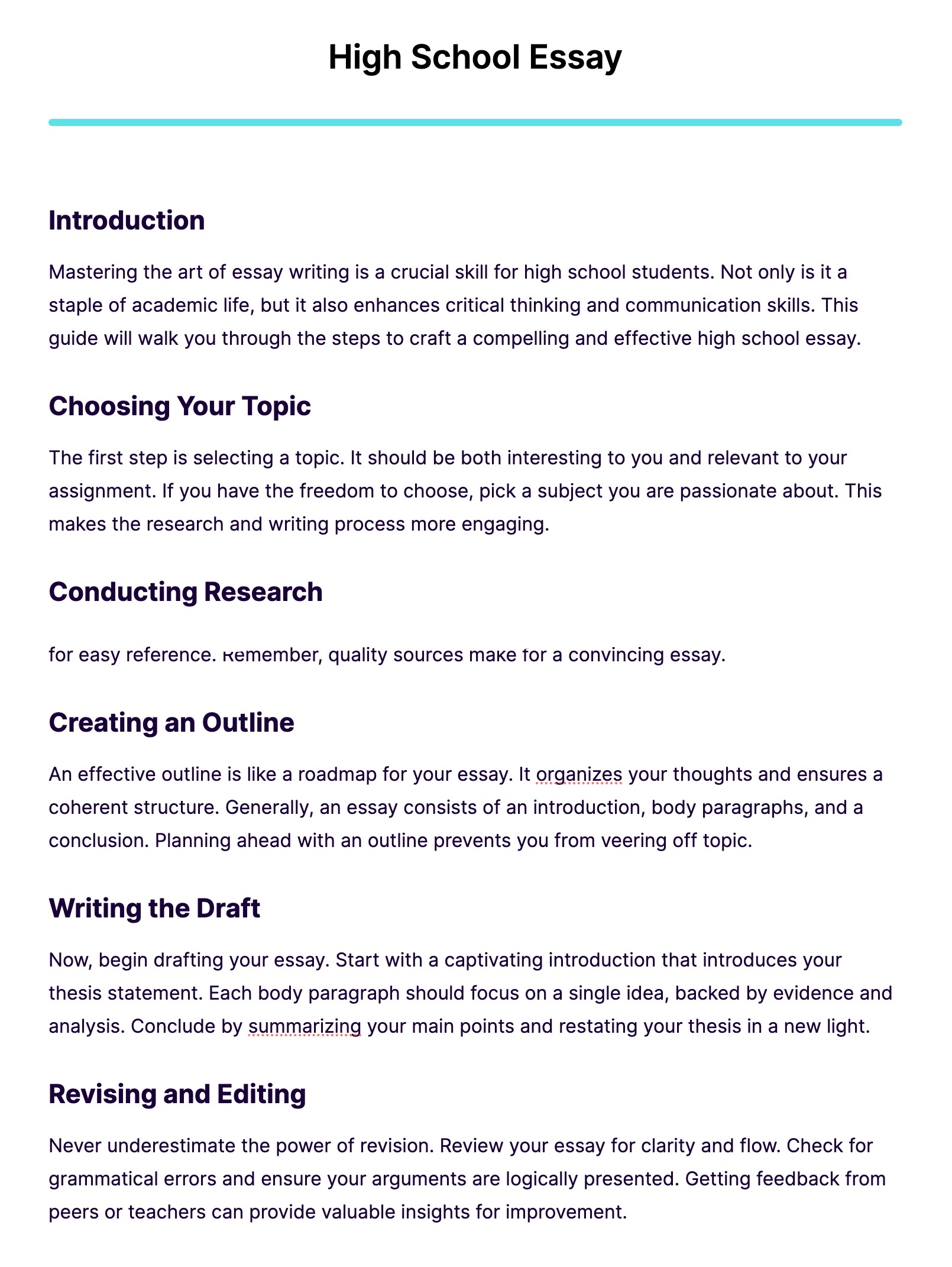
Free Download
High School Essay For Students
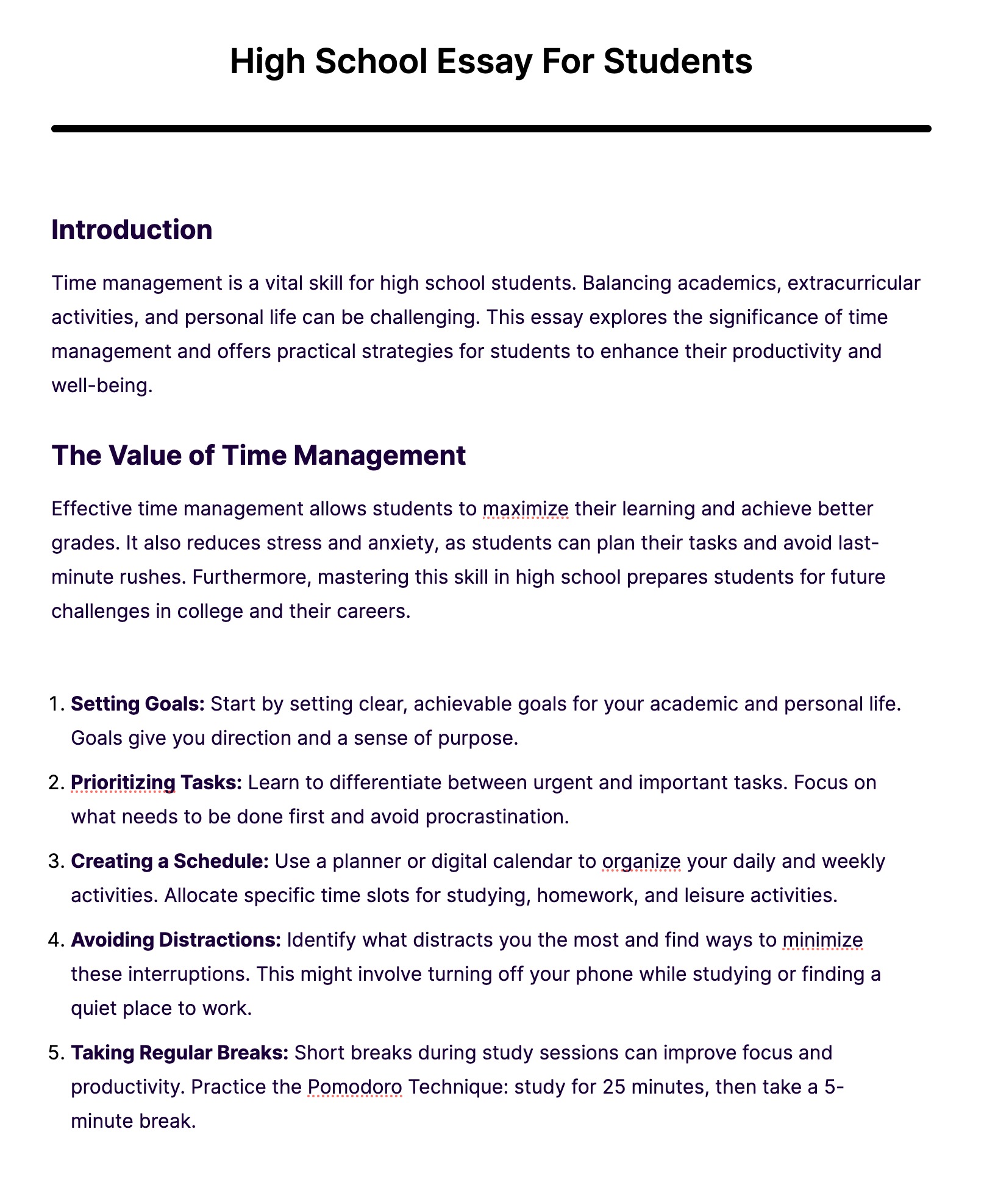
High School Essay Outline
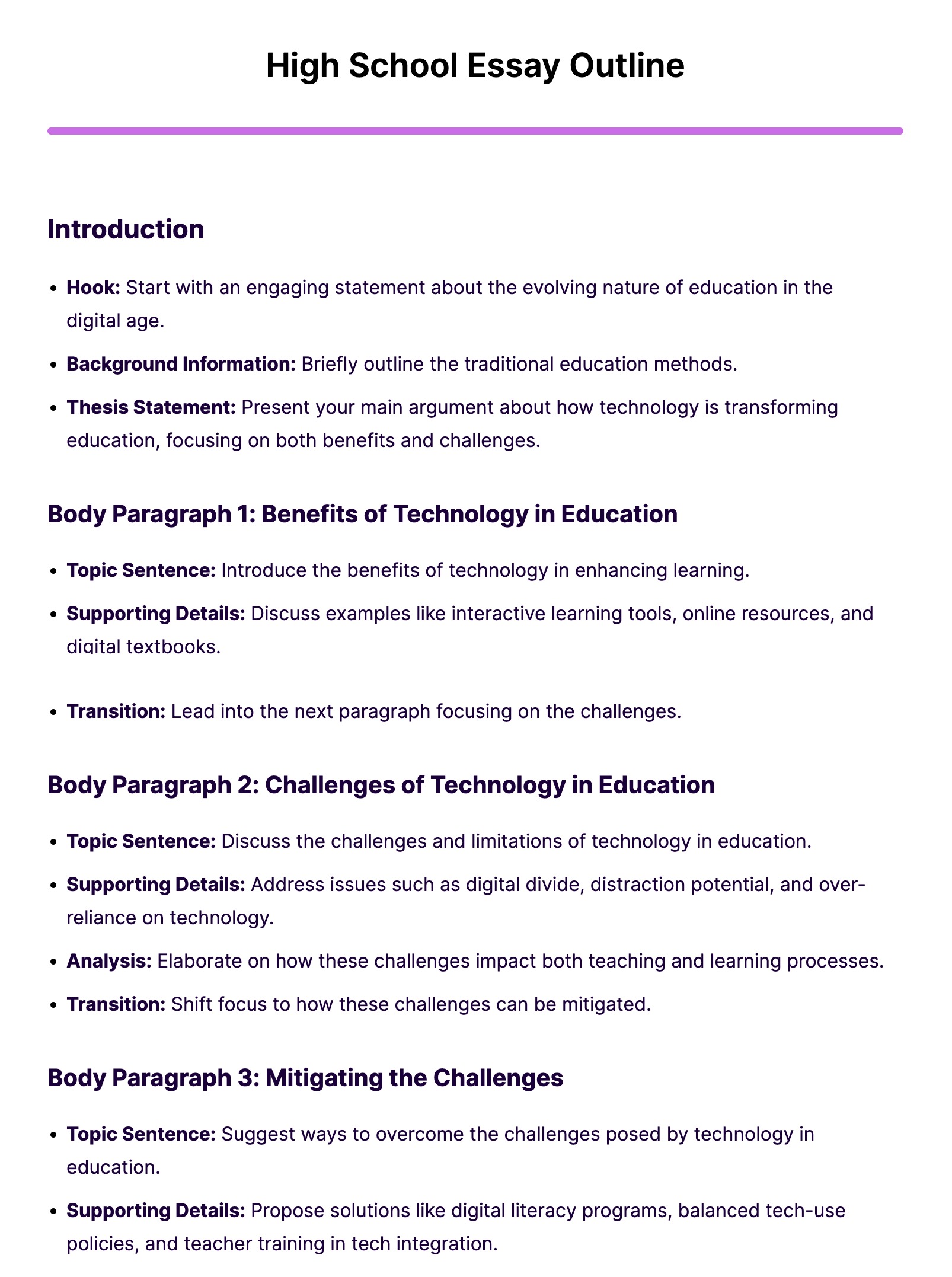
High School Essay Example
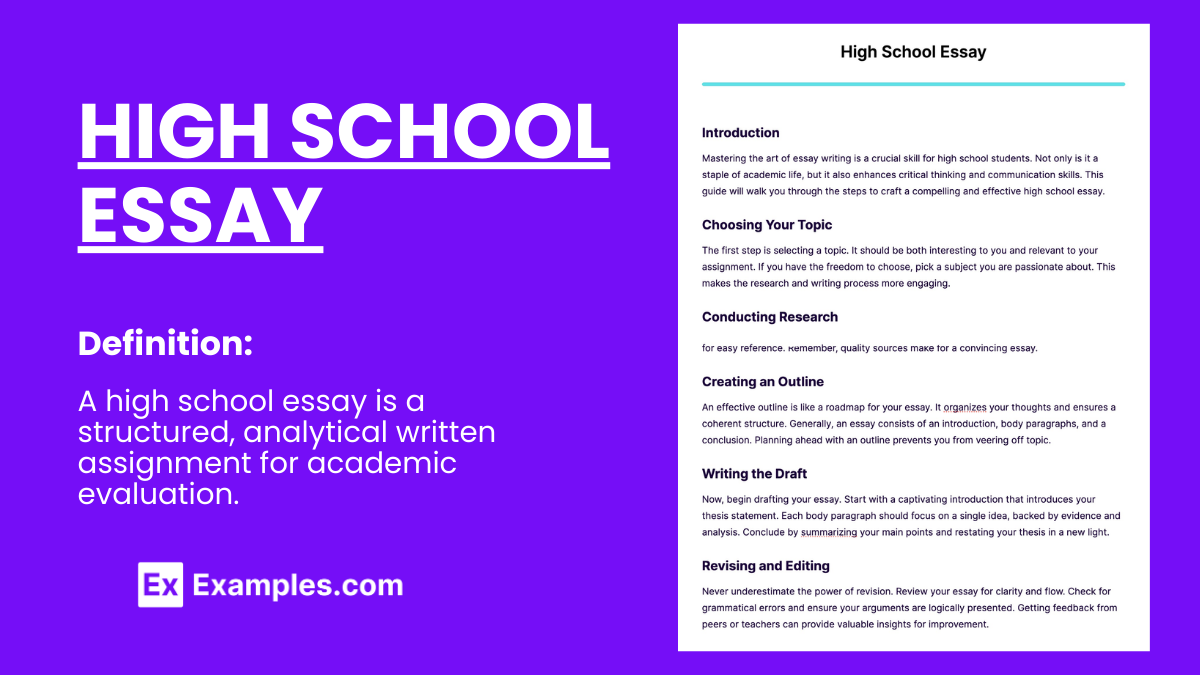
High School Self Introduction Essay Template
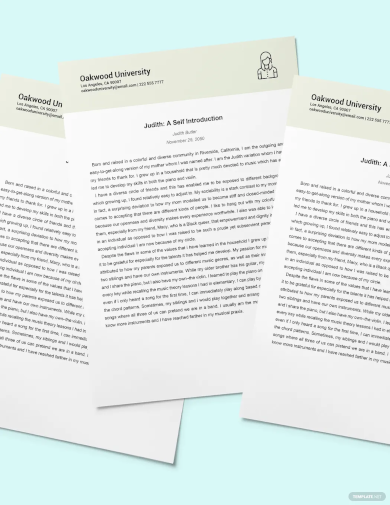
High School Student Essay

englishdaily626.com
Reflective High School
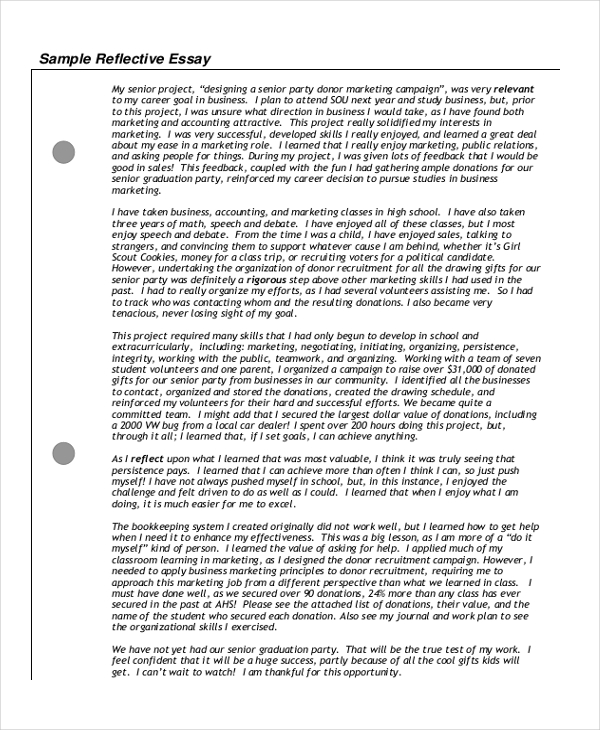
oregoncis.uoregon.edu
Argumentative Essays for High School
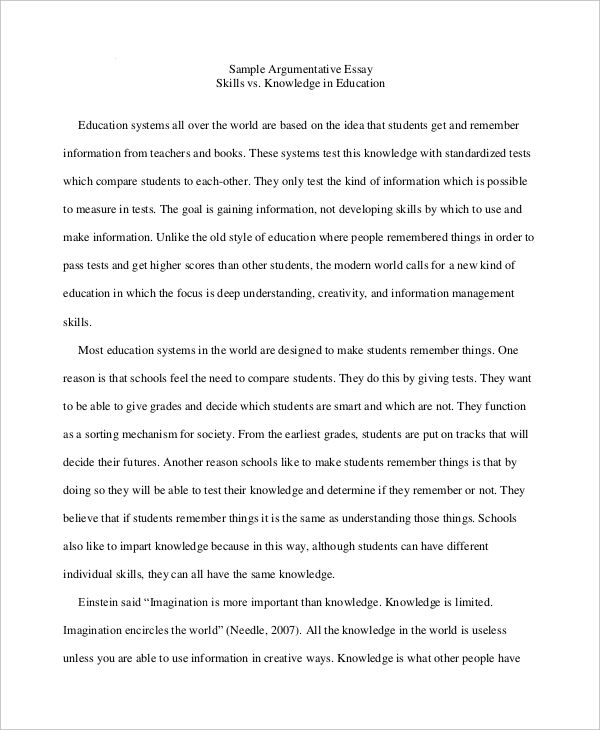
Informative Essays for High School
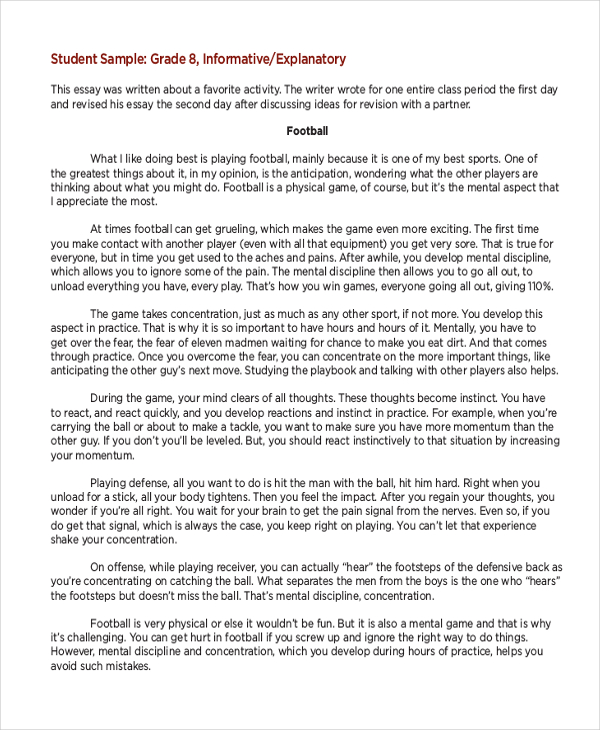
High School Persuasive
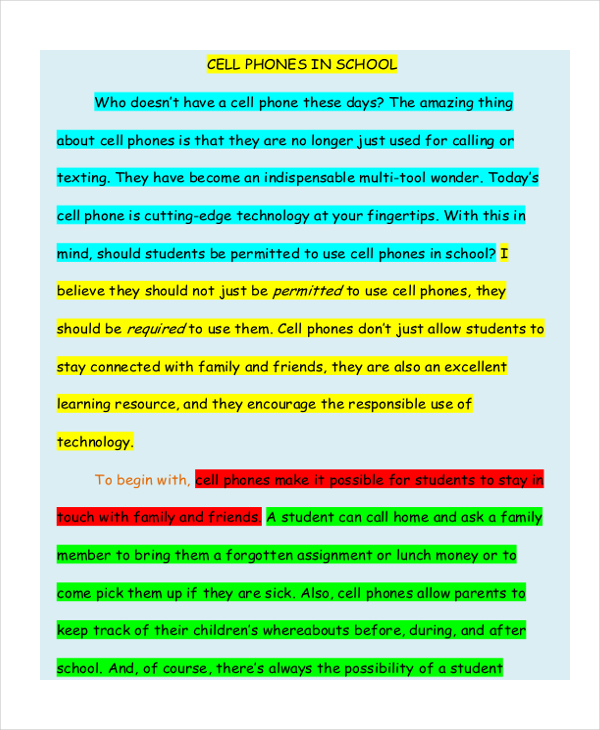
writecook.com
Narrative Essays
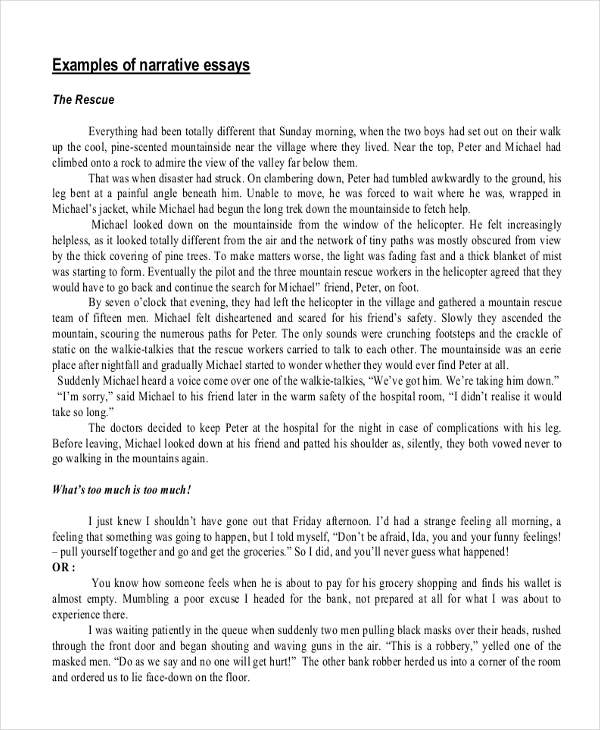
Scholarship Essays

High School Application
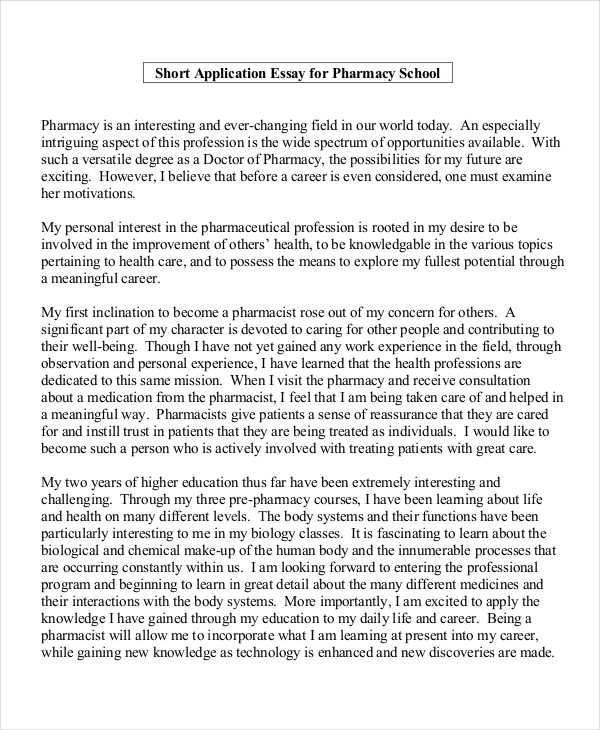
e-education.psu.edu
High School Graduation Essay
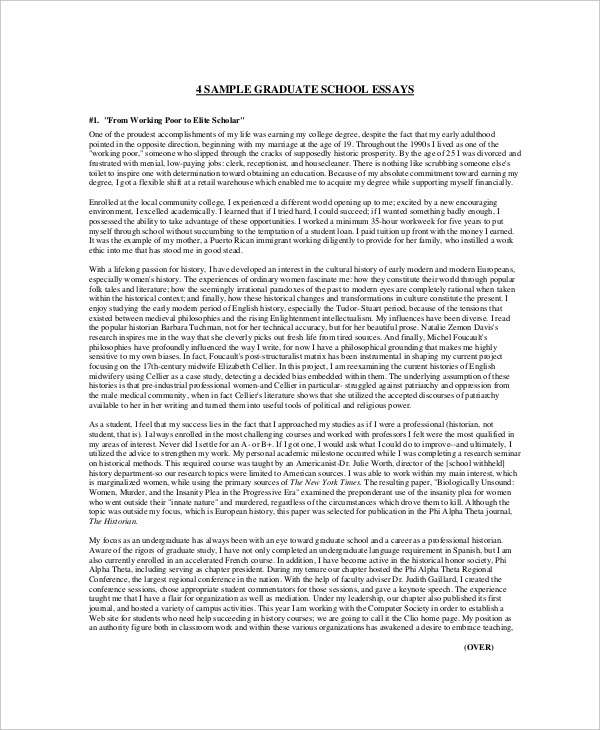
High School Leadership Essay
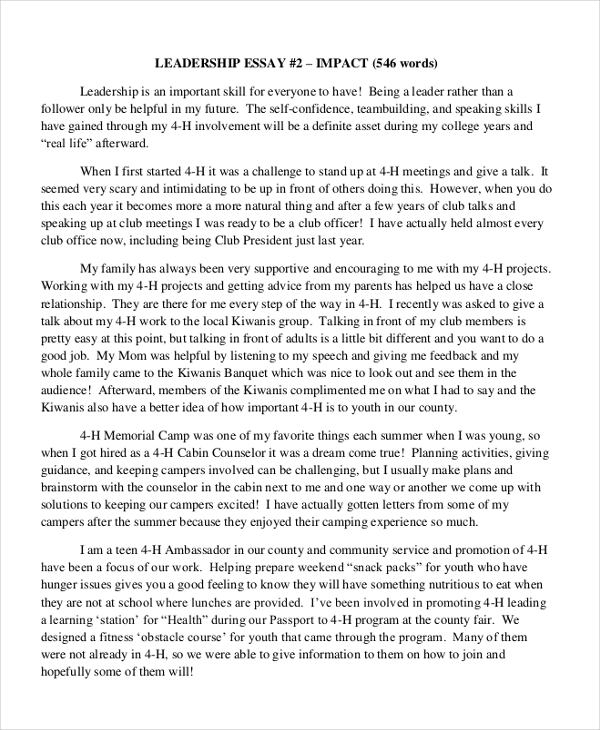
web.extension.illinois.edu
How to Write a High School Essay
Some teachers are really not that strict when it comes to writing essay because they too understand the struggles of writing stuff like these. However, you need to know the basics when it comes to writing a high school essay.
1. Understand the Essay Prompt
- Carefully read the essay prompt or question to understand what’s required. Identify the type of essay (narrative, persuasive, expository, etc.) and the main topic you need to address.
2. Choose a Topic
- If the topic isn’t provided, pick one that interests you and fits the essay’s requirements. Make sure it’s neither too broad nor too narrow.
3. Conduct Research (if necessary)
- For expository, argumentative, or research essays, gather information from credible sources to support your arguments. Take notes and organize your findings.
4. Create an Outline
- Outline your essay to organize your thoughts and structure your arguments effectively. Include an introduction, body paragraphs, and a conclusion.
5. Write the Introduction
- Start with a hook to grab the reader’s attention (a quote, a question, a shocking fact, etc.). Introduce your topic and end the introduction with a thesis statement that presents your main argument or purpose.
6. Develop Body Paragraphs
- Each body paragraph should focus on a single idea or argument that supports your thesis. Start with a topic sentence, provide evidence or examples, and explain how it relates to your thesis.
7. Write the Conclusion
- Summarize the main points of your essay and restate your thesis in a new way. Conclude with a strong statement that leaves a lasting impression on the reader.
Types of High School Essay
1. narrative essay.
Narrative essays tell a story from the writer’s perspective, often highlighting a personal experience or event. The focus is on storytelling, including characters, a setting, and a plot, to engage readers emotionally. This type allows students to explore creativity and expressiveness in their writing.
2. Descriptive Essay
Descriptive essays focus on detailing and describing a person, place, object, or event. The aim is to paint a vivid picture in the reader’s mind using sensory details. These essays test the writer’s ability to use language creatively to evoke emotions and bring a scene to life.
3. Expository Essay
Expository essays aim to explain or inform the reader about a topic in a clear, concise manner. This type of essay requires thorough research and focuses on factual information. It’s divided into several types, such as compare and contrast, cause and effect, and process essays, each serving a specific purpose.
4. Persuasive Essay
Persuasive essays aim to convince the reader of a particular viewpoint or argument. The writer must use logic, reasoning, and evidence to support their position while addressing counterarguments. This type tests the writer’s ability to persuade and argue effectively.
5. Analytical Essay
Analytical essays require the writer to break down and analyze an element, such as a piece of literature, a movie, or a historical event. The goal is to interpret and make sense of the subject, discussing its significance and how it achieves its purpose.
6. Reflective Essay
Reflective essays are personal pieces that ask the writer to reflect on their experiences, thoughts, or feelings regarding a specific topic or experience. It encourages introspection and personal growth by examining one’s responses and learning from them.
7. Argumentative Essay
Similar to persuasive essays, argumentative essays require the writer to take a stance on an issue and argue for their position with evidence. However, argumentative essays place a stronger emphasis on evidence and logic rather than emotional persuasion.
8. Research Paper
Though often longer than a typical essay, research papers in high school require students to conduct in-depth study on a specific topic, using various sources to gather information. The focus is on presenting findings and analysis in a structured format.
Tips for High School Essays
Writing a high school essay if you have the tips on how to do essay effectively . This will give you an edge from your classmates.
- Stay Organized: Keep your notes and sources well-organized to make the writing process smoother.
- Be Clear and Concise: Avoid overly complex sentences or vocabulary that might confuse the reader.
- Use Transitions: Ensure that your paragraphs and ideas flow logically by using transition words and phrases.
- Cite Sources: If you use direct quotes or specific ideas from your research, make sure to cite your sources properly to avoid plagiarism.
- Practice: Like any skill, essay writing improves with practice. Don’t hesitate to write drafts and experiment with different writing styles.
Importance of High School Essay
Aside from the fact that you will get reprimanded for not doing your task, there are more substantial reasons why a high school essay is important. First, you get trained at a very young age. Writing is not just for those who are studying nor for your teachers. As you graduate from high school and then enter college (can see college essays ), you will have more things to write like dissertations and theses.
At least, when you get to that stage, you already know how to write. Aside from that, writing high essays give a life lesson. That is, patience and resourcefulness. You need to find the right resources for your essay as well as patience when finding the right inspiration to write.
How long is a high school essay?
A high school essay typically ranges from 500 to 2000 words, depending on the assignment’s requirements and the subject matter.
How do you start a personal essay for high school?
Begin with an engaging hook (an anecdote, quote, or question) that introduces your theme or story, leading naturally to your thesis or main point.
What makes a good high school essay?
A good high school essay features a clear thesis, coherent structure, compelling evidence, and personal insights, all presented in a polished, grammatically correct format.
Text prompt
- Instructive
- Professional
Write a High School Essay on the importance of participating in sports.
Discuss the role of student government in high schools in a High School Essay.
3 Argumentative Essay Examples for High school
Simple Argumentative Essay Example for High school # 1:
Topic: Should High School Students Have Homework Over the Weekend?
Thesis Statement: The practice of educational institutes assigning homework to high school students is a debatable issue and must be evaluated extensively to take into account the potential benefits of reinforcing the concepts and striking a balance to respect personal space of the students.
Are you looking for ways of how to go about writing a simple argumentative essay? Worry not, you will find a lot of free argumentative essay examples for high school over the internet. To facilitate you, this is a simple argumentative essay example for high school that would work as a guide for you to write one.

Homework is one such topic in the educational settings and households that is a continuous debate. Of all the issues that revolve around the topic of homework, one particularly stands out: whether or not high school students are burdened with homework and assignments over the weekend?
This essay would take into account a series of comprehensive arguments that are in favor of the idea that students should be given homework and assignments over the weekend.
Maintains Momentum and Academic Continuity
Assigning homework over the weekend is crucial to maintain the momentum of study and academic continuity. It is a fact that learning is continuous, not stagnant. The learning process is not bound by strict schedules. The objective behind educators assigning homework over the weekend is to revise and retain the knowledge that they have gained during the week.
Reinforcement is a crucial step for retention of knowledge and maintaining academic momentum. Once the students have done the revision over the weekend, they will be better prepared to absorb new information the following week.
Homework is always an opportunity for the student to review, practice and validate the concepts that they have learned so far. When they revisit the class material taught during the week over the weekend they are more likely to remember the concepts with better understanding. Such good retention of concepts will ultimately lead to good performance in the tests and the exams.
Improves Time Management
Weekend homework is pivotal to practice time management if you struggle with it. Given the fast-paced world, time management is a life skill that everyone should learn and value. With weekend homework, students learn to allocate time to different activities scheduled for the weekend such as studying, extracurricular activities and for enjoyment. This skill once learned would not only help students with their academic life but is a step up in their professional lives as well. This helps them in multitasking, handling responsibilities and meeting deadlines.
High school students have busy lives and hectic schedules. During the week they attend lectures, participate in extracurricular activities and of course need some time to themselves to relax and socialize. It may sound easy, but juggling between their tasks and responsibilities can be overwhelming. So when the weekend arrives, doing homework seems like a manageable task where students can allocate some of their time to revising concepts.
However, when assignments are given to students that are due over the weekend, they are faced with a realistic deadline where they need to prioritize. They need to decide how they want to manage time from Friday through Sunday. If the assignment is complex in nature, it may require more time, so they learn how to manage their time accordingly. By doing so, the students learn to structure their days in the most efficient manner so that they make time for both study and leisure. This habit of time management converts to a skill when used in practical life, other than the academic engagements.
As they gain experience, students get better at handling different tasks without feeling burdened or overwhelmed. Weekend homework when judiciously done does not only benefit academically, but it acts as a foundation to becoming responsible, organized and effective time managers. Navigating through these small assignment tasks, students learn to smoothly sail through their busy lives and step into the practical world with confidence.
Responsibility and Accountability
Another key advantage of weekend homework for high school students is that it instills a sense of responsibility and accountability. This too, like the above mentioned factors is not limited to academic success only but once learned, serves as life skills that go beyond the settings of a classroom.
When the students are assigned work to be completed over the weekend, they are entrusted with a responsibility which they are obligated to fulfill in the most efficient manner to meet the deadlines. Trust plays a pivotal role here because it puts responsibility on the student to take ownership and complete the work. This sense of responsibility and ownership is a powerful motivator for the students to teach them accountability for their academic progress.
As students learn to manage the workload of assignments and homework over the weekend, they also learn to be accountable for the results, good or bad. They learn that their actions have real life consequences and rewards which go beyond the boundaries of a classroom that they are solely responsible for in case of failure or success, respectively.
Another key learning point for students is their ability to work independently. In a classroom, there is a teacher to monitor and guide whereas weekend homework is self regulated. Students learn to organize their homework, get the necessary material and complete the assignment as per the given instructions. This approach is key to instill self-reliance into students.
Improved Performance
Weekend homework plays a crucial role in boosting the academic performance of high school students. When students get homework for the weekend, they get the opportunity to practice and reinforce the learnings through the week. This practice is directly linked to improved performance in class with better test scores and overall class achievements.
One of the major advantages of weekend homework is that students get a chance to revisit their lectures of the preceding week and consolidate the knowledge. When the students touch base with the material learned in the past week they get to reinforce their concepts, understand them better and retain the information for the long term in their minds. The concepts that seemed challenging during the week can become rather easy with practice over the weekend. This way, the students also prepare themselves for the coming week and are better equipped to participate in class discussions, engage in complex topics and achieve high scores in assignments.
Also, revisiting the lesson material over the weekend gives students a chance to highlight topics that they find challenging or are struggling to complete. In such a scenario where the student has difficulty completing the task, they can seek additional support from their teachers, peers or educational resources for better clarity. This way the student learns to address their fear and understand that they can overcome these difficulties by putting in the right effort with the right resources.
Research shows that the students who complete their homework assigned over the weekend are more capable of performing better in class. They tend to score higher on tests because they have developed a better understanding of the subject matter which leads to enhanced performance overall. It is wise to consider weekend homework as a valuable extension of practice that provides students with an opportunity to level up in their studies.
Preparation for the Future
Weekend homework offers immediate academic benefits, but it also plays a significant role in prepping high school students for the challenges they will be faced with in the future. The skills and lessons that they learn through the weekend homework is not confined to the class only but in fact go way beyond to help them get over challenges that the future beholds.
1. Manage Time Efficiently
As mentioned earlier, weekend homework helps students to better navigate through their time, which is a skill that is significant to be successful in any field. Students who are capable of managing time efficiently can handle complex tasks and difficult situations in college, workplace or personal life.
2. Discipline and Responsibility
Weekend homework instills a sense of discipline and responsibility, students learn to work around commitments and meet deadlines. This sense of responsibility once gained goes beyond the high school years and comes in handy when these students step into the professional life where they have to meet project deadlines and fulfill professional obligations.
3. Ability To Seek Support
There are a lot of times when a student faces academic challenges, it is very important to seek support when needed. Stepping into the future, these students will become professional individuals who would need to collaborate with peers and seek guidance from seniors, so this ability to seek support would help them overcome obstacles and challenges. High school students who have been trained to seek assistance when they were assigned weekend homeworks are in a better position to navigate through similar situations when faced with them as adults.
4. Critical Thinking and Problem Solving
Weekend homework is also known to encourage students to become critical thinkers and problem solvers. Students need to apply knowledge and skills to think creatively and solve problems independently. Once developed, these critical thinking skills are a key asset in solving real-life problems both personally and professionally.
5. Strong Work Ethic
Weekend homework fosters a strong work ethic where students realize that in order to succeed in life, consistency and perseverance is key. Students who develop a strong work ethic in high school are able to achieve goals in a timely manner and excel in any field, be it the pursuit of higher education, exploring the job market or achieving personal goals.
Counterargument and Rebuttal
In any argumentative essay, it is key to consider counterarguments. When you present the reader with a clear and persuasive perspective, acknowledging the opposing views simultaneously effectively arguing them would make your argument powerful overall. Counter Arguments are a sign that you have thoroughly researched the topic and have weighed in the advantages and disadvantages. This not only improves credibility but also helps appeal to a broader audience, including the ones with opposing views.
In this argumentative essay example for high school students, the benefits of the weekend homework are explained in detail. It is also important to take into account the opposing view that high school students should also be exposed to a homework-free weekend to relax and enjoy. There is no argument against taking some time off, how important it is to relax and give your mind some homework free time. The key to achieving that is moderation. Homework for the weekend should be meticulously designed in such a manner that it does not overwhelm the students and they do not feel burdened. The weekend homework should focus on manageable assignments so that they are able to smoothly balance work and leisure.
It’s a Wrap!
Finally, it can be concluded that weekend homework for high school students is a valuable practice that has a lot of advantages for students. This practice ensures consistent learning with time management skills, being responsible and accountable for enhanced academic performance.
Although relaxing is important, striking a balance over the weekend with some homework is a smart approach to make sure that the students gradually equip themselves with key skills for a better academic and professional future. This practice will make these students become more capable individuals who strive for success in a responsible manner since they equip themselves to cater the challenges and opportunities alike in the future. Consider the weekend homework as a training ground to prepare the high school students for the professional world.
Fun Argumentative Essay Example for High school # 2:
Topic: The Case for Adding More Enjoyment to High School
A fun-tastic argument.
Thesis Statement: High school should be a fun-tastic experience that is a blend of learning and enjoyment as learning in an fun environment improves student engagement and enhances the overall academic performance and well-being of the students.
Introduction

High school has always been known as an educational platform loaded with heavy textbooks and exhausting schedules. It may seem like a place that is scarce in fun activities and is short on enjoyment. What if we were to argue that making high school fun and enjoyable would actually be good for learning, promote well-being and help achieve higher grades?
This is a fun argumentative essay example for high school, which will act as a sample to guide you so that you can write one yourself. In this essay, we will argue and make a compelling case for why high school should be inclined towards fun and enjoyment.
- Reconnecting with the Joy of Learning
High school should be a place where students should be eagerly waiting to attend the classes. Letting go of the traditional teaching methodologies, the joy of learning can be instilled in students by teaching them with more zeal, where lessons are more interactive and the curriculum is more engaging. By making learning fun, students will be encouraged to be more active and take interest in their education actively.
Research shows that students who learn through fun are more capable of retaining the information. May it be exploring the literature world through dramatic role plays, gaining hands-on experience with science experiments or using educational aids such as the abacus to make Mathematics fun, the element of enjoyment will always foster the love for learning.
Reduction in Stress and Anxiety
The students of this era face immense pressure and stress primarily because of the fast paced world and partly due to the academic expectation in high school where competition is fierce. By introducing fun elements, students would get the much needed relief from the stress that has been piling up for years.
High school students must be equipped with resources and techniques to manage anxiety. Teaching how to be mindful of things is one way to go about relieving stress. By becoming a place of comfort and solace, quality time spent at high school can allow students to pursue their passion.
Nurture Creativity Through Fun Learning
Creativity thrives in a fun learning environment, high school should not be limited to academic subjects strictly but in fact it should focus on creative subjects as well such as arts, theater, sports, music and related extracurricular activities. Providing high school students with opportunities of learning with fun and then encouraging them to participate leads to well rounded education and personal growth. When the students get a chance to express themselves through creative ways, they become more invested and confident.
Fostering Social Bonds
High school is an amazing platform to build social skills and friendships. The friends you make and the peers you study with today will be professionally placed in different fields and positions tomorrow. So the contacts you make during this period would help expand your social circle in the future. And it’s always good to have contacts in multiple places.
In high school when students are exposed to the opportunity of participating in different extracurricular activities, the students get to connect with one another over shared interests. Numerous clubs, sports, historic role plays, art classes and drama serve as a platform where friendships are forged in a supportive environment.
Preparing for a Balanced Life
Life is not about work and responsibilities, it also needs some joy and contentment. High school is an ideal place where students can be introduced to the phenomenon and are educated about the significance of balance in life. When the school promotes enjoyment, they teach students a life skill, how to find joy in life, while working and while relaxing. The high school students learn how to balance the responsibilities.
Counterargument | The Value of Rigor and Discipline in High School
While advocating for joy seems fun in high school, it is imperative to consider the counterargument that high school’s primary focus should be on a discipline that is needed for a well-rounded education.
Preparing for the Real World
High school is a stepping stone for college that is crucial for when you enter the professional world and get a chance to manage the workforce. It is important to equip the students with time management skills, should be aware of how to be disciplined and should have a strong grip on work ethics. These skills and qualities are important to be successful in the practical world.
Challenging Academics Build Resilience
The challenges that high school presents in academics helps students build resilience and encourage problem solving skills. While enjoyment has its own space in life, it should not overshadow the importance of the curriculum that is designed to prepare students for the practical world where college or the workplace is more demanding.
Encourage Responsibility
Sense of responsibility is something that is taught to students early in life, high school is an ideal time to do so. The students should learn how to balance between fun and responsibility, they should be aware of the fact that whatever they do their actions will have consequences which they have to face as an individual.
Competitiveness and Standardized Testing
The educational landscape today is extremely competitive give the standard tests and college admission criteria. High school is a stage where students are prepared and equipped with knowledge to take these challenges head on. This can only be achieved if we stress upon the significance of commitment and dedication.
Finding Enjoyment within Challenges
There are ways to steer through academic challenges and have fun as well. High school educators can incorporate creative ways of teaching and introduce related projects and assignments within the curriculum without compromising on the rigorous studies.
The Final Say
High school should strike a balance between academics and enjoyment. As much as fun and creativity are good for a healthy mind, they cannot overshadow the learning of life skills such as discipline, responsibility and work ethics.
The case in argument to add more fun to the high school is not frivolous but the need of the modern educational system. High school should be a place of joy where students are nurtured and prepared to face the challenges in life, but teaching their minds to be reactive and build a social circle is equally important.
The solution is to go with a well rounded high school curriculum that equip the students to navigate smoothly through the complexities of the world. By making the high school experience fun and memorable, we not only prepare them for the challenges of the future but teach them the importance of cherishing the present as well.
Education should be a wonderful and delightful journey. It’s high time we understand that and make high school a fun-tastic place for the students to learn, grow and find joy in every moment.
Short Argumentative Essay Example for High school # 3:
Topic: The Impact of Social Media on High School Students
Balancing Connectivity and Well-Being
Thesis Statement: The social media has impacted the high school students as a double-edged sword that benefits the youth with unparalleled connectivity while challenging their individuality by influencing their interpersonal relationships and affecting their self-esteem and mental health.
In the modern era today, teenagers have been greatly influenced by social media. Social media has immense exposure, it is a

platform where diverse people connect, express themselves, and exchange information. Social media has its benefits but the influence it has on the emotional and mental being of high school students has raised quite a lot of concerns.
This is a short argumentative essay example for high school students and the influential role that social media play in their lives. Getting a grip on the complex dynamics of social media and its popularity amongst teenagers is imperative to strike a balance and instill healthy relationships with such empowering online platforms.
Connectivity and Community Building
Social media acts as a bridge between high school students and the global community. Social media platforms such as Snapchat, Instagram, TikTok and Facebook provide teenagers with an opportunity to connect with like minded people, share common interests and build a supportive community. This sense of belonging to a community allows high school students to engage in meaningful discussions to make a difference in the world surrounding them, positively.
Influence on Mental Health
There is no doubt that social media builds connections, but it also puts a lot of pressure on the brains of these high school students with such fast paced connectivity, their brains are not ready yet which is why it takes a toll on their mental health. The fear of missing out (FOMO) on things contribute to low self-esteem, self-doubt, depression and anxiety amongst teenagers. This is why it is significant to take into account the negative impact of social media and encourage healthy behavior online.
Educational and Informative Platforms
Social media is extremely powerful, it is not about leisure only, it is an educational tool, if used correctly it is very beneficial. Educational platforms such as YouTube offer valuable information, tutorials and knowledge about different subjects. High school students can use these resources to broaden their knowledge, explore diverse views and have access to educational material that helps them in their academic learning, growth and intellect.
Cyberbullying and Online Harassment
The feature of anonymity that social media provides may lead to a toxic environment where harassment and cyberbullying thrives. High school students are naive and may fall victim to cyberbullying leading to emotional distress, isolation and self-harm in extreme cases. It is vital to have online safety measures in place where these teenagers can seek support when faced with a difficult situation such as online harassment or abuse.
Addictive Nature
The way social media is designed is very addictive, the likes, the comments, the notifications keep the users engaged and interested. High school students are quite prone to this addiction since they spend hours scrolling through their feed. This addiction disrupts the routines, negatively affects the academic progress and contributes to a sedentary lifestyle.
Establishing healthy screen-time limits and engaging high school students in offline activities such as sports or having hobbies can help balance the virtual and the real world.
When teenages navigate through the social media world , they require healthy boundaries and a balance between academics, connectivity, safety and mental well-being. By keeping in view the positive and the negative effects of social media, high school students can be mindful of how they want to engage online and benefit from the digital world that encourages creativity and inclusivity.
There are several examples of argumentative essays for high school and each would educate you about the pros and cons of social media. It is essential to proceed with caution because while it has numerous advantages such as connectivity it can also impact the safety of high school students by invasion of privacy.

Izzah Ahmed
This is Izzah, a content writer and editor who creates SEO-friendly content and has experience in academic writing. Backed by 10 years of experience in writing and editing, she is equipped with the skill to create content that is backed by thorough research and has impeccable structure.
Related Posts
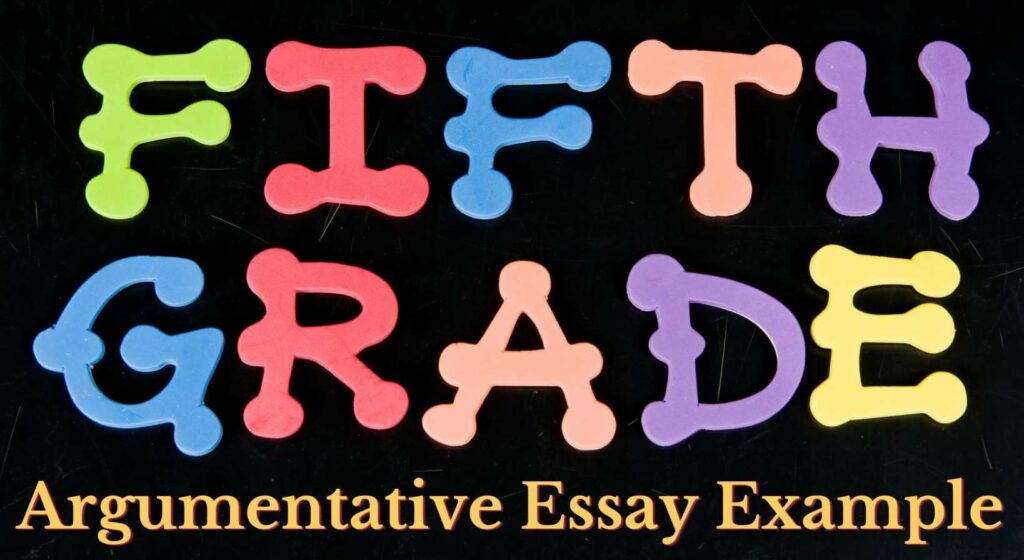
5th Grade Argumentative Essay Example
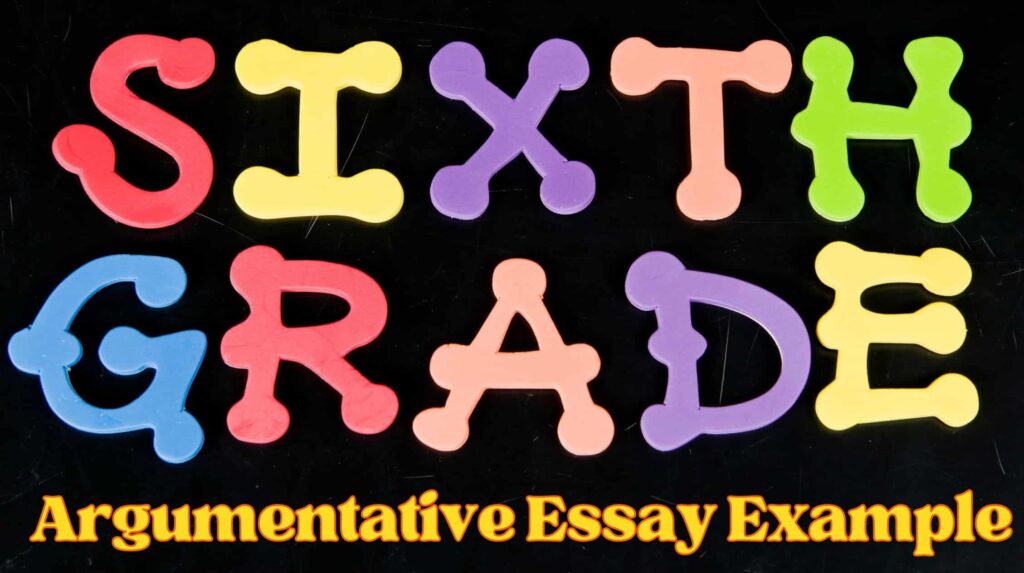
6th Grade Argumentative Essay Example
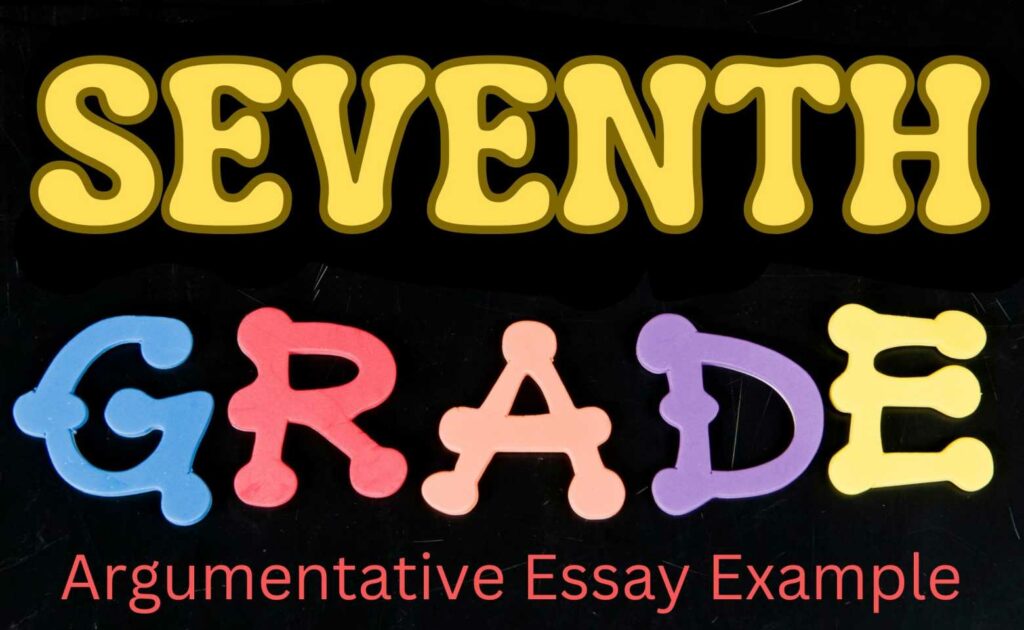
7th Grade Argumentative Essay Example
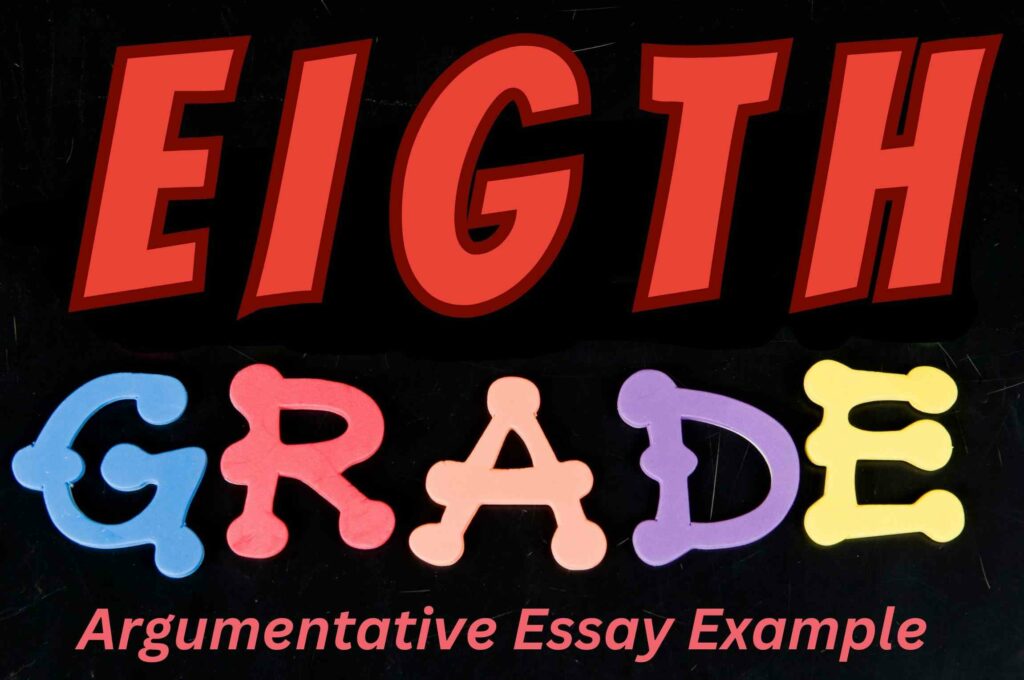
8th Grade Argumentative Essay Example

9th Grade Argumentative Essay Example
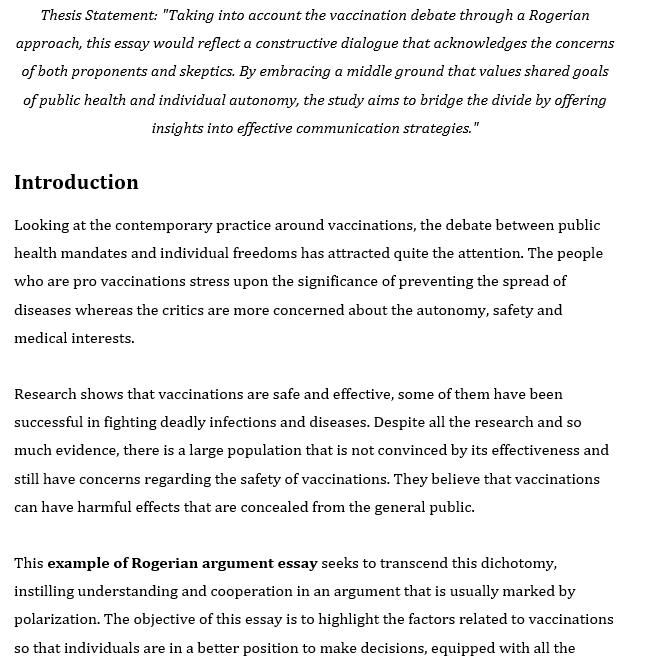
The Vaccination Debate | A Rogerian Approach
Leave a comment cancel reply.
Your email address will not be published. Required fields are marked *
Save my name, email, and website in this browser for the next time I comment.
Are you seeking one-on-one college counseling and/or essay support? Limited spots are now available. Click here to learn more.
160 Good Argumentative Essay Topics for Students in 2024
April 3, 2024
The skill of writing an excellent argumentative essay is a crucial one for every high school or college student to master. In sum, argumentative essays teach students how to organize their thoughts logically and present them in a convincing way. This skill is helpful not only for those pursuing degrees in law , international relations , or public policy , but for any student who wishes to develop their critical thinking faculties. In this article, we’ll cover what makes a good argument essay and offer several argumentative essay topics for high school and college students. Let’s begin!
What is an Argumentative Essay?
An argumentative essay is an essay that uses research to present a reasoned argument on a particular subject . As with the persuasive essay , the purpose of an argumentative essay is to sway the reader to the writer’s position. However, a strong persuasive essay makes its point through diligent research and emotion while a strong argumentative essay should be based solely on facts, not feelings.
Moreover, each fact should be supported by clear evidence from credible sources . Furthermore, a good argumentative essay will have an easy-to-follow structure. When organizing your argumentative essay, use this format as a guide:
- Introduction
- Supporting body paragraphs
- Paragraph(s) addressing common counterarguments
Argumentative Essay Format
In the introduction , the writer presents their position and thesis statement —a sentence that summarizes the paper’s main points. The body paragraphs then draw upon supporting evidence to back up this initial statement, with each paragraph focusing on its own point. The length of your paper will determine the amount of examples you need. In general, you’ll likely need at least two to three. Additionally, your examples should be as detailed as possible, citing specific research, case studies, statistics, or anecdotes.
In the counterargument paragraph , the writer acknowledges and refutes opposing viewpoints. Finally, in the conclusion , the writer restates the main argument made in the thesis statement and summarizes the points of the essay. Additionally, the conclusion may offer a final proposal to persuade the reader of the essay’s position.
How to Write an Effective Argumentative Essay, Step by Step
- Choose your topic. Use the list below to help you pick a topic. Ideally, a good argumentative essay topic will be meaningful to you—writing is always stronger when you are interested in the subject matter. In addition, the topic should be complex with plenty of “pro” and “con” arguments. Avoid choosing a topic that is either widely accepted as fact or too narrow. For example, “Is the earth round?” would not be a solid choice.
- Research. Use the library, the web, and any other resources to gather information about your argumentative essay topic. Research widely but smartly. As you go, take organized notes, marking the source of every quote and where it may fit in the scheme of your larger essay. Moreover, remember to look for (and research) possible counterarguments.
- Outline . Using the argument essay format above, create an outline for your essay. Then, brainstorm a thesis statement covering your argument’s main points, and begin to put your examples in order, focusing on logical flow. It’s often best to place your strongest example last.
- Write . Draw on your research and outline to create a first draft. Remember, your first draft doesn’t need to be perfect. (As Voltaire says, “Perfect is the enemy of good.”) Accordingly, just focus on getting the words down on paper.
- Does my thesis statement need to be adjusted?
- Which examples feel strongest? Weakest?
- Do the transitions flow smoothly?
- Do I have a strong opening paragraph?
- Does the conclusion reinforce my argument?
Tips for Revising an Argument Essay
Evaluating your own work can be difficult, so you might consider the following strategies:
- Read your work aloud to yourself.
- Record yourself reading your paper, and listen to the recording.
- Reverse outline your paper. Firstly, next to each paragraph, write a short summary of that paragraph’s main points/idea. Then, read through your reverse outline. Does it have a logical flow? If not, where should you adjust?
- Print out your paper and cut it into paragraphs. What happens when you rearrange the paragraphs?
Good Argumentative Essay Topics for Middle School, High School, and College Students
Family argumentative essay topics.
- Should the government provide financial incentives for families to have children to address the declining birth rate?
- Should we require parents to provide their children with a certain level of nutrition and physical activity to prevent childhood obesity?
- Should parents implement limits on how much time their children spend playing video games?
- Should cell phones be banned from family/holiday gatherings?
- Should we hold parents legally responsible for their children’s actions?
- Should children have the right to sue their parents for neglect?
- Should parents have the right to choose their child’s religion?
- Are spanking and other forms of physical punishment an effective method of discipline?
- Should courts allow children to choose where they live in cases of divorce?
- Should parents have the right to monitor teens’ activity on social media?
- Should parents control their child’s medical treatment, even if it goes against the child’s wishes?
- Should parents be allowed to post pictures of their children on social media without their consent?
- Should fathers have a legal say in whether their partners do or do not receive an abortion?
- Can television have positive developmental benefits on children?
- Should the driving age be raised to prevent teen car accidents?
- Should adult children be legally required to care for their aging parents?
Education Argument Essay Topics
- Should schools ban the use of technology like ChatGPT?
- Are zoos unethical, or necessary for conservation and education?
- To what degree should we hold parents responsible in the event of a school shooting?
- Should schools offer students a set number of mental health days?
- Should school science curriculums offer a course on combating climate change?
- Should public libraries be allowed to ban certain books? If so, what types?
- What role, if any, should prayer play in public schools?
- Should schools push to abolish homework?
- Are gifted and talented programs in schools more harmful than beneficial due to their exclusionary nature?
- Should universities do away with Greek life?
- Should schools remove artwork, such as murals, that some perceive as offensive?
- Should the government grant parents the right to choose alternative education options for their children and use taxpayer funds to support these options?
- Is homeschooling better than traditional schooling for children’s academic and social development?
- Should we require schools to teach sex education to reduce teen pregnancy rates?
- Should we require schools to provide sex education that includes information about both homosexual and heterosexual relationships?
- Should colleges use affirmative action and other race-conscious policies to address diversity on campus?
- Should public schools remove the line “under God” from the Pledge of Allegiance?
- Should college admissions officers be allowed to look at students’ social media accounts?
- Should schools abolish their dress codes, many of which unfairly target girls, LGBTQ students, and students of color?
- Should schools be required to stock free period products in bathrooms?
- Should legacy students receive preferential treatment during the college admissions process?
- Are school “voluntourism” trips ethical?
Government Argumentative Essay Topics
- Should the U.S. decriminalize prostitution?
- Should the U.S. issue migration visas to all eligible applicants?
- Should the federal government cancel all student loan debt?
- Should we lower the minimum voting age? If so, to what?
- Should the federal government abolish all laws penalizing drug production and use?
- Should the U.S. use its military power to deter a Chinese invasion of Taiwan?
- Should the U.S. supply Ukraine with further military intelligence and supplies?
- Should the North and South of the U.S. split up into two regions?
- Should Americans hold up nationalism as a critical value?
- Should we permit Supreme Court justices to hold their positions indefinitely?
- Should Supreme Court justices be democratically elected?
- Is the Electoral College still a productive approach to electing the U.S. president?
- Should the U.S. implement a national firearm registry?
- Is it ethical for countries like China and Israel to mandate compulsory military service for all citizens?
- Should the U.S. government implement a ranked-choice voting system?
- Should institutions that benefited from slavery be required to provide reparations?
- Based on the 1619 project, should history classes change how they teach about the founding of the U.S.?
- Should term limits be imposed on Senators and Representatives? If so, how long?
- Should women be allowed into special forces units?
- Should the federal government implement stronger, universal firearm licensing laws?
- Do public sex offender registries help prevent future sex crimes?
- Should the government be allowed to regulate family size?
- Should all adults legally be considered mandated reporters?
- Should the government fund public universities to make higher education more accessible to low-income students?
- Should the government fund universal preschool to improve children’s readiness for kindergarten?
Health/Bioethics Argumentative Essay Topics
- Should the U.S. government offer its own healthcare plan?
- In the case of highly infectious pandemics, should we focus on individual freedoms or public safety when implementing policies to control the spread?
- Should we legally require parents to vaccinate their children to protect public health?
- Is it ethical for parents to use genetic engineering to create “designer babies” with specific physical and intellectual traits?
- Should the government fund research on embryonic stem cells for medical treatments?
- Should the government legalize assisted suicide for terminally ill patients?
- Should organ donation be mandatory?
- Is cloning animals ethical?
- Should cancer screenings start earlier? If so, what age?
- Is surrogacy ethical?
- Should birth control require a prescription?
- Should minors have access to emergency contraception?
- Should hospitals be for-profit or nonprofit institutions?
Good Argumentative Essay Topics — Continued
Social media argumentative essay topics.
- Should the federal government increase its efforts to minimize the negative impact of social media?
- Do social media and smartphones strengthen one’s relationships?
- Should antitrust regulators take action to limit the size of big tech companies?
- Should social media platforms ban political advertisements?
- Should the federal government hold social media companies accountable for instances of hate speech discovered on their platforms?
- Do apps such as TikTok and Instagram ultimately worsen the mental well-being of teenagers?
- Should governments oversee how social media platforms manage their users’ data?
- Should social media platforms like Facebook enforce a minimum age requirement for users?
- Should social media companies be held responsible for cases of cyberbullying?
- Should the United States ban TikTok?
- Is social media harmful to children?
- Should employers screen applicants’ social media accounts during the hiring process?
Religion Argument Essay Topics
- Should religious institutions be tax-exempt?
- Should religious symbols such as the hijab or crucifix be allowed in public spaces?
- Should religious freedoms be protected, even when they conflict with secular laws?
- Should the government regulate religious practices?
- Should we allow churches to engage in political activities?
- Religion: a force for good or evil in the world?
- Should the government provide funding for religious schools?
- Is it ethical for healthcare providers to deny abortions based on religious beliefs?
- Should religious organizations be allowed to discriminate in their hiring practices?
- Should we allow people to opt out of medical treatments based on their religious beliefs?
- Should the U.S. government hold religious organizations accountable for cases of sexual abuse within their community?
- Should religious beliefs be exempt from anti-discrimination laws?
- Should religious individuals be allowed to refuse services to others based on their beliefs or lifestyles? (As in this famous case .)
- Should the US ban religion-based federal holidays?
- Should public schools be allowed to teach children about religious holidays?
Science Argument Essay Topics
- Would the world be safer if we eliminated nuclear weapons?
- Should scientists bring back extinct animals? If so, which ones?
- Should we hold companies fiscally responsible for their carbon footprint?
- Should we ban pesticides in favor of organic farming methods?
- Should the federal government ban all fossil fuels, despite the potential economic impact on specific industries and communities?
- What renewable energy source should the U.S. invest more money in?
- Should the FDA outlaw GMOs?
- Should we worry about artificial intelligence surpassing human intelligence?
- Should the alternative medicine industry be more stringently regulated?
- Is colonizing Mars a viable option?
- Is the animal testing worth the potential to save human lives?
Sports Argument Essay Topics
- Should colleges compensate student-athletes?
- How should sports teams and leagues address the gender pay gap?
- Should youth sports teams do away with scorekeeping?
- Should we ban aggressive contact sports like boxing and MMA?
- Should professional sports associations mandate that athletes stand during the national anthem?
- Should high schools require their student-athletes to maintain a certain GPA?
- Should transgender athletes compete in sports according to their gender identity?
- Should schools ban football due to the inherent danger it poses to players?
- Should performance-enhancing drugs be allowed in sports?
- Do participation trophies foster entitlement and unrealistic expectations?
- Should sports teams be divided by gender?
- Should professional athletes be allowed to compete in the Olympics?
- Should women be allowed on NFL teams?
Technology Argumentative Essay Topics
- Should sites like DALL-E compensate the artists whose work it was trained on?
- Should the federal government make human exploration of space a more significant priority?
- Is it ethical for the government to use surveillance technology to monitor citizens?
- Should websites require proof of age from their users? If so, what age?
- Should we consider A.I.-generated images and text pieces of art?
- Does the use of facial recognition technology violate individuals’ privacy?
- Is online learning as effective as in-person learning?
- Does computing harm the environment?
- Should buying, sharing, and selling collected personal data be illegal?
- Are electric cars really better for the environment?
- Should car companies be held responsible for self-driving car accidents?
- Should private jets be banned?
- Do violent video games contribute to real-life violence?
Business Argument Essay Topics
- Should the U.S. government phase out the use of paper money in favor of a fully digital currency system?
- Should the federal government abolish its patent and copyright laws?
- Should we replace the Federal Reserve with free-market institutions?
- Is free-market ideology responsible for the U.S. economy’s poor performance over the past decade?
- Will cryptocurrencies overtake natural resources like gold and silver?
- Is capitalism the best economic system? What system would be better?
- Should the U.S. government enact a universal basic income?
- Should we require companies to provide paid parental leave to their employees?
- Should the government raise the minimum wage? If so, to what?
- Should antitrust regulators break up large companies to promote competition?
- Is it ethical for companies to prioritize profits over social responsibility?
- Should gig-economy workers like Uber and Lyft drivers be considered employees or independent contractors?
- Should the federal government regulate the gig economy to ensure fair treatment of workers?
- Should the government require companies to disclose the environmental impact of their products?
- Should companies be allowed to fire employees based on political views or activities?
- Should tipping practices be phased out?
- Should employees who choose not to have children be given the same amount of paid leave as parents?
- Should MLMs (multi-level marketing companies) be illegal?
- Should employers be allowed to factor tattoos and personal appearance into hiring decisions?
In Conclusion – Argument Essay Topics
Using the tips above, you can effectively structure and pen a compelling argumentative essay that will wow your instructor and classmates. Remember to craft a thesis statement that offers readers a roadmap through your essay, draw on your sources wisely to back up any claims, and read through your paper several times before it’s due to catch any last-minute proofreading errors. With time, diligence, and patience, your essay will be the most outstanding assignment you’ve ever turned in…until the next one rolls around.
Looking for more fresh and engaging topics for use in the classroom? You might consider checking out the following:
- 125 Good Debate Topics for High School Students
- 150 Good Persuasive Speech Topics
- 7 Best Places to Study
- Guide to the IB Extended Essay
- How to Write the AP Lang Rhetorical Analysis Essay
- AP Lit Reading List
- How to Write the AP Lang Synthesis Essay
- 49 Most Interesting Biology Research Topics
- High School Success
Lauren Green
With a Bachelor of Arts in Creative Writing from Columbia University and an MFA in Fiction from the Michener Center for Writers at the University of Texas at Austin, Lauren has been a professional writer for over a decade. She is the author of the chapbook A Great Dark House (Poetry Society of America, 2023) and a forthcoming novel (Viking/Penguin).
- 2-Year Colleges
- Application Strategies
- Best Colleges by Major
- Best Colleges by State
- Big Picture
- Career & Personality Assessment
- College Essay
- College Search/Knowledge
- College Success
- Costs & Financial Aid
- Data Visualizations
- Dental School Admissions
- Extracurricular Activities
- Graduate School Admissions
- High Schools
- Homeschool Resources
- Law School Admissions
- Medical School Admissions
- Navigating the Admissions Process
- Online Learning
- Outdoor Adventure
- Private High School Spotlight
- Research Programs
- Summer Program Spotlight
- Summer Programs
- Teacher Tools
- Test Prep Provider Spotlight
“Innovative and invaluable…use this book as your college lifeline.”
— Lynn O'Shaughnessy
Nationally Recognized College Expert
College Planning in Your Inbox
Join our information-packed monthly newsletter.
- Our Writers
- How to Order
- Assignment Writing Service
- Report Writing Service
- Buy Coursework
- Dissertation Writing Service
- Research Paper Writing Service
- All Essay Services
- Buy Research Paper
- Buy Term Paper
- Buy Dissertation
- Buy Case study
- Buy Presentation
- Buy Personal statement
Persuasive Essay Guide
Persuasive Essay Examples
30+ Persuasive Essay Examples To Get You Started
10 min read
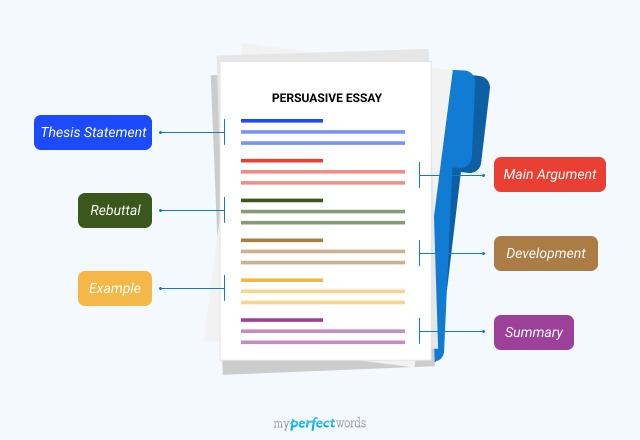
People also read
A Comprehensive Guide to Writing an Effective Persuasive Essay
200+ Persuasive Essay Topics to Help You Out
Learn How to Create a Persuasive Essay Outline
Read Excellent Examples of Persuasive Essay About Gun Control
How to Write a Persuasive Essay About Covid19 | Examples & Tips
Crafting a Convincing Persuasive Essay About Abortion
Learn to Write Persuasive Essay About Business With Examples and Tips
Check Out 12 Persuasive Essay About Online Education Examples
Persuasive Essay About Smoking - Making a Powerful Argument with Examples
Are you looking to improve your persuasive writing skills?
One of the best ways to do that is by reading persuasive essay examples. These examples can show you how to structure your arguments effectively.
But finding good examples can be a challenge. Don't worry, though – we've gathered some helpful persuasive essays for you right here!
So, if you're in search of persuasive essay examples to help you write your own, you're in the right place.
Keep reading this blog to explore various examples!
- 1. Persuasive Essay Examples For Students
- 2. Persuasive Writing Example For Elementary Schools
- 3. Persuasive Essay Examples Middle School
- 4. Persuasive Essay Examples High School
- 5. Persuasive Essay Examples for College Students
- 6. Persuasive Essay Examples For University
- 7. Persuasive Essay Examples for Different Formats
- 8. Basic Persuasive Essay Structure
- 9. Catchy Persuasive Essay Topics
Persuasive Essay Examples For Students
A persuasive essay aims to convince the reader of the author’s point of view.
To find the right path for your essay, it's helpful to go through some examples. Similarly, good essay examples also help to avoid any potential pitfalls and offer clear information to the readers to adopt.
Let’s take a look at 2 short persuasive essay examples, focusing on current and relevant issues:
Example 1:
Why Napping Should Be Encouraged in Schools? Ever feel like your brain is fried after lunch? You're not alone! Many students experience an afternoon slump, making it hard to focus and learn. But what if there was a simple solution: naps? Napping isn't just for babies. Studies show that short naps can boost alertness, improve memory, and enhance creativity. Imagine feeling refreshed and ready to tackle those afternoon math problems or history readings. Schools should encourage napping by providing designated quiet spaces and flexible schedules. Some might argue that naps cut into valuable learning time. However, research suggests that napping can actually lead to better overall learning. A well-rested student is more likely to pay attention, absorb information, and participate actively in class. It's a win-win situation! Schools around the world are already experimenting with nap programs, and the results are promising. Students report feeling more energized and focused, and their academic performance is improving. Wouldn't it be great if your school joined this trend? Let's ditch the afternoon slump and embrace the power of napping. It's a simple change that can have a big impact on student learning and well-being. |
Have you ever noticed how children seem to learn best when they're having fun? Imagine classrooms transformed from rows of desks and textbooks into vibrant spaces filled with laughter and exploration [Sensory Details]. This engaging environment can be achieved by incorporating more play-based learning into the curriculum. Play is not just a frivolous activity; it's a powerful tool that should be used throughout a student's academic journey [Direct Approach]. This essay argues that play-based learning fosters creativity, problem-solving skills, and a lifelong love of learning .
Beyond simple entertainment, play offers a dynamic learning experience. Through games, simulations, and hands-on activities, students actively engage with concepts [Logical Reasoning]. They experiment with different approaches, analyze situations, and learn from their mistakes. This active learning environment sparks curiosity, a natural human desire to explore further, and ultimately leads to a deeper understanding of the subject matter . Play also cultivates critical thinking and problem-solving skills, essential for success not only in academics but also in future careers and everyday life [Logical Reasoning]. Whether it's building a block tower or collaborating on a play, children develop crucial skills like analyzing situations, making decisions, and working together to overcome challenges . Some might argue that play is a distraction from serious learning. However, research shows the opposite is true – play-based learning actually increases student engagement and academic achievement . Students who learn through play are more motivated, retain information better, and develop a love of learning that extends beyond the classroom walls .
In conclusion, incorporating play-based learning into education offers a wealth of benefits for students. It ignites curiosity, fosters critical thinking skills, and promotes a lifelong love of learning [Reiteration]. Let's encourage our schools to embrace play as a powerful tool and create classrooms filled with laughter, exploration, and a deeper understanding for every student . |
If you are looking for longer examples, below are some persuasive essay examples pdf for different academic levels. Read them for free.
Persuasive Writing Example For Elementary Schools
Here are provided some sample essays to further explain the concept of persuasive writing for students.
3rd-grade Persuasive Essay Example
4th-grade Persuasive Essay Example
Persuasive Essay Example 5th-grade
Persuasive Essay Examples Middle School
Check out these persuasive essay examples for middle school to get a comprehensive idea of the format structure.
Persuasive Essay Examples for 6th Grade
7th-grade Persuasive Essay Example
8th-grade Persuasive Essay Example
Persuasive Essay Examples High School
The following are good persuasive essay examples for high school. Having a look at them will help you understand better.
Persuasive Essay Examples Grade 10
High-school Persuasive Essay Example
Examples of Persuasive Essay in Everyday Life
Persuasive Essay Examples for College Students
Essay writing at the college level becomes more complicated. We have provided you with top-notch college persuasive and argumentative essay examples here. Read them to understand the essay writing process easily.
11th-grade Persuasive Essay Example
Persuasive Essay Examples College
Higher English Persuasive Essay Example
Persuasive Essay About Smoking
Argumentative and Persuasive Examples
Persuasive Essay Examples For University
It becomes even more challenging to draft a perfect essay at the university level. Look at the examples of persuasive essays below to get an idea of writing one.
University Persuasive Essay Example
Political Persuasive Essay Examples
Persuasive Essay Examples About Life
Persuasive Essay Examples for Different Formats
A persuasive essay can be written in several formats. For instance, you can write the usual 5-paragraph essay, or even something longer or shorter.
Below are a few sample essays in various common formats.
Persuasive Essay Examples 5 Paragraph
Persuasive Essay Examples 3 Paragraph
These examples tell you how to remain convincing and persuasive regardless of the essay format you use.

Paper Due? Why Suffer? That's our Job
Basic Persuasive Essay Structure
Here's a breakdown of the typical persuasive essay outline , along with an example for each step:
- Introduction (Grab Attention & Introduce the Issue):
Hook your reader with an interesting fact, anecdote, or question-related to the topic. Briefly introduce the issue you'll be arguing for.
For Example:
Have you ever dreamt of classrooms filled with laughter and curiosity, not just the pressure of tests? Imagine a world where students learn not just facts, but how to think critically and solve real-world problems. This can be achieved by implementing project-based learning in all schools. |
- Thesis Statement (Clearly State Your Position):
The thesis statement is a one-sentence summary of your entire argument. It should be clear, concise, and specific, and include your main points.
Project-based learning, where students tackle real-world challenges through collaborative projects, is a superior educational method that fosters deeper learning, critical thinking, and problem-solving skills compared to traditional lecture-based teaching. |
- Body Paragraphs (Develop Your Arguments):
Dedicate each paragraph to a single main point supporting your thesis. Use strong evidence to back up your claims. This can include statistics, research findings, expert opinions, or personal anecdotes. Use clear transitions between paragraphs to show the flow of your argument.
Project-based learning goes beyond rote memorization. Students venture into real-world problems, like designing a sustainable water system or creating a campaign to raise awareness about climate change. This active engagement sparks curiosity and a drive to find solutions, leading to a deeper understanding of the concepts involved.
Furthermore, project-based learning fosters critical thinking and problem-solving skills. Students have to analyze situations, research information, collaborate with peers, and come up with creative solutions to complex challenges. This collaborative approach mirrors real-world scenarios, preparing students for future success in their careers. |
- Counterargument (Acknowledge Opposing Views):
Briefly acknowledge potential objections to your argument. This shows you've considered different viewpoints and strengthens your own position.
Some may argue that project-based learning can be time-consuming or require additional resources. However, the long-term benefits outweigh the initial investment. |
- Rebuttal (Address Counterarguments):
Explain why the counterarguments are not strong enough to invalidate your main points. Offer additional evidence to solidify your position.
While project-based learning might require initial planning and adjustments, the research shows a significant increase in student engagement and academic achievement. This can lead to improved classroom management and reduced need for reteaching, ultimately saving teachers time in the long run. |
- Conclusion (Restate & Call to Action):
Briefly restate your thesis and summarize your main points. End with a strong call to action, urging the reader to adopt your perspective or take a specific step.
In conclusion, project-based learning offers a dynamic and engaging approach to education. It cultivates critical thinking, problem-solving skills, and a deeper understanding of the subjects. Let's urge our schools to embrace this innovative teaching method and prepare our students for a brighter future. |
By following this structure and incorporating strong evidence, you can craft a persuasive essay that effectively convinces your reader to see things your way.
Catchy Persuasive Essay Topics
Now that you have read some good examples, it's time to write your own persuasive essay.
But what should you write about? You can write persuasive essays about any topic, from business and online education to controversial topics like abortion, gun control, and more.
Here is a list of ten persuasive essay topics that you can use to grab your reader's attention and make them think:
- Should the government increase taxes to fund public health initiatives?
- Is the current education system effective in preparing students for college and the workplace?
- Should there be tighter gun control laws?
- Should schools have uniforms or a dress code?
- Are standardized tests an accurate measure of student performance?
- Should students be required to take physical education courses?
- Is undocumented immigration a legitimate cause for concern in the United States?
- Is affirmative action still necessary in today’s society?
- How much, if any, regulation should there be on technology companies?
- Is the death penalty an appropriate form of punishment for serious crimes?
Need more topic ideas? Check out our extensive list of unique persuasive essay topics and get started!
To Sum it Up!
This post gave you a bunch of persuasive essay examples to check out. By reading them, you learned how to build strong arguments, organize your essay, and use evidence to back up your ideas.
Now it's your time to write! Don't worry about being perfect, just give it a shot and make it your own. But if you're still feeling stuck, don't worry.
Our persuasive essay writing service is here to the rescue!
Our experienced writers specialize in creating top-notch essays on a wide range of topics. Whether it's a challenging persuasive essay or any other type, we've got you covered.
Take advantage of our paper writing service today!

Write Essay Within 60 Seconds!

Caleb S. has been providing writing services for over five years and has a Masters degree from Oxford University. He is an expert in his craft and takes great pride in helping students achieve their academic goals. Caleb is a dedicated professional who always puts his clients first.

Paper Due? Why Suffer? That’s our Job!
Keep reading

Purdue Online Writing Lab Purdue OWL® College of Liberal Arts
Welcome to the Purdue Online Writing Lab

Welcome to the Purdue OWL
This page is brought to you by the OWL at Purdue University. When printing this page, you must include the entire legal notice.
Copyright ©1995-2018 by The Writing Lab & The OWL at Purdue and Purdue University. All rights reserved. This material may not be published, reproduced, broadcast, rewritten, or redistributed without permission. Use of this site constitutes acceptance of our terms and conditions of fair use.
The Online Writing Lab (the Purdue OWL) at Purdue University houses writing resources and instructional material, and we provide these as a free service at Purdue. Students, members of the community, and users worldwide will find information to assist with many writing projects. Teachers and trainers may use this material for in-class and out-of-class instruction.
The On-Campus and Online versions of Purdue OWL assist clients in their development as writers—no matter what their skill level—with on-campus consultations, online participation, and community engagement. The Purdue OWL serves the Purdue West Lafayette and Indianapolis campuses and coordinates with local literacy initiatives. The Purdue OWL offers global support through online reference materials and services.
Social Media
Facebook twitter.
Home — Essay Samples — Education — Why Is College Important — The Importance of College After High School: A Persuasive Paper
The Importance of College after High School: a Persuasive Paper
- Categories: College Education Why Is College Important
About this sample

Words: 598 |
Published: Jun 6, 2024
Words: 598 | Page: 1 | 3 min read
Table of contents
Introduction, body paragraph 1, body paragraph 2, body paragraph 3.

Cite this Essay
Let us write you an essay from scratch
- 450+ experts on 30 subjects ready to help
- Custom essay delivered in as few as 3 hours
Get high-quality help

Verified writer
- Expert in: Education

+ 120 experts online
By clicking “Check Writers’ Offers”, you agree to our terms of service and privacy policy . We’ll occasionally send you promo and account related email
No need to pay just yet!
Related Essays
3 pages / 1214 words
2 pages / 811 words
2 pages / 989 words
1 pages / 609 words
Remember! This is just a sample.
You can get your custom paper by one of our expert writers.
121 writers online
Still can’t find what you need?
Browse our vast selection of original essay samples, each expertly formatted and styled
Related Essays on Why Is College Important
Rose, Mike. 'Why School? A Student in a Community College Basic Skills Program.' Why School?: Reclaiming Education for All of Us, The New Press, 2009.
Debates surrounding the value and relevance of higher education have intensified in recent years, prompting a reconsideration of the assertion that college is a waste of time and money. As the cost of tuition rises and [...]
For generations, the pursuit of higher education has been regarded as an almost unassailable pathway to success. However, in the 21st century, the landscape of success and career achievement is undergoing a transformation. This [...]
The Path to Self-Actualization Discuss how a college education is a journey toward self-actualization and personal growth. How does it empower individuals to shape their own destinies and realize their full [...]
To answer the question “is college worth it?”, essay should provide persuasive arguments. In today’s world it is primarily essential for a high school student to continue their education to college. However, earning a Bachelor’s [...]
“Education is the most powerful weapon which you can use to change the world.” These words of Nelson Mandela set the idea that with an education you can alter society for the better. Education is usually thought of as a tool to [...]
Related Topics
By clicking “Send”, you agree to our Terms of service and Privacy statement . We will occasionally send you account related emails.
Where do you want us to send this sample?
By clicking “Continue”, you agree to our terms of service and privacy policy.
Be careful. This essay is not unique
This essay was donated by a student and is likely to have been used and submitted before
Download this Sample
Free samples may contain mistakes and not unique parts
Sorry, we could not paraphrase this essay. Our professional writers can rewrite it and get you a unique paper.
Please check your inbox.
We can write you a custom essay that will follow your exact instructions and meet the deadlines. Let's fix your grades together!
Get Your Personalized Essay in 3 Hours or Less!
We use cookies to personalyze your web-site experience. By continuing we’ll assume you board with our cookie policy .
- Instructions Followed To The Letter
- Deadlines Met At Every Stage
- Unique And Plagiarism Free
- Grades 6-12
- School Leaders
NEW: Classroom Clean-Up/Set-Up Email Course! 🧽
137 Intriguing Cause & Effect Essay Topics for Students
Teach critical thinking, logic, and the art of persuasion.
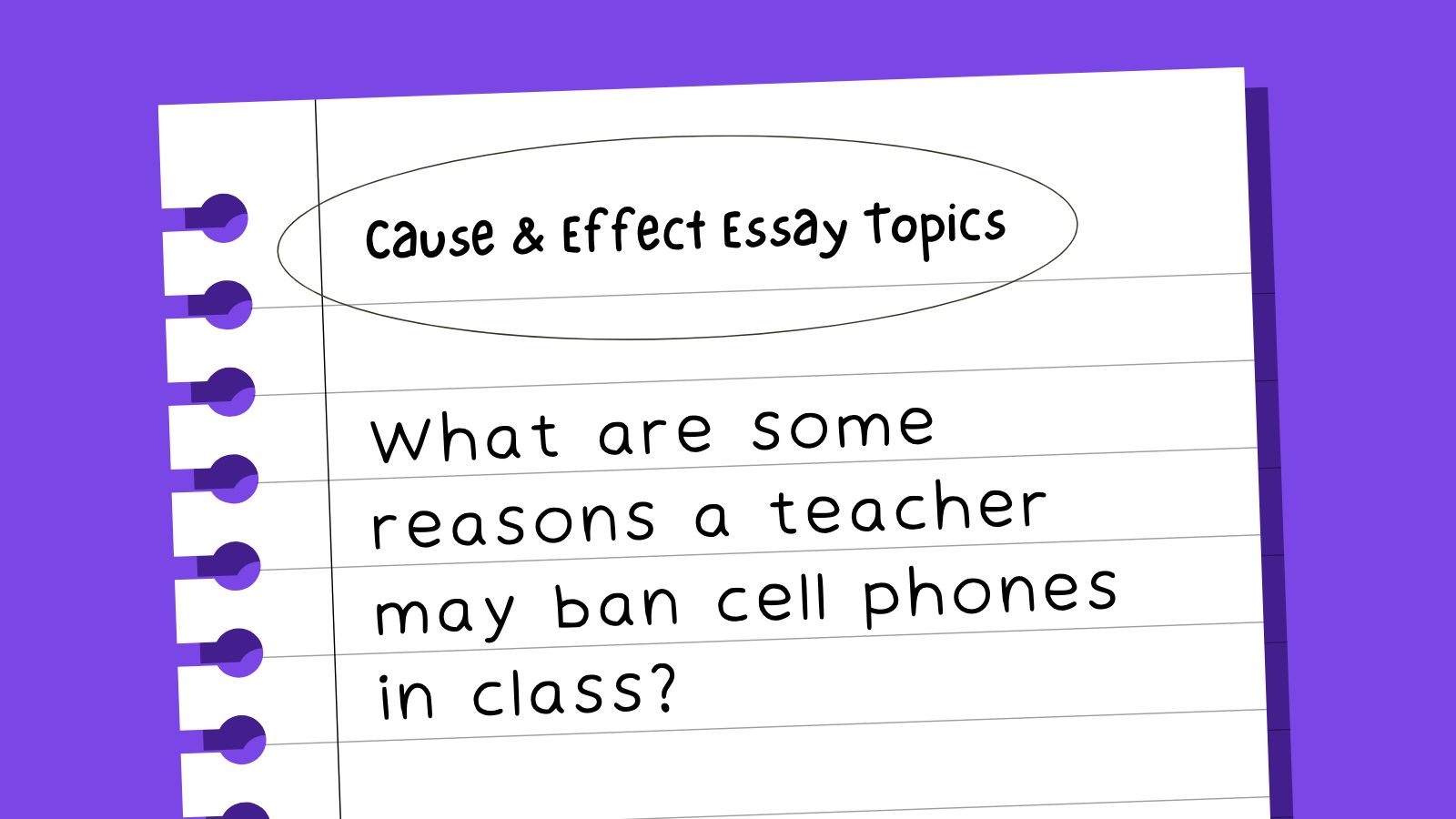
Cause-and-effect essays aren’t just a way to help students strengthen their writing skills. They’ll also learn critical thinking, logic, and the art of persuasion. In addition, they teach students to demonstrate how one thing directly influences another. Coming up with engaging cause-and-effect essay topics can be challenging, but we have you covered. This list of ideas includes a variety of topics that range from social and cultural movements to mental health and the environment.
Science and Environment Cause & Effect Essay Topics
- Describe the effect of urbanization on the environment.
- What is the impact of air pollution on health?
- What are the causes and consequences of plastics on marine life?
- What is the impact of rising sea temperatures on fish and marine life?
- Describe the impact of human behavior on global warming.

- What is the effect of social media on environmentalism?
- What causes volcanic eruptions?
- What causes trees to die?
- What are the effects of gravity?
- Why are plants green?
- Why do trees shed their leaves?
- What causes a species to become endangered?
- What are some of the causes of animals losing their habitats?
- Describe the effect of overpopulation on the environment.
- What are the effects of famine on human population?
- What are the causes and effects of Antarctica floods?
- What are the effects of pollution on the ocean?
- What effect do cars have on the environment?
- Why is it important to manage wildfires?
- What has been the impact of DNA on crime scene processing?
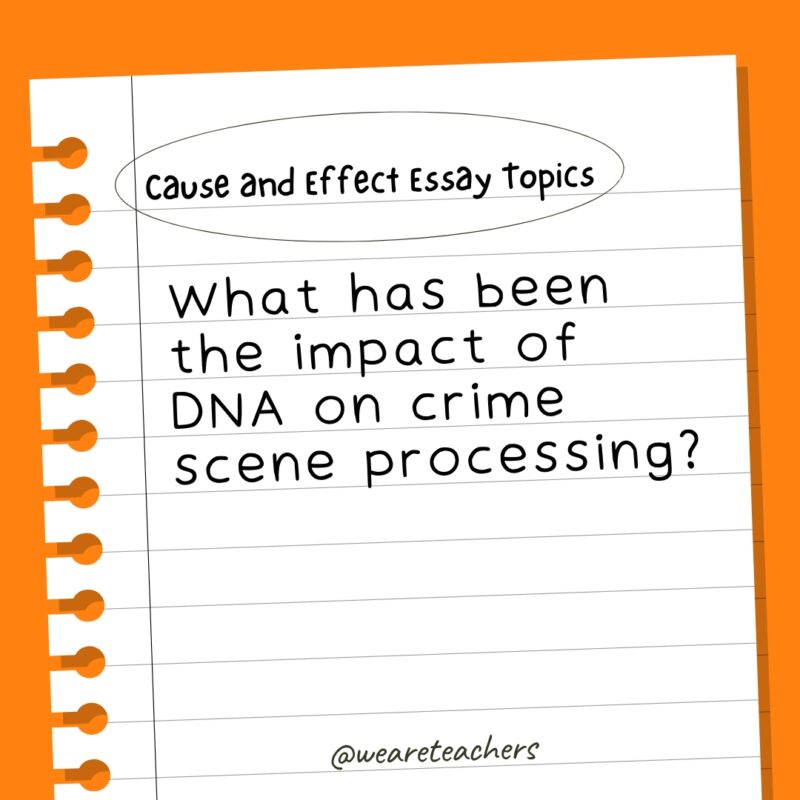
- What are the impacts of deforestation in Brazil?
- What are the effects of GMO foods on human health?
- What are the impacts of immunizations on human health?
Technology and Social Media Cause & Effect Essay Topics
- What are the effects of social media on adolescent development?
- How does technology affect productivity?
- What are the effects of video games on childhood development?
- How do cell phones affect human relationships?
- What are some reasons a teacher might ban cell phones from class?
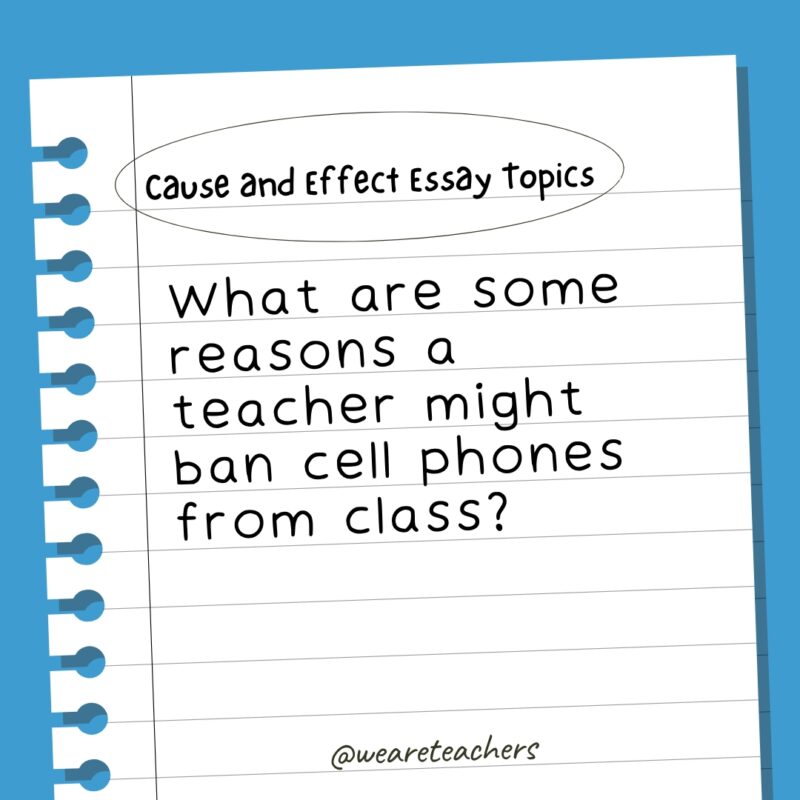
- What effects do cell phones have on sleep?
- What effects did the invention of the Internet have on technology?
- What were the origins of cyberbullying?
- What are the effects of tablet use on small children?
- How has online dating changed relationships?
- What makes some people less likely to use social media?
- What are the effects of social media on privacy?
- How does the rise of TikTok affect Facebook and Instagram?
- In what ways could social media lead to extremism?
- What is the impact of social media on the increasing popularity of plastic surgery and other enhancements?
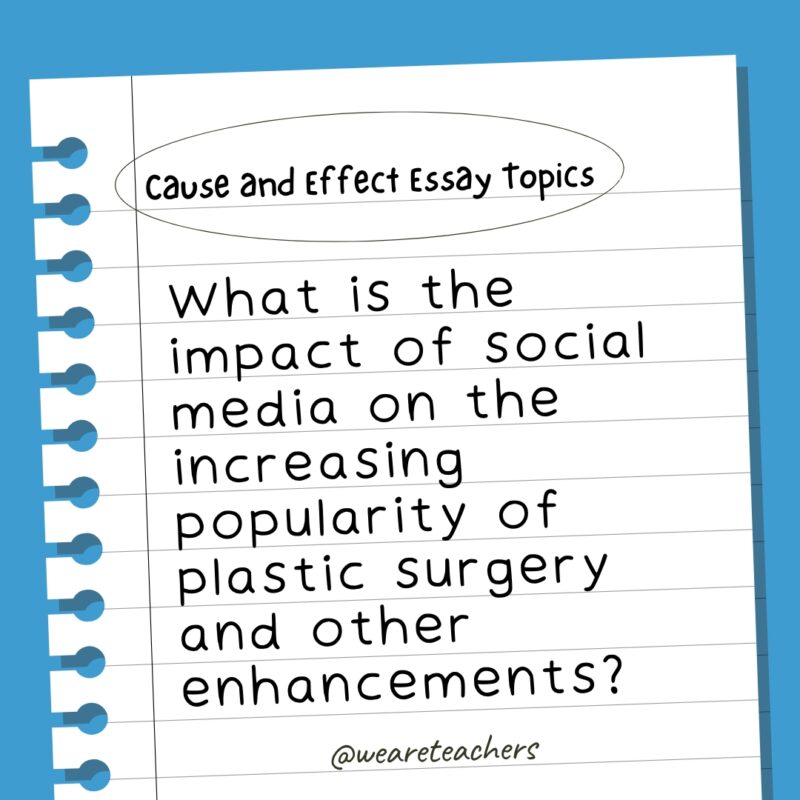
- What are some of the benefits of owning a smartphone and what are some of the drawbacks?
- What has been the impact of online shopping on brick-and-mortar stores?
- What has been the impact of smartphones on marriages and relationships?
- What are the causes and effects of texting while driving?
- What has the rise of “influencers” meant for Hollywood?
- In what ways have photo filters influenced young people’s self-esteem?
Culture and Social Issues Cause & Effect Essay Topics
- What are some of the reasons for substance abuse in young people?
- What are some of the effects of bullying?
- How does economic status affect the quality of health care?
- What are some of the causes of homelessness?
- Explain the effects of ignorance on discrimination.
- What are the impacts of death sentences on social justice?
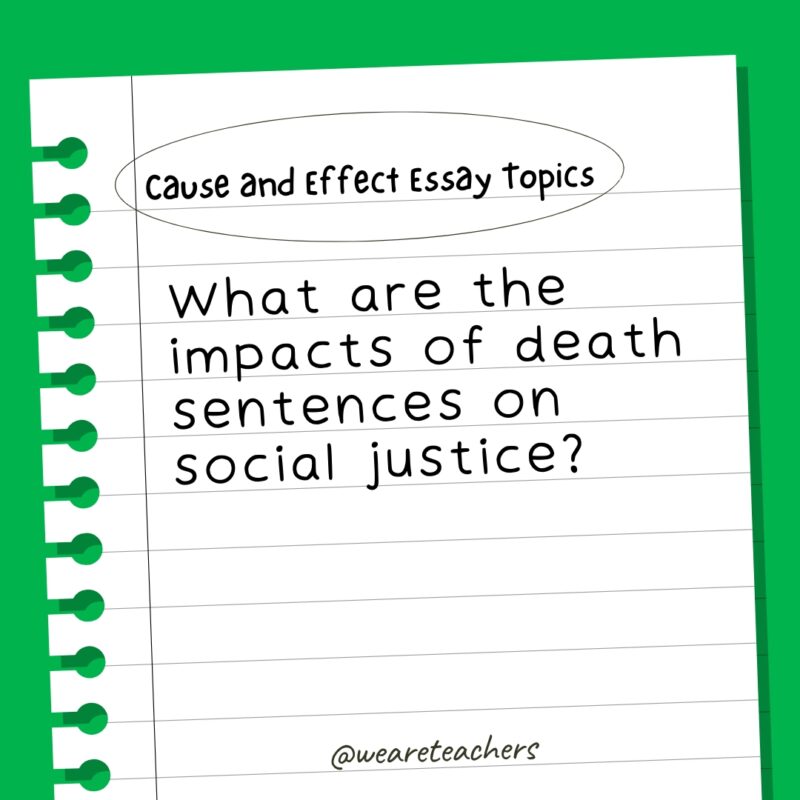
- How does financial success affect societal privilege?
- What effects does growing up poor have on children?
- In what ways does religion influence society?
- What are the effects of immigration on a host country?
- What are the effects of ageism on job opportunities?
- What is the impact of LGBTQ+ representation in TV and movies?
- What are the effects of school shootings on politics?
- How do school uniforms affect students?
- What are the impacts of high student debt?
- What are the impacts of body shaming on people?
- What were the lasting impacts of the AIDS epidemic on society?
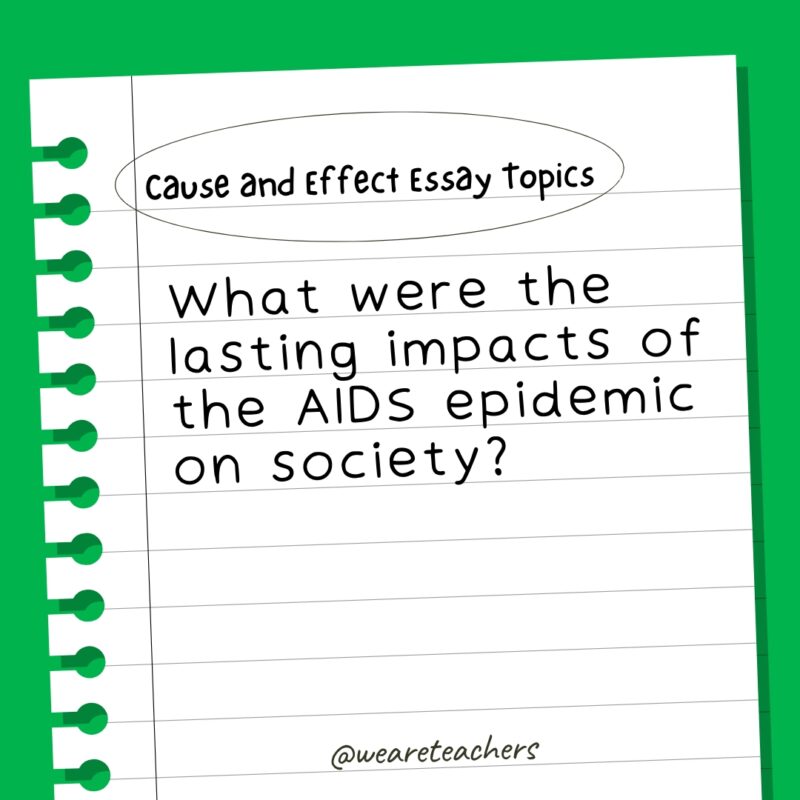
- What impact does banning abortion have in the United States?
- What has been the impact of marriage equality in the United States?
- What are the causes and effects of noise pollution?
- What are the causes and effects of inflation on the economy?
- What are the effects of TV shows on our behavior?
Sports Cause & Effect Essay Topics
- Examine the effects of exercise on mental health.
- What led to baseball being an iconic American sport?
- What drives people to participate in extreme sports?
- In what ways did globalization affect modern sports?
- What were the effects of doping on amateur and professional sports?
- Select a sport and write about the historical factors that led to the popularization of that sport.
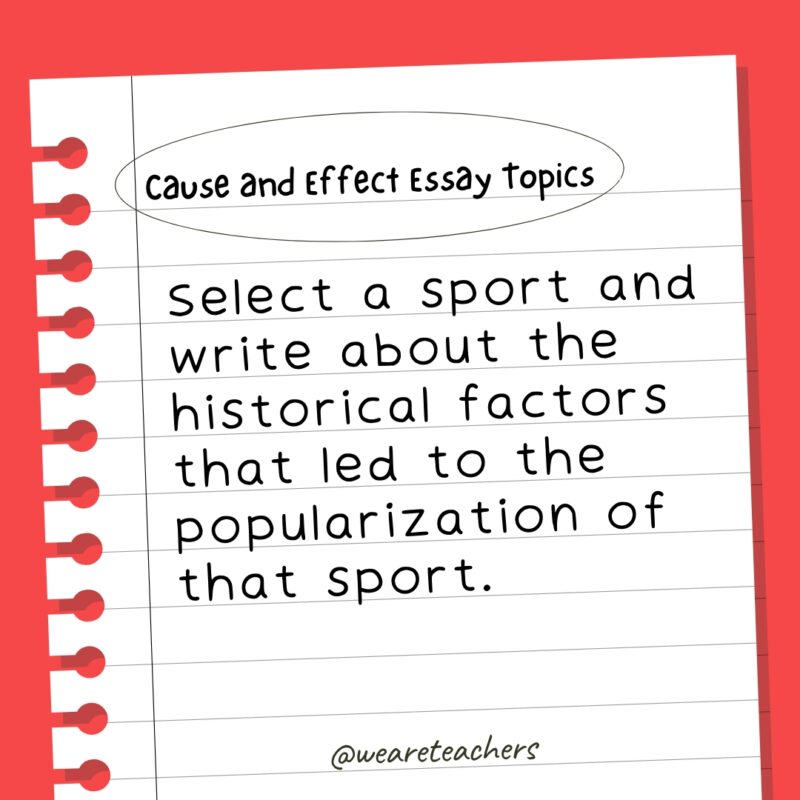
- Describe the ways in which youth sports influence a child’s development.
- What were the driving forces behind the first Olympics?
- How can team sports help develop social skills?
- How have e-sports changed the sporting landscape?
- In what ways do race biases influence sports?
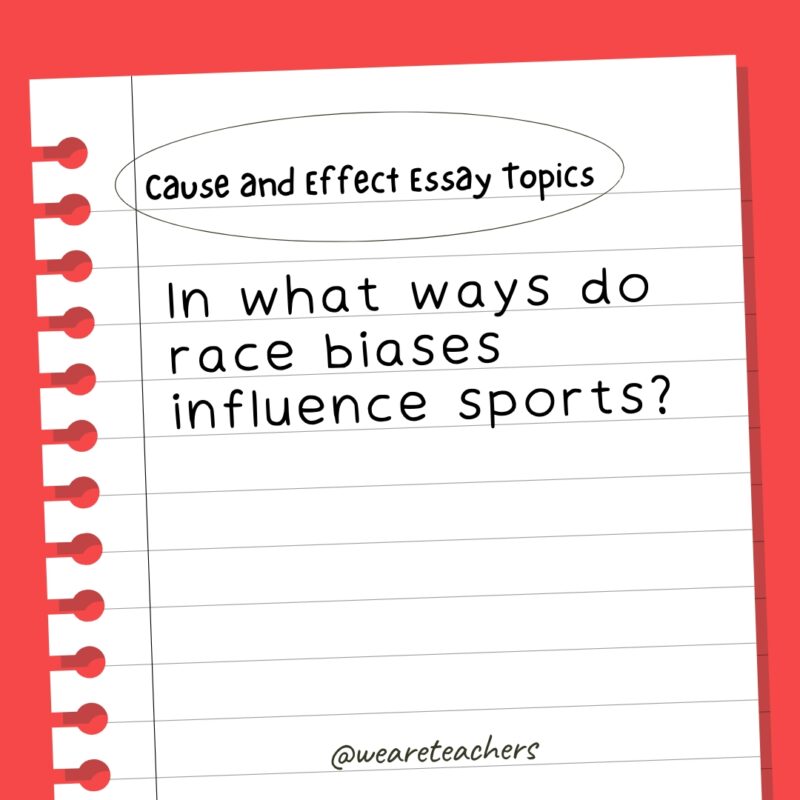
- What are the effects of regular workouts on immunity?
- How does participating in sports affect leadership skills?
- In what ways can sports lead to character development?
- What effect does famous athletes’ social commentary have on their fans?
History Cause & Effect Essay Topics
- What are the effects of the war in Syria on the United States?
- What have been the lasting effects of the Civil Rights Movement?
- What were the causes and effects of the attack on Pearl Harbor?
- What led up to the Berlin Wall being torn down and what effects did that have?
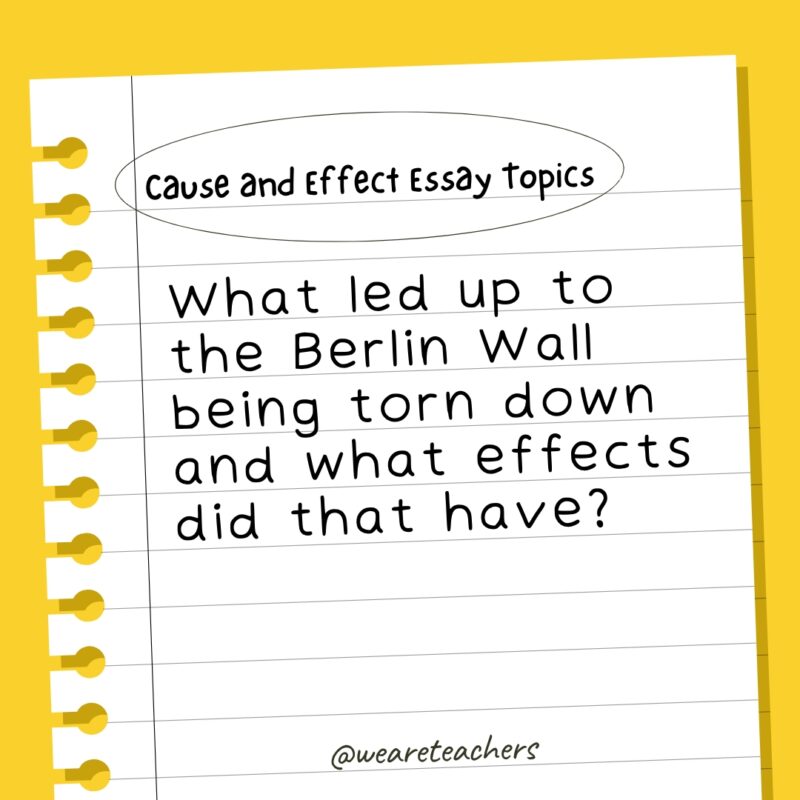
- What lasting impact did 9/11 have on modern American society?
- What were the causes of the Salem Witch Trials?
- What was the cultural impact of the Spanish-American War?
- How has globalization led to modern-day slavery?
- What events led to the fall of the Roman Empire?
- What were the impacts of the Great Depression on women’s employment?
- How did cartels come into existence? What effect have they had on the United States and Mexico?
- What were the causes and effects of the Women’s Liberation Movement?
- Give an example of colonialism in history and name the resulting impact to the affected society.
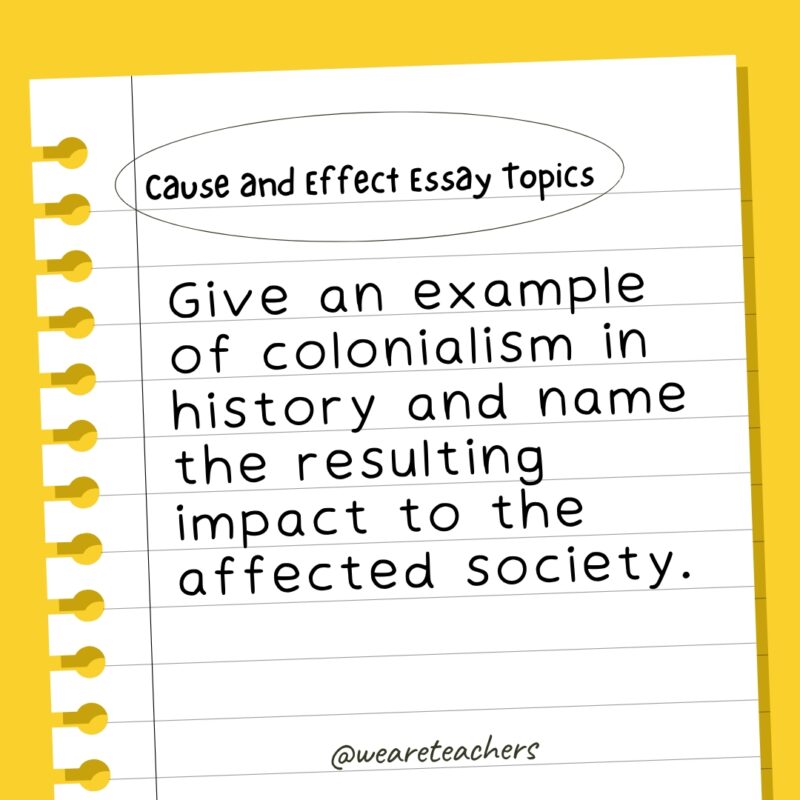
- What led to the rise of ISIS and what has the impact been on international security?
- What factors led to the Titanic’s sinking?
- What were the causes and effects of the Vietnam War?
- Choose an American president. What led him to become president and what were the effects of his presidency?
Mental Health Cause & Effect Essay Topics
- How can stress affect the immune system?
- How does social anxiety affect young people?
- How can high academic expectations lead to depression?
- What are the effects of divorce on young people?
- How does service in the armed forces lead to post-traumatic stress disorder?
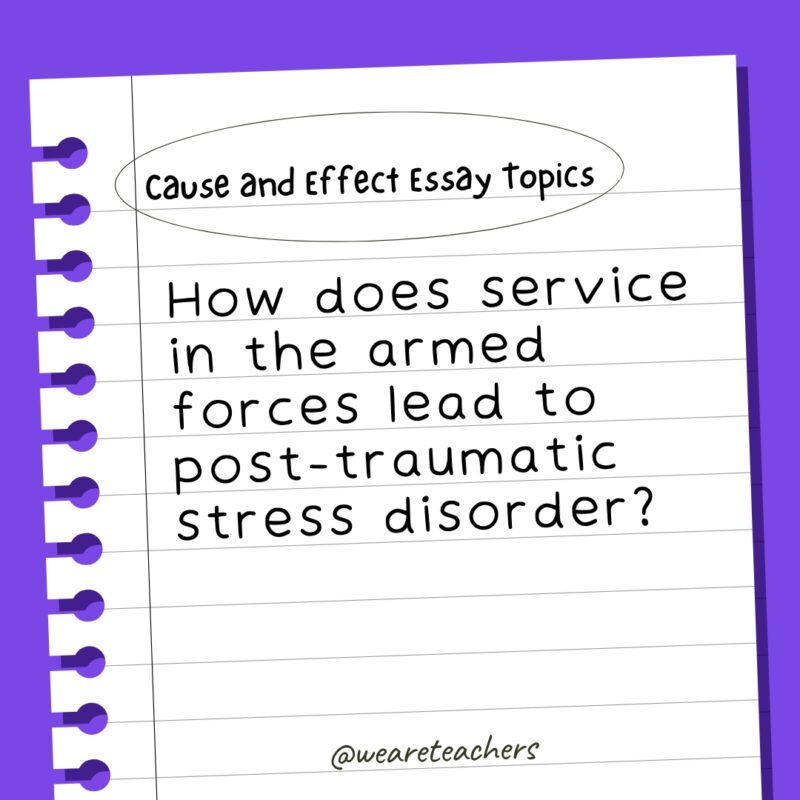
- What are the effects of mindfulness on mental health?
- Describe the ways in which the COVID-19 pandemic has impacted mental health.
- How does childhood trauma impact childhood development?
- What impact does witnessing violence have on mental health?
- What is behind increasingly high levels of anxiety in modern American society?
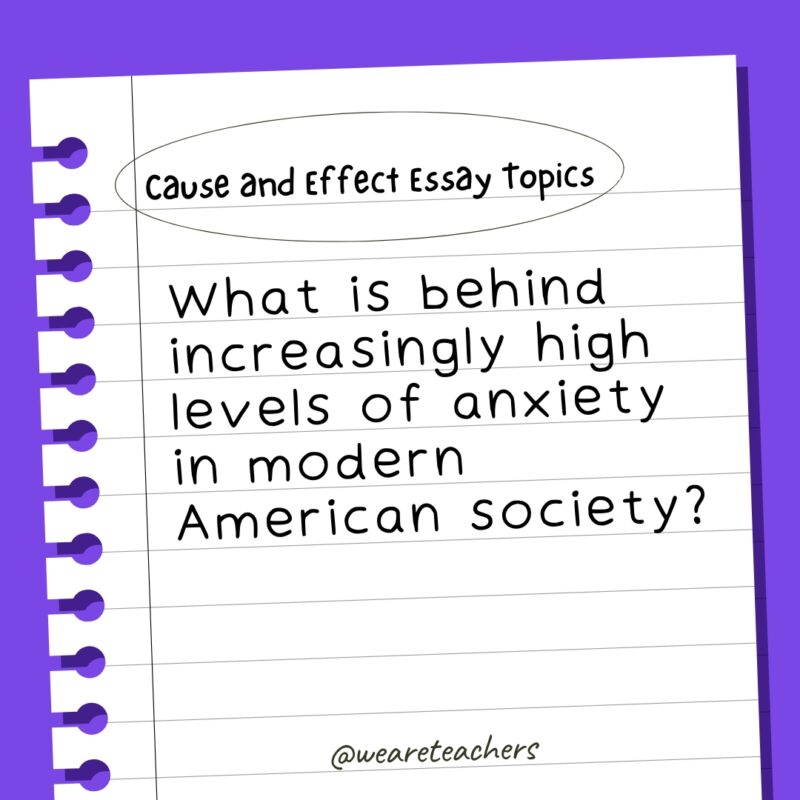
- What are the causes and effects of panic attacks?
- What are the causes and consequences of high stress in the workplace?
- What are some of the causes of insomnia and in what ways does it affect mental health?
- What is the impact of staying home for an extended period of time?
Current Events Cause & Effect Essay Topics
- Choose a local public education campaign. What are the effects of that campaign?
- What are the causes and effects of migration?
- What are the causes and effects of terrorist attacks?
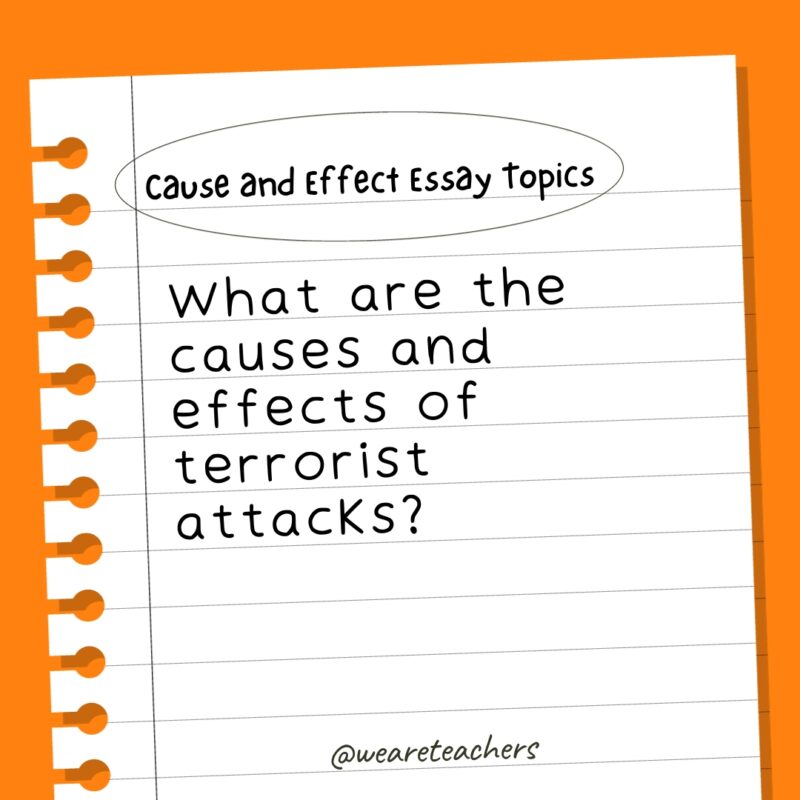
- What are the effects of legalizing genetic engineering research?
- How do low voting rates impact elections and government?
- What is the effect of raising the minimum wage?
- What are the effects of globalization on society?
- How does gerrymandering affect election outcomes?
- What are the causes and effects of police brutality?
- What are the causes and effects of political polarization?
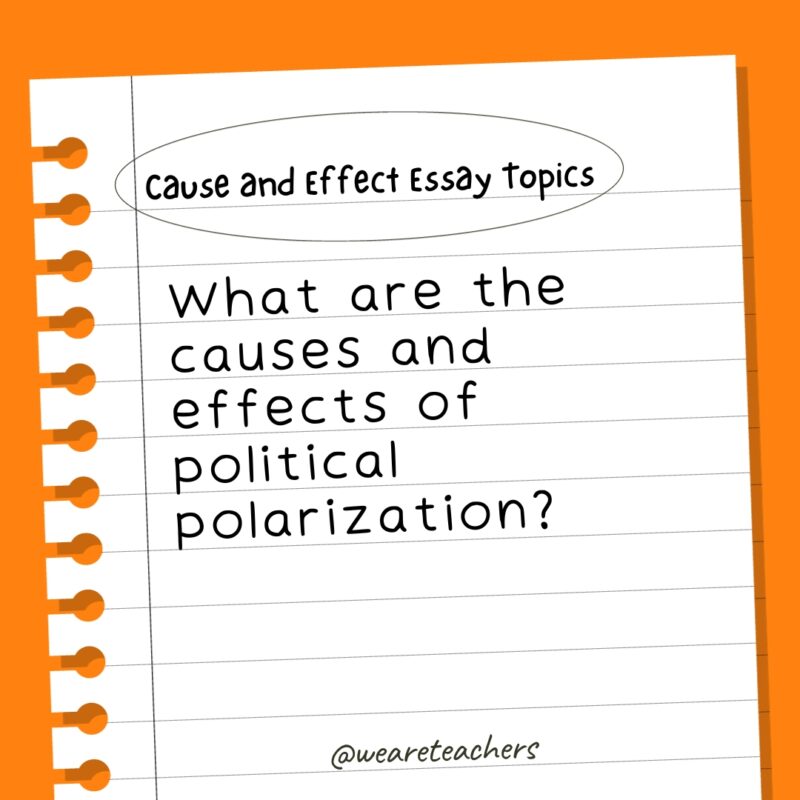
- What are the causes and effects of fake news?
- What are the effects of global war on citizens?
- What is the effect of international aid on poverty or health?
- Why do some countries have nuclear weapons, and what does this mean for other countries?
Education Cause & Effect Essay Topics
- What are the effects of teacher quality on student success?
- What are the causes and effects of student loan debt?
- What are the causes and effects of low graduation rates?
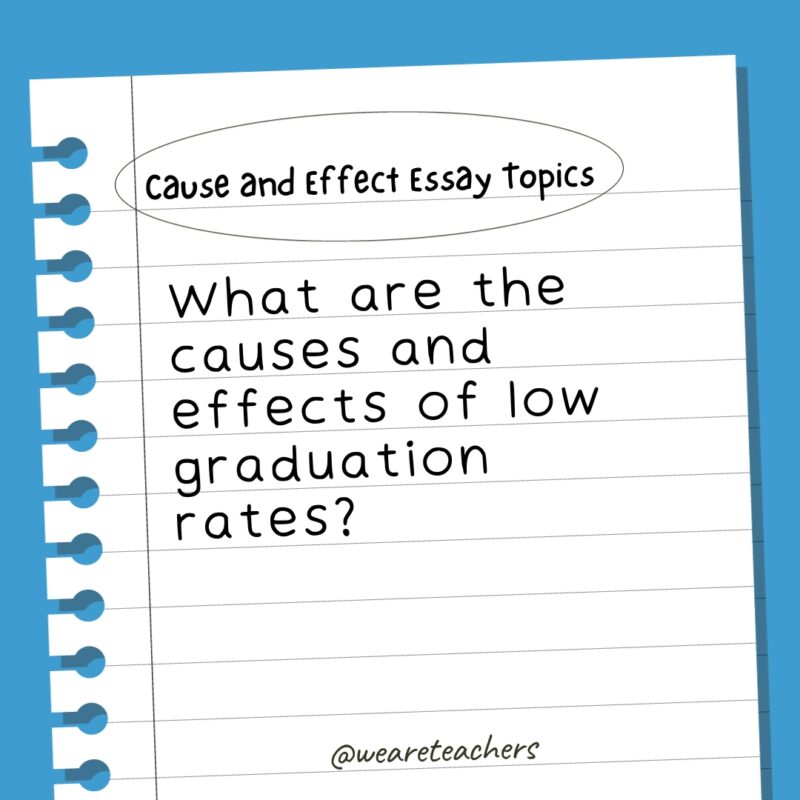
- What are the effects of assigning homework?
- What are the causes and effects of school funding disparities?
- What are the causes and effects of the digital divide in education?
- What is the effect of AI on education?
- What are the causes and effects of student burnout?
- Should students be required to study a foreign language in school, and what are the effects of learning a foreign language?

- What effect has the COVID pandemic had on education?
- What are the effects of same-sex classrooms or schools?
What are your best cause-and-effect essay topics for students? Come exchange ideas in the We Are Teachers HELPLINE group on Facebook.
Plus, check out our list of interesting persuasive essay topics for kids and teens..
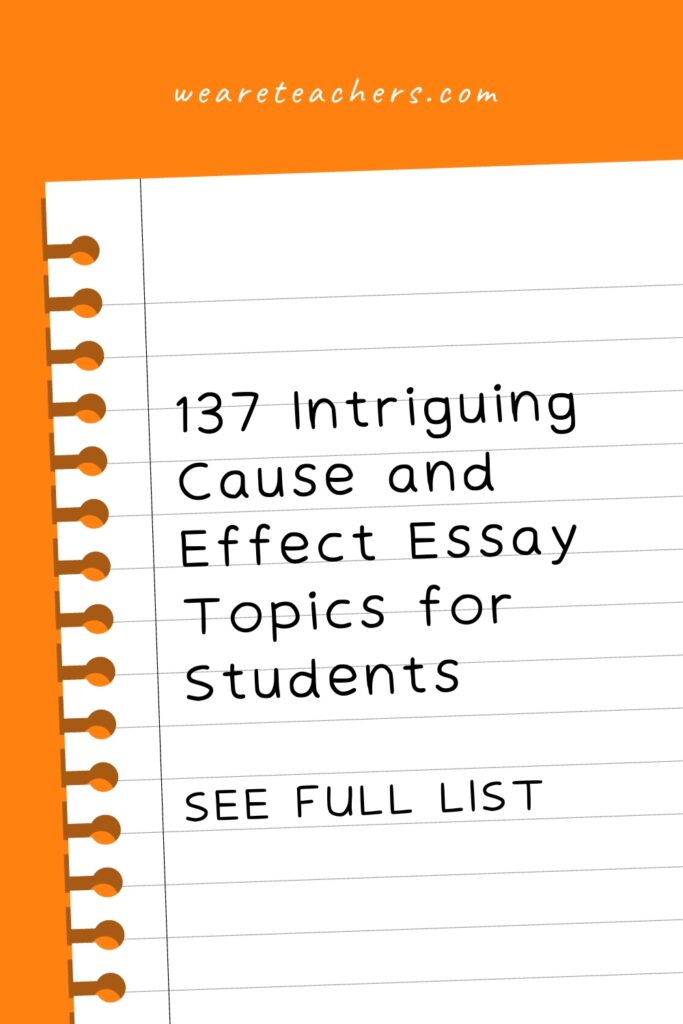
You Might Also Like

The Big List of Essay Topics for High School (120+ Ideas!)
Ideas to inspire every young writer! Continue Reading
Copyright © 2024. All rights reserved. 5335 Gate Parkway, Jacksonville, FL 32256

IMAGES
VIDEO
COMMENTS
The models for writing an argumentative essay are the classical model, the Rogerian model, and the Toulmin model. To make sure that you write a good argumentative essay, read the different types of examples mentioned in this blog. 1. Good Argumentative Essay Examples.
Argumentative Essay Example 2. Malaria is an infectious disease caused by parasites that are transmitted to people through female Anopheles mosquitoes. Each year, over half a billion people will become infected with malaria, with roughly 80% of them living in Sub-Saharan Africa.
Free Argumentative Essay Examples For Students . A good essay presents facts and data to support an argument, evaluates point of view, and proves its point. It's designed to convince the reader with facts and logic. Example#1: ... Argumentative Essay Examples For High School PDFs .
Best Argumentative Essay Samples for High School. ... These free argumentative essay examples serve as practical guides, illuminating the path to crafting effective essays. By examining these examples, you'll gain a deeper understanding of the art of persuasive writing, making the task of creating your argumentative essay a more manageable ...
Argumentative essay examples. Examples of argumentative essays vary depending upon the type: Academic essays differ based upon the topic and position. These essays follow a more traditional structure and are typically assigned in high school or college. Examples of academic argumentative essay topics include the following:
Make a claim. Provide the grounds (evidence) for the claim. Explain the warrant (how the grounds support the claim) Discuss possible rebuttals to the claim, identifying the limits of the argument and showing that you have considered alternative perspectives. The Toulmin model is a common approach in academic essays.
Free Argumentative Essay Examples. Students start writing 5-paragraph argumentative essays in middle school. It is the teachers' most fancied assignment in all humanities and even some scientific disciplines. We will write. a custom essay specifically for you by our professional experts. 809 writers online.
Here are some easy-to-follow and free examples for your help. When assigned to write an essay, be it any kind, it is helpful to go through a few examples. ... The following is an interesting argumentative essay example for high school students to understand and create a perfect argument to convince the readers.
An argumentative essay attempts to convince a reader to agree with a particular argument (the writer's thesis statement). The writer takes a firm stand one way or another on a topic and then uses hard evidence to support that stance. An argumentative essay seeks to prove to the reader that one argument —the writer's argument— is the ...
Argumentative essay formula & example. In the image below, you can see a recommended structure for argumentative essays. It starts with the topic sentence, which establishes the main idea of the essay. Next, this hypothesis is developed in the development stage. Then, the rebuttal, or the refutal of the main counter argument or arguments.
Introduction Example. Now let's move on to those argumentative essay examples, and examine in particular a couple of introductions. The first takes on a common argumentative essay topic —capital punishment. The death penalty has long been a divisive issue in the United States. 24 states allow the death penalty, while the other 26 have ...
Here are 35 more essay prompts for High Schoolers. And see these fabulous writing prompts for High School free resources. Until next time, keep on writing! If you enjoyed these Argumentative Topics and Essay Ideas for High School, please share them on Facebook, Twitter, and/or Pinterest. I appreciate it! Sincerely, Jill journalbuddies.com ...
101 Argument Essay Prompts for High School. Teaching argument writing can be very exciting, especially if you have great argument essay prompts for your students to choose from. It provides students with an opportunity to explore interesting topics. I give my students choices when I am teaching argument writing in my classroom.
A. As basketball star Charles Barkley stated in a famous advertising campaign for Nike, he was paid to dominate on the basketball court, not to raise your kids. Many celebrities do consider themselves responsible for setting a good example and create non-profit organizations through which they can benefit youths. B.
The following ideas work well for compare-contrast essays. ( Find 80+ compare-contrast essay topics for all ages here.) Public and private schools. Capitalism vs. communism. Monarchy or democracy. Dogs vs. cats as pets. WeAreTeachers. Paper books or e-books. Two political candidates in a current race.
This argumentative article for students is a great model of opinion writing. Have students follow the development of the author's argument through their annotations while reading. This not only supports students reading comprehension, but it will also prepare them for Assessment Question 3, "How does Paragraph 7 develop the idea that mobile ...
100 Thought-Provoking Argumentative Writing Prompts for Kids and Teens. Practice making well-reasoned arguments using research and facts. Writing a strong argumentative essay teaches students to make a case for their own point of view without relying on emotion or passion. These argumentative essay topics provide options for kids of all ages ...
Types of High School Essay. 1. Narrative Essay. Narrative essays tell a story from the writer's perspective, often highlighting a personal experience or event. The focus is on storytelling, including characters, a setting, and a plot, to engage readers emotionally.
It's high time we understand that and make high school a fun-tastic place for the students to learn, grow and find joy in every moment. Short Argumentative Essay Example for High school # 3: Topic: The Impact of Social Media on High School Students. Balancing Connectivity and Well-Being.
April 3, 2024. The skill of writing an excellent argumentative essay is a crucial one for every high school or college student to master. In sum, argumentative essays teach students how to organize their thoughts logically and present them in a convincing way. This skill is helpful not only for those pursuing degrees in law, international ...
Studying an Argumentative Essay The following essay argues for the use of school uniforms. Discuss the Preview Questions with the class. Then read the example essay and answer the questions that follow. Preview Questions 1. Did you wear a uniform when you went to school? 2. Some people believe that children are too materialistic these days.
Harvey Milk's "The Hope" Speech. Sample lines: "Some people are satisfied. And some people are not. You see there is a major difference—and it remains a vital difference—between a friend and a gay person, a friend in office and a gay person in office. Gay people have been slandered nationwide.
To find the right path for your essay, it's helpful to go through some examples. Similarly, good essay examples also help to avoid any potential pitfalls and offer clear information to the readers to adopt. Let's take a look at 2 short persuasive essay examples, focusing on current and relevant issues: Example 1:
The Online Writing Lab (the Purdue OWL) at Purdue University houses writing resources and instructional material, and we provide these as a free service at Purdue. Students, members of the community, and users worldwide will find information to assist with many writing projects.
Conclusion. In conclusion, the importance of college education after high school cannot be overstated. The benefits extend far beyond mere financial gains, encompassing personal growth, intellectual development, and societal advancement.
Give an example of colonialism in history and name the resulting impact to the affected society. ... check out our list of Interesting Persuasive Essay Topics for Kids and Teens. Share this article. Yes, I want teaching tips & resources! ... Recommended. The Big List of Essay Topics for High School (120+ Ideas!) Ideas to inspire every young ...
19 college essay topics. Each school sets different requirements around the college essay, so it's important to review the expectations around every application you intend to submit. ... Here's a sample of the 2022-2023 essay prompts : Some students have a background, identity, interest, or talent that is so meaningful they believe their ...